


A KHALIFA UNIVERSITY NEWSLETTER
Harnessing Unlimited Power: Beam-Down Solar Thermal System
Topping UAE in Stanford University’s List Of World’s Top 2% Most Influential Researchers
Region’s First-of-its-kind Marine Studies and Research Facility Opened in Collaboration with Stanford University
Discover the Wonders Of The Human Body at The Body Museum by Body Worlds


ISSUE
JANUARY 2024
15 |
About KU Times
KU Times is a newsletter published by the Khalifa University Marketing and Communications Department. It aims to keep our stakeholders informed and updated about Khalifa University’s latest breakthroughs, cutting-edge research, collaborations, initiatives, student activities and news.
If you would like to submit an idea for an article, nominate students or others to be interviewed, provide suggestions on topics you would like to read about, or simply want to leave a comment, please email us at communications@ku.ac.ae.
The Team
Sayed Al Hashmi, Director, Marketing & Communication
Momen Khaiti, Manager, Communication
Clarence Michael, English Editor Specialist
Alisha Roy, Science Writer
Jacob George, Production Officer (Marketing)
Nada Sami Assadi, Digital Marketing Senior Specialist
Kendh Muhannad Al Adem, Internal & External Digital Officer
04 09 17
Taking Center Stage at COP28 UAE Summit
KU Leadership Engage at Key COP28 UAE Sessions
ACS Student Chapter President Becomes COP28 Student Ambassador
23
Emirati Astronaut Dr. Sultan Al Neyadi and His Expedition 69 Colleagues Inspire at Khalifa University

Installing the Boeing Simulator for Enhanced Aerospace Engineering Education
33
CONTENTS 2 KU TIMES
Contents
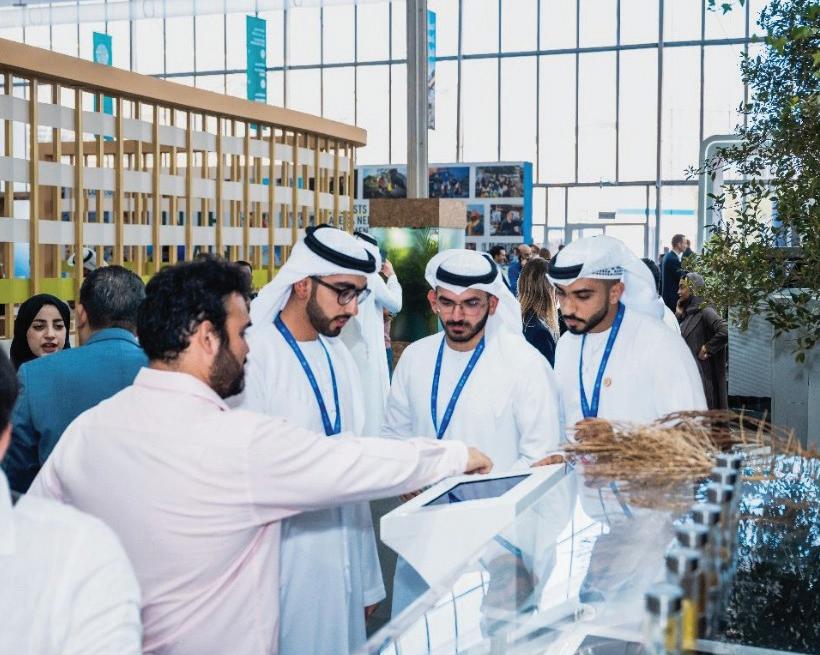

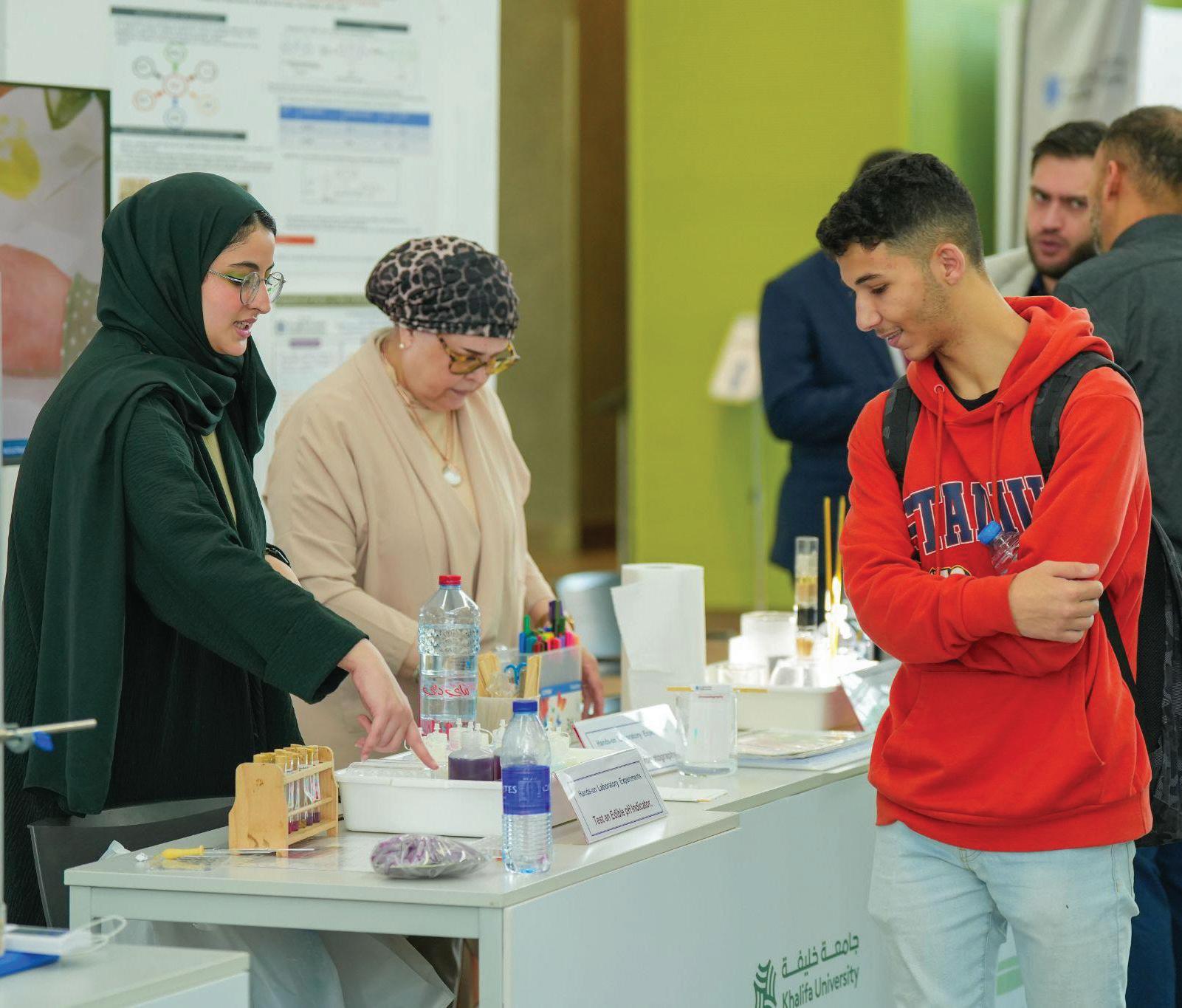
EBTIC Showcases Innovative Projects at Gitex 2023
Faculty Named Among 16 Stanford University Faculty Innovation Fellows Globally
Chemical Engineering Seniors Triumph in UAE’s ‘University Challenge’ with Sustainable Development Project
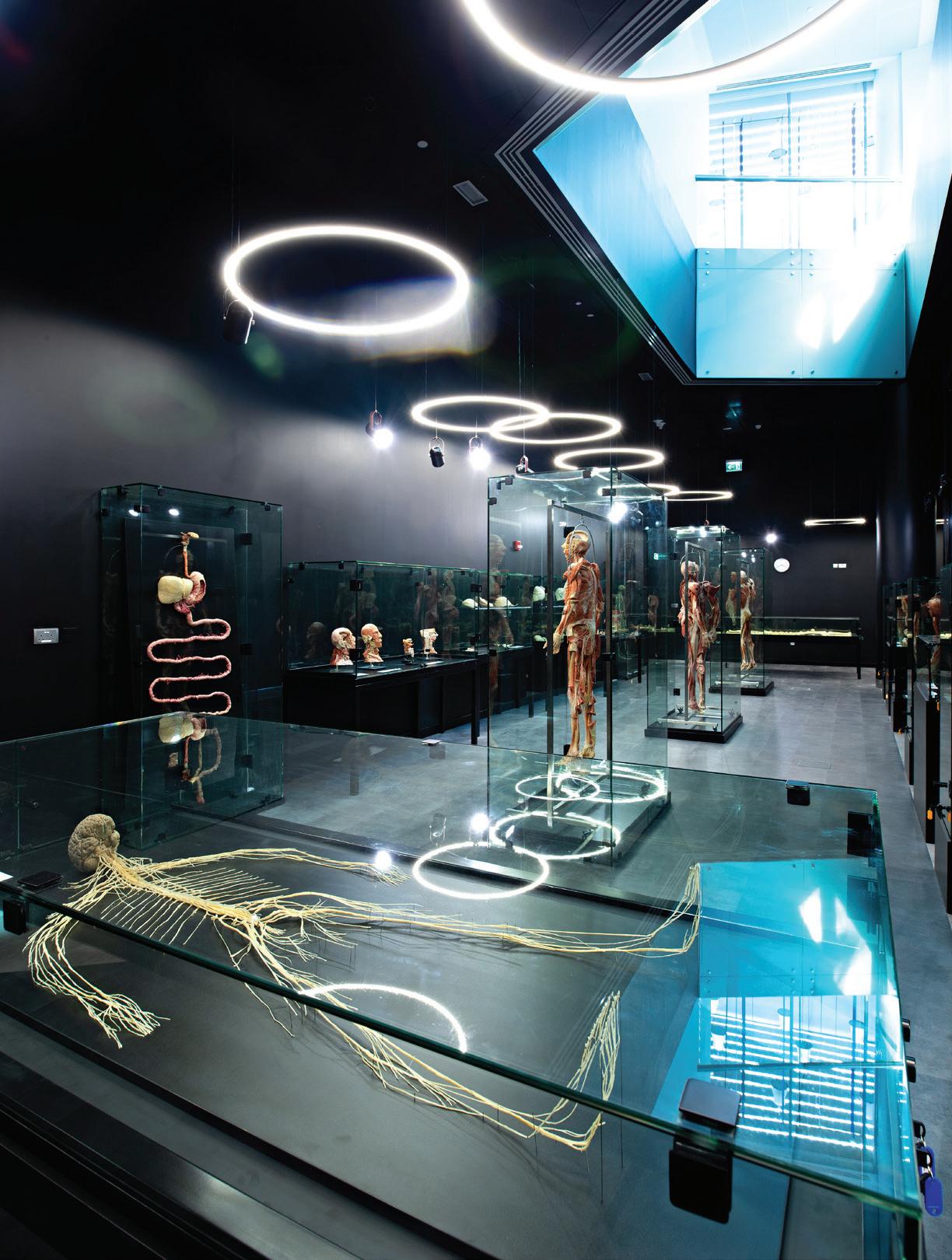
Coming Up: Intelligent Robots System (IROS) 2024
Region’s First-of-Its-Kind Marine Studies and Research Facility Opened in Collaboration with Stanford University 35 44 52 64 71
Discover The Wonders Of The Human Body at The Body Museum by Body Worlds
72
CONTENTS KU TIMES 3
FROM THE NEWSROOM
Highlights of the latest important announcements, strategic initiatives, new partnerships, and VIP visits
TAKING CENTER STAGE AT COP28 UAE SUMMIT FROM THE NEWSROOM
With around 170 world leaders and 84,000 registered people attending — a record for a climate conference gathering, the UAE organized one of the most crucial global events, the 28th session of the Conference of the Parties commonly known as COP28 UAE Summit to the UN Framework Convention on Climate Change (UNFCCC), in Dubai, which represented an opportunity for industry and world leaders to reaffirm their Paris Agreement goals.
Much before negotiations at COP28 concluded with a final agreement made on a global “transition away from fossil fuel” — included for the first time in a final agreement at a COP — Khalifa University had already launched 30 sustainability initiatives that aligned with UAE’s hosting of the summit, including an exhibition of 40 sustainable projects, validating its status as one of the few academic institutions in the UAE that remains proactive in engaging the community.
Projects Demonstrated and Displayed
Sustainability Initiatives Implemented
Sustainability-Related Patents Obtained
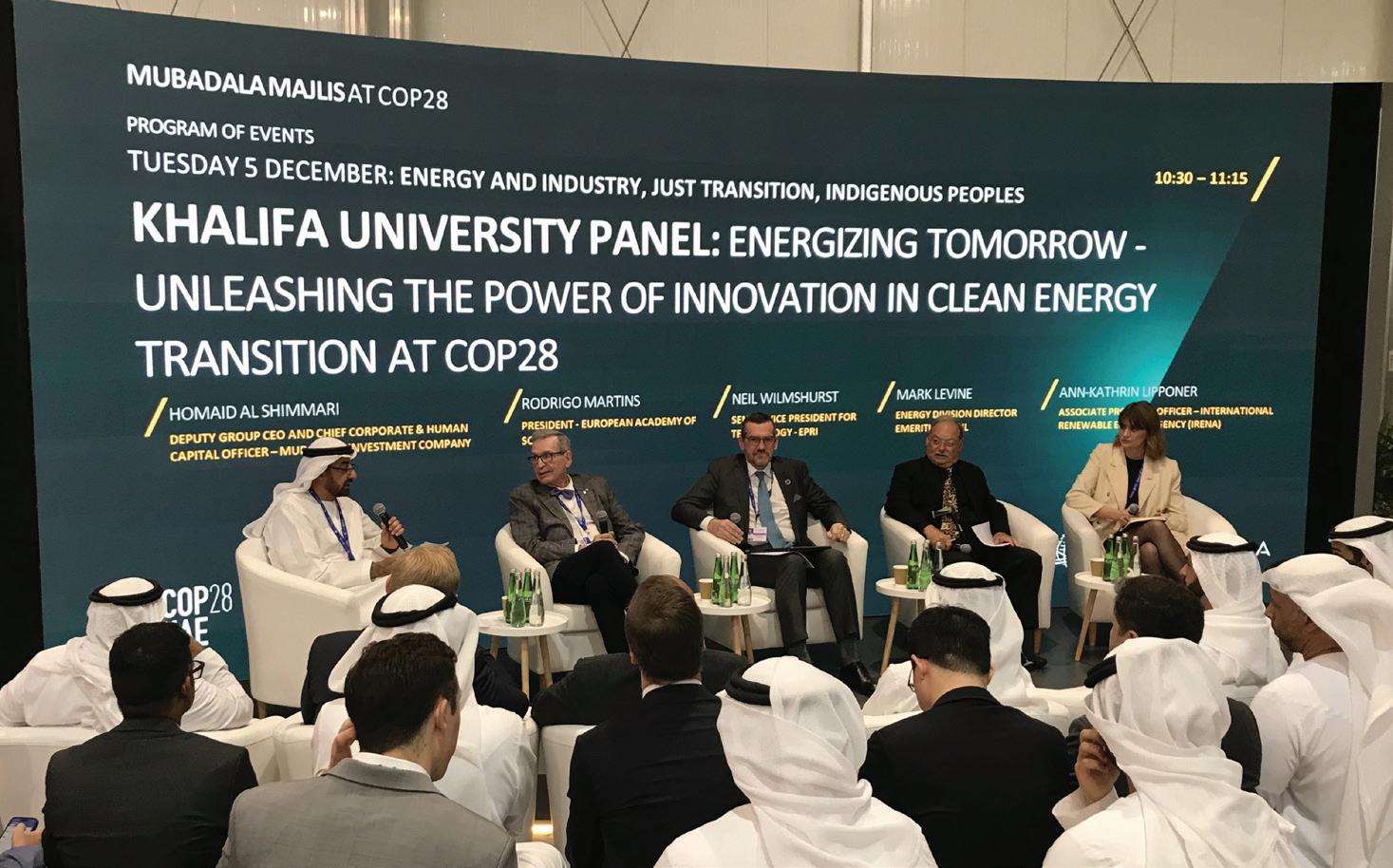
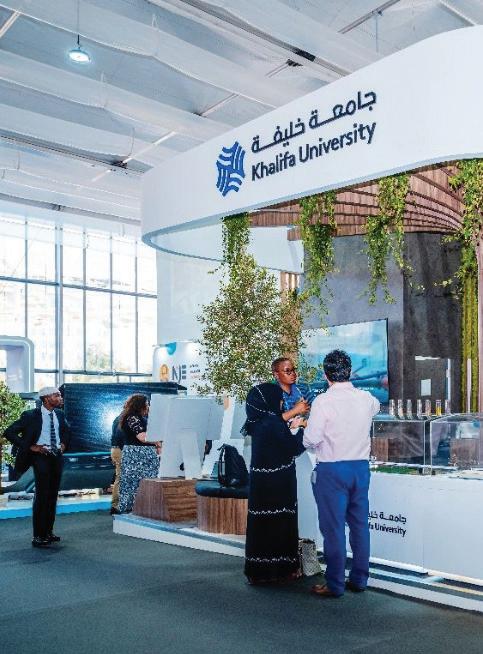

FROM THE NEWSROOM 4 KU TIMES
30 168
08
At COP28 UAE, Khalifa University displayed eight projects in the Green Zone, at the Technology and Innovation Hub 2, under the ‘UAE Space Agency’ pavilion, witnessing a record-number of dignitaries and visitors in the largest-ever climate summit. The projects on display encompassed all areas of sustainability from efficiently utilizing solar power to miniaturized satellites for climate change assessment.

These projects included the S.A.V.E software that accurately and quickly predicts the stability of power grids; Beam-Down Solar Thermal System research facility that serves as an alternative to the central receiver design of concentrated solar tower; a project to assess the rise in sea levels, extreme heat, flooding, weather extremes, dust storms, and heavy rains; 2D materials based membranes for water treatment to develop advanced water treatment solutions for lowcost desalination; a system that combines the strength of Internal Combustion Engines and electric propulsion; a 3U CubeSat capable of assessing the impacts of humaninduced climate change on ‘green’ areas especially the UAE and the Arabian Gulf region; and water-from-air conversion that is powered only by solar energy.
Khalifa University remained active at COP28, through hosting and organizing various symposiums, workshops, in addition to signing ceremonies and high-level official


meetings, demonstrating its commitment to driving innovation in clean energy transition. The University hosted a panel discussion on ‘Climate Research and Innovations in UAE’s Universities,’ held at the Ministry of Education/ Green Education Hub.
Moderated by Khalifa University’s Dr. Samuel Sheng Mao, Senior Director, Masdar Institute, and Professor of Practice, Mechanical and Nuclear Engineering, the workshop aimed to highlight the climate research and innovation initiatives undertaken by UAE’s universities.
Panelists included Heather Armour, COP28 Senior Advisor for Education, and Coordinator, University Climate Network (UCN); and other UCN Research & Innovation Workgroup members including Professor Dr. Mohamed El Moursi, Deputy Director, Advanced Power and Energy Center (APEC); Rasha Bayoumi, Director, Institutional Research Collaborations, University of Birmingham Dubai; and Ghanim Kashwani, Director, Industry Partnership, Higher Colleges of Technology. The workshop focused on the role of universities in driving climate research and fostering innovation for a sustainable future.
Panel members and officials at the session on ‘Climate Research and Innovations in UAE's Universities’ held at COP28 UAE.
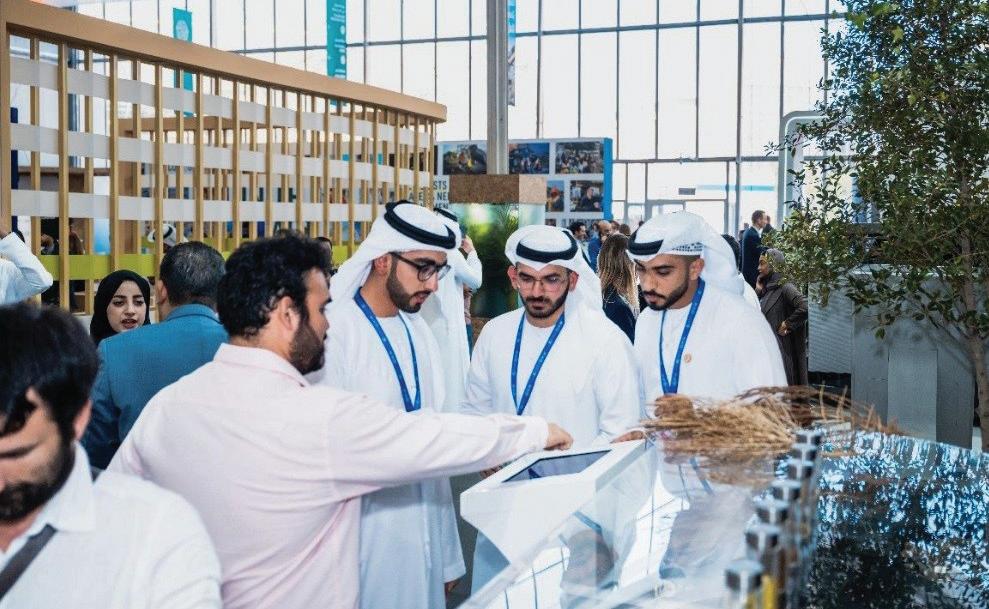
FROM THE NEWSROOM KU TIMES 5
FACULTY SHARES PERSPECTIVES AT HIGH-LEVEL PANEL DISCUSSION ON RENEWABLE POWER GENERATION, STORAGE, AND UTILIZATION
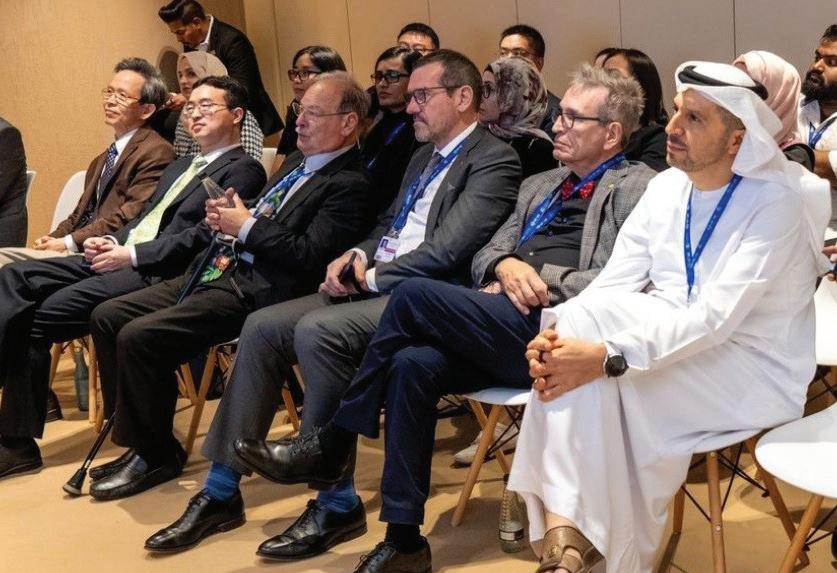
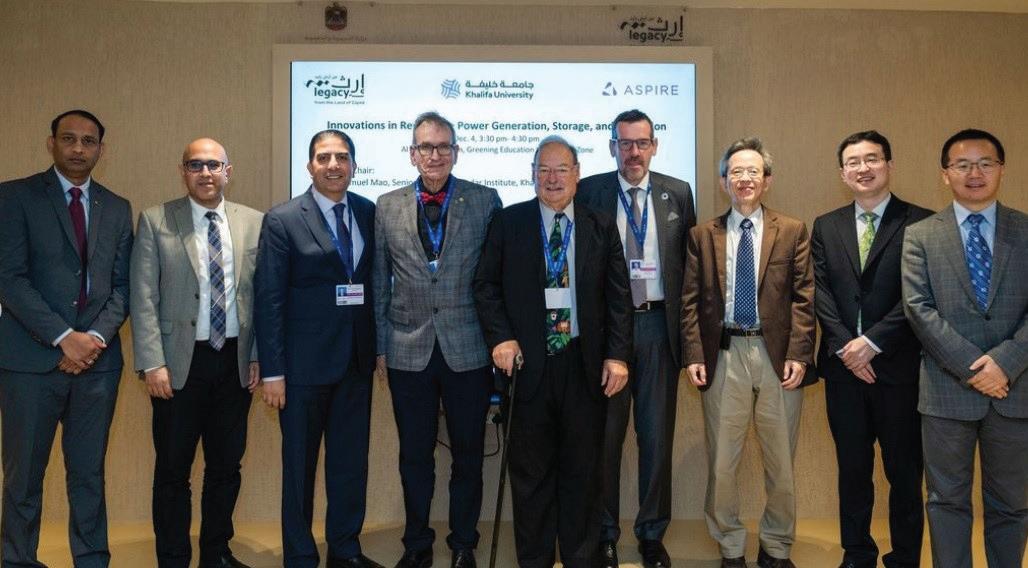
As part of Khalifa University’s participation at the COP28 UAE Summit, an insightful panel discussion on Innovations in Renewable Power Generation, Storage, and Utilization was organized. The panel included Khalifa University faculty members and co-authors of the Intergovernmental Panel on Climate Change (IPCC), the United Nations (UN) body responsible for assessing the science related to climate change, and experts from the European Academy of Sciences (ERC), a funding organization for research, set up by the European Union.
The session was attended by notable figures such as the Nobel Peace Prize laureate, Dr. Mark Levine, who is the leading co-author of the UN IPCC Report, Rodrigo Martins, President, the European Academy of Sciences, and Dr. Arif Sultan Al Hammadi,
Executive Vice-President, Khalifa University, alongside faculty members, including Dr. Tiejun (Tj) Zhang, Associate Dean, Graduate Studies and Professor, Mechanical Engineering, Professor Dr. Mohamed Shawky El Moursi, Deputy Director, Advanced Power and Energy Center (APEC), Dr. Daniel Choi, Associate Professor, Mechanical Engineering, Dr. Hatem Zeineldin, Professor and Department Chair, Electrical Engineering and Computer Science, and Professor Dr. Vinod Khadkikar.
Khalifa University faculty covered topics such as Sustainable Power Generation, Renewable Energy Integration, and Demand Side Energy Efficiency.
FROM THE NEWSROOM 6 KU TIMES
Khalifa University Executive Vice-President Dr. Arif Sultan Al Hammadi, alongside Rodrigo Martins, President, European Academy of Sciences, faculty members, and Nobel Peace Prize laureate Dr. Mark Levine.
Experts in the field discuss latest developments in Renewable Power Generation, Storage, and Utilization.
During COP28 UAE, Khalifa University signed collaborations with various organizations and institutions and held meetings with institutions such as Charles University, UKM-Malaysia, Nazarbayev University, and Tsinghua University.
Professor Sir John O’Reilly, President, engaged in productive meetings with university leaders during their participation at COP28 UAE. One such meeting took place with Professor Ilesanmi Adesida, Acting President, Nazarbayev University. The two university leaders explored avenues to strengthen mutual cooperation, particularly in areas related to fostering international experiences for students and promoting joint scientific research.
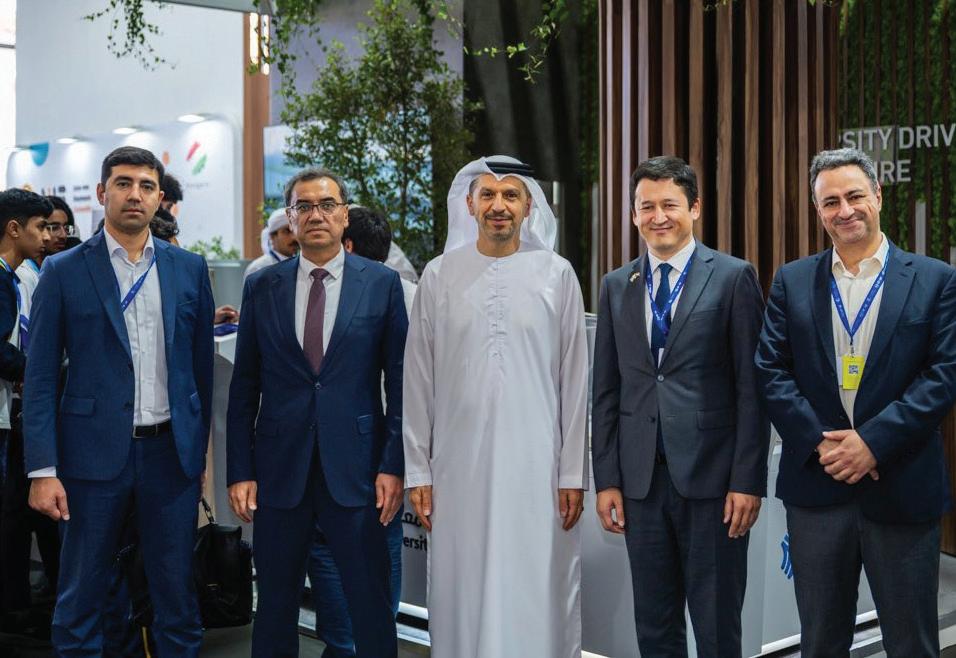

Dr. Arif Sultan Al Hammadi, Executive Vice-President, Khalifa University met with Khamidov Obidjon Khafizovich, President, Bukhara State University, Uzbekistan, who visited Khalifa University’s stand at COP28. During their discussion, they explored opportunities for collaborative efforts in areas related to environmental sciences and advanced materials.
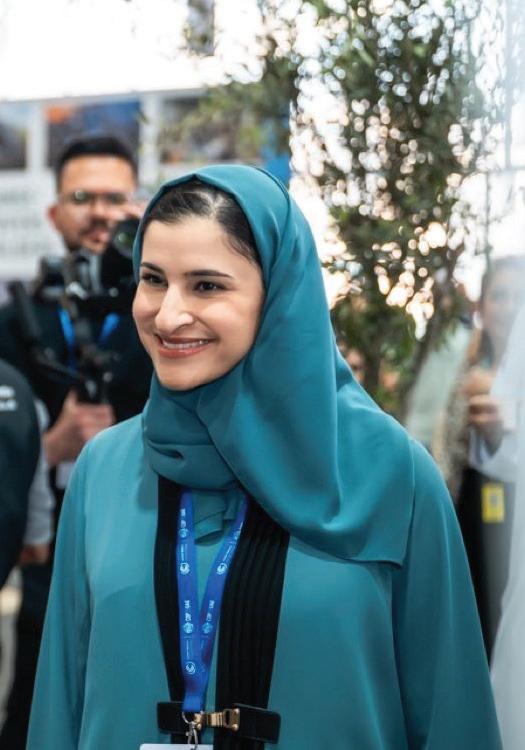
FROM THE NEWSROOM KU TIMES 7
Professor Sir John O’Reilly met with Professor Ilesanmi Adesida, Acting President, Nazarbayev University.
Second from left: Khamidov Obidjon Khafizovich, President, Bukhara State University, visits Khalifa University’s stand at COP28.
Her Excellency Sarah bint Yousef Al-Amiri, UAE Minister of State, Public Education and Advanced Technology, and Chairwoman, UAE Space Agency, visited the Khalifa University stand at COP28 UAE
Another significant event at the Khalifa University stand at COP28 was a visit from Her Excellency Sarah bint Yousef Al-Amiri, UAE Minister of State, Public Education and Advanced Technology, and Chairwoman, UAE Space Agency, and a visit from His Excellency Salem Butti Salem Al Qubaisi, Director-General, UAE Space Agency, and Dr. Mohammed Nasser Al Ahbabi, Founder, and Former Director-General, UAE Space Agency, who viewed the University’s sustainability projects and advanced innovations. Khalifa University’s stand at COP28 also welcomed H.E. Dr. Mohamed Hamad Al Kuwaiti, Head, Cybersecurity, UAE Government.
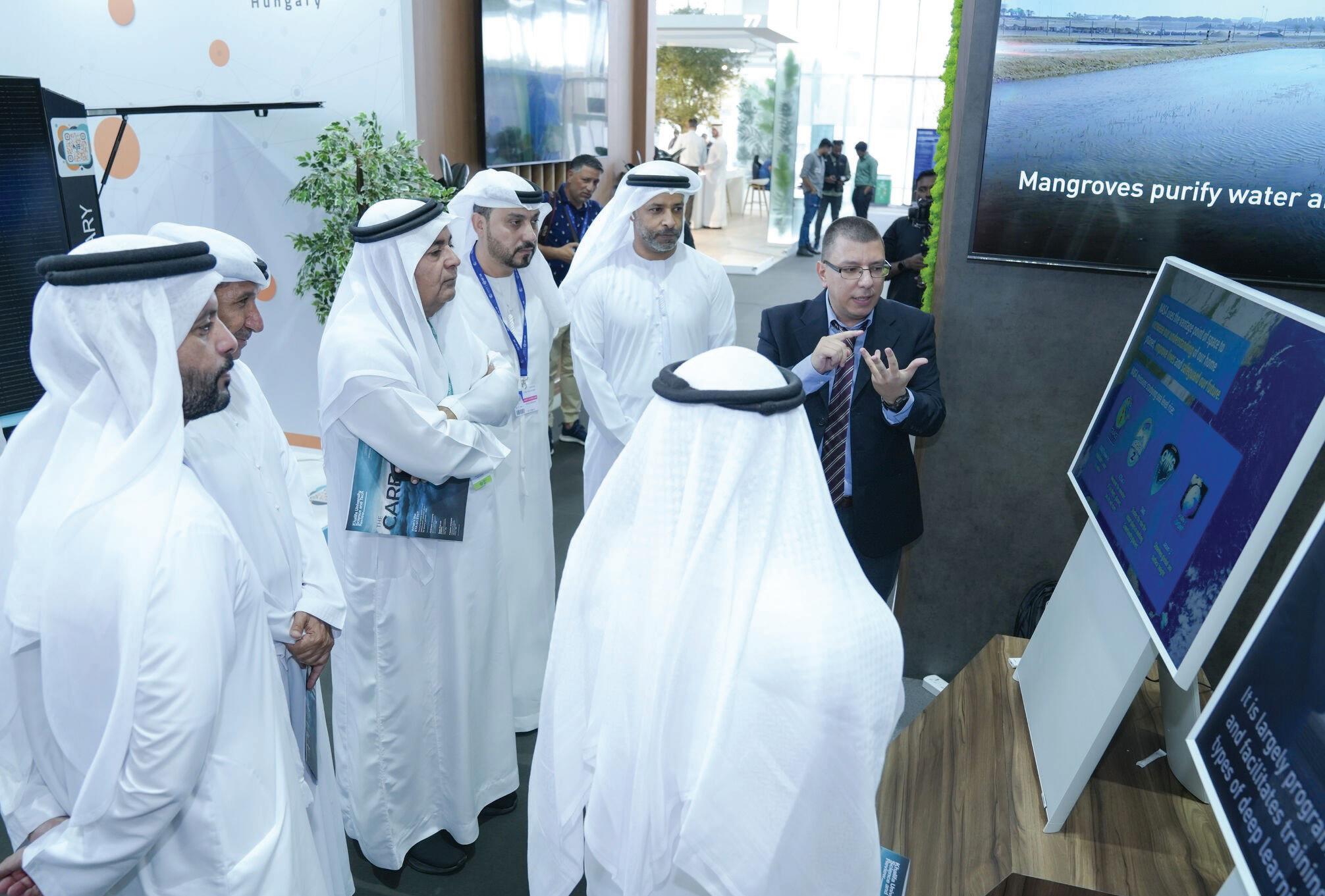
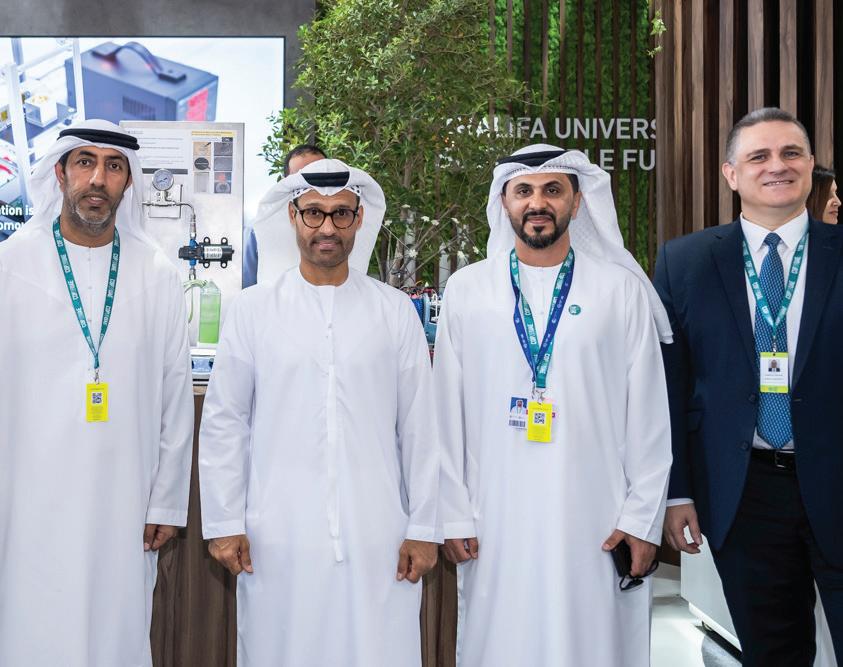

FROM THE NEWSROOM 8 KU TIMES
H.E. Salem Butti Salem Al Qubaisi, Director-General, UAE Space Agency, Dr. Mohammed Nasser Al Ahbabi, Founder and Former Director, UAE Space Agency, and Professor Ghaleb Ali Alhadrami Albreiki, Acting-Vice Chancellor, UAE University, visit the Khalifa University stand at COP28 UAE.
His Excellency Engineer Awaidha Murshed Al Marar, Chairman, Abu Dhabi Department of Energy (DoE), was welcomed by Dr. Yousof Al Hammadi, Senior Vice-President, Academic and Student Services, Khalifa University.
H.E. Dr. Mohamed Hamad Al Kuwaiti, Head, Cybersecurity, UAE Government, visits Khalifa University’s stand at COP28 UAE
KU LEADERSHIP ENGAGE AT KEY COP28 UAE SESSIONS

Khalifa University’s top leadership, including H.E. Homaid Al-Shimmari, Vice-Chairman of the Khalifa University Board of Trustees, along with Dr. Steve Griffiths, Senior Vice-President, Research and Development and Professor of Practice, Chemical and Petroleum Engineering, played key roles in various sessions at COP28 UAE. Dr. Steve Griffiths engaged in more than 10 sessions at the climate summit across the Blue and Green Zones.
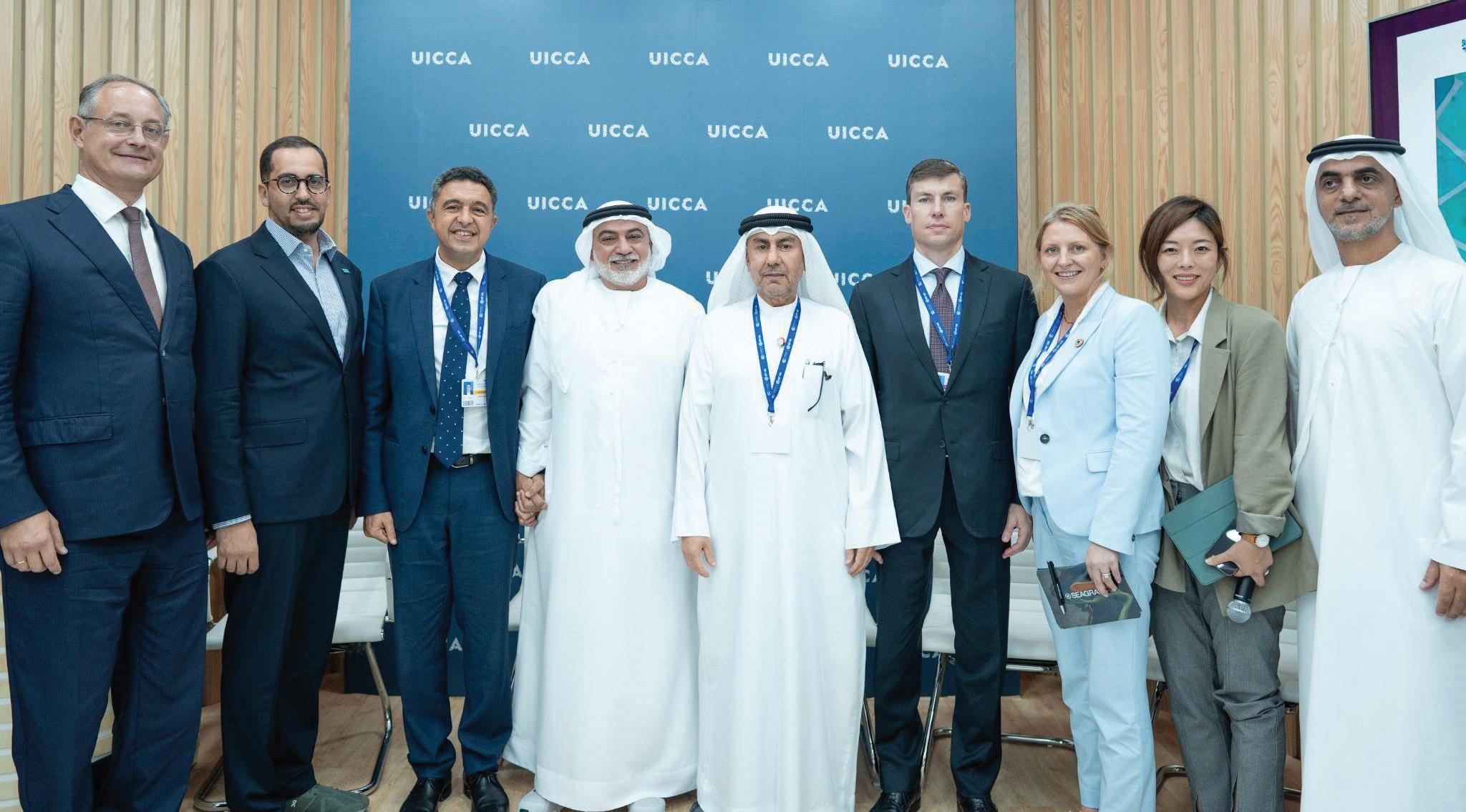
Additionally, Khalifa University faculty participated in symposiums, workshops, and two panel discussions. The participation of Khalifa University leadership and faculty members extends beyond these sessions, with Dr. Griffiths contributing to events, including the Net Zero Knowledge Consortium (NKC), Abu Dhabi Sustainability Week (ADSW) Summit, a Blue Zone Panel Session on ‘Technology Without Borders’, and an event at the Dubai Museum of the Future focused on decarbonization of the steel industry.
Throughout the year, Khalifa University remained as one of the few institutions with several community outreach programs that support the implementation of the UN Sustainable Development Goals (SDGs) –including those related to poverty, inequality, energy crises, water and food shortage, climate change, environmental degradation, as well as peace and justice.
The outreach initiatives included the KU-SDG Ambassador Program, the flagship Young Future Energy Leaders (YFEL) outreach initiative, the Al Nokhba program for the National Service and Reserve Authority (NSRA) recruits, the Visiting Undergraduate Student
Research Experience program, the Ektashif Camp on programming for students in grades 10, 11, and 12, the National Ambassadors Program ‘Estedad’ that aims to enrich the capabilities of students in UAE high schools and prepare them to excel academically and gain more insights in entrepreneurship and scientific research. Others include the Ro’ya program for high school students to offer workshops and hands-on experience in academic programs and different aspects related to the oil and gas industry, and the Career Boot Camp for UAE National high school students from grades 10 to 12.
FROM THE NEWSROOM KU TIMES 9
Dr. Steve Griffiths along with the panel on ‘Just Transition in Cities’ at the UICCA pavilion during COP28.
Khalifa University also launched 30 sustainability initiatives including a global sustainable aviation forum, an energy transition conference, and project exhibitions.
Among other initiatives were a COP28 model summit, climate change activities, a hackathon on food waste, stopping use of plastic bottles on-campus, a plant distribution campaign, a waste-to-clothes conversion initiative, a logo design competition for students, a climate action pledge, podcasts on sustainability, and new initiatives from the Students Sustainability Club.
Not just stopping with innovation – Khalifa University continued to assist students and researchers to develop their science
and engineering ideas into successful startups with the help of the Khalifa Innovation Center (KIC) – which supports high-tech and high-impact startups, bringing new and improved products to the market.
The projects on display at COP28 UAE stemmed from some of the 16 research centers at Khalifa University that have so far obtained more than 290 patents, with over 60% of these being new discoveries and technologies related to sustainability. It goes without saying that Khalifa University has also successfully listed 54 patents in areas such as Advanced Materials and Manufacturing, Clean and Renewable Energy, Environment, Hydrocarbon Exploration and Production, Robotics,
Intelligent Systems and Data Science, Sensors, and Water and Environment.
While at the campus, the continuous promotion of energy and water conservation and engagement with stakeholders ensured adoption of best practices to reduce carbon footprint. These initiatives included plans for reducing 70% of drinking water bottles and introducing self-serving dispensers, increasing recycling waste from 4% to 30%, and achieving 3% reduction in energy consumption for this year, compared to 2022, while supporting the UAE Water Security Strategy 2036 and UAE Energy Strategy 2050.

SHOWCASING INNOVATION: EIGHT PROJECTS IN THE GREEN ZONE
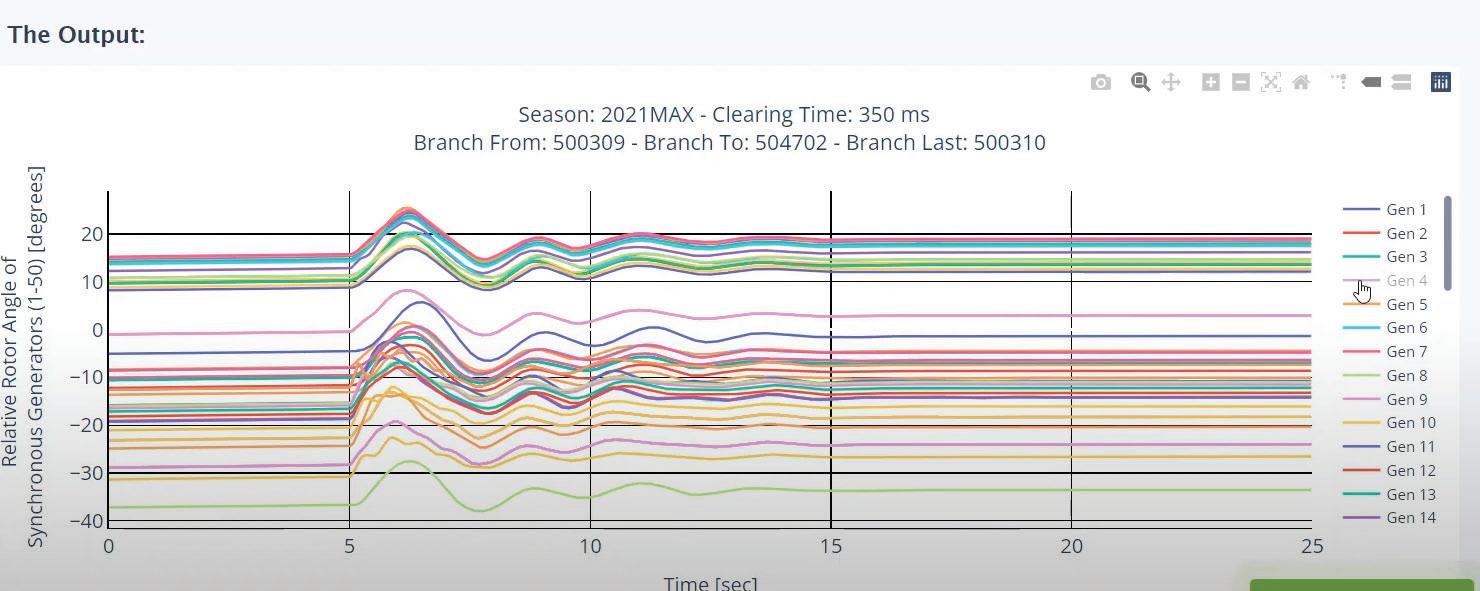
Advancing Power Grid Stability: The S.A.V.E Software
As electricity from more intermittent renewable energy sources is fed into the grid, balancing the amount of such electricity against the consumption levels becomes more challenging. Small changes to power grids, caused by load fluctuations can drive the power system out of its safe operating range, toward a critical state. A team of researchers from Khalifa University has developed a software to accurately and quickly predict the stability of power grids.
Khalifa University’s Stability Assessment Visualization and Enhancement (SAVE) software led by Professor Dr. Mohamed Shawky El Moursi, Deputy Director, Advanced Power and Energy Center (APEC), relies on advanced AI techniques and novel deterministic stability assessment methods.
HARNESSING UNLIMITED POWER: BEAM-DOWN SOLAR THERMAL SYSTEM


Instead of focusing incoming solar rays at the top of a tower, as most conventional designs do, the Beam Down designs use secondary reflectors so that the focal point is located near ground level, with the beam coming from up to down. The Beam-Down, located at Khalifa University’s Masdar Institute Solar Platform (MISP), is currently equipped with a receiver, directly integrated into a single tank of nitrate molten salts.
The technical components include a receiver and thermal storage system with this receiver being the molten salt itself, and a set of plates that function by moving up and down into the molten salt. The single tank molten salt storage, and its divider and mixing plates constitute the most differing aspect of the project.
The Beam-Down Solar Thermal System project design, led by Dr. Matteo Chiesa, Head, Laboratory for Energy and Nano Science (LENS), and Professor Mechanical Engineering, constitutes an alternative to the central receiver design of concentrated solar towers, typically operating with two tanks of nitrate molten salts as their energy storage system.
Located at Khalifa University’s Masdar Institute Solar Platform (MISP), the Beam Down uses secondary reflectors located near ground level
ASSESSING CLIMATE CHANGE IMPACTS: MENA REGION STUDY
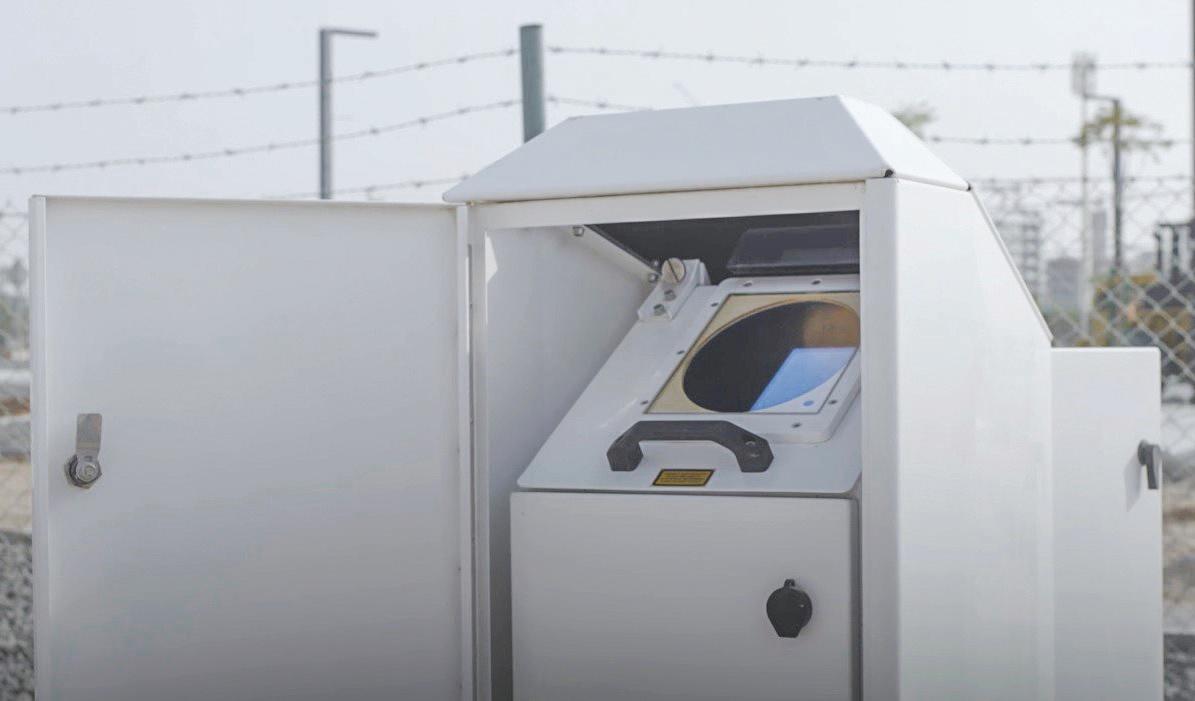
INNOVATIVE WATER FILTRATION: 2D MATERIALS BASED MEMBRANES FOR WATER TREATMENT
Led by Professor Dr. Ludovic Dumee, Chemical and Petroleum Engineering, the project aims to develop advanced water treatment solutions, using graphenefunctionalized hierarchical nano-porous membranes.
By harnessing the unique properties of 2D nanomaterials, such as graphene, water treatment processes can be enhanced, with a particular focus on polluted wastewater remediation and seawater desalination. The objective of this water project by Khalifa University’s Research and Innovation Center for Graphene and 2D Materials (RIC2D) is to pioneer the development of scalable graphene membranes by 3D printing, to enable low-cost desalination and improved water treatment.
By enabling precise control over morphologies and surface density features, thereby enhancing membrane performance, the project will help reduce operational cost and cleaning of membrane materials.
Existing climate data can be coarse and do not reflect accurately the specific climate of the region, giving enough reason for Khalifa University’s Dr. Diana Francis, climate scientist and Assistant Professor, Earth Sciences, and Head, The Environmental and Geophysical Sciences (ENGEOS) Lab, to assess the impact on rise of sea levels, extreme heat, flooding, extreme weather conditions, dust storms, and heavy rains, in the MENA region.
Through climate modeling at high resolution, and satellite observations, scientists can learn the impacts of climate change that will help them and other decision-makers to better design and implement strategies related to energy transition and sustainability in different sectors.
Knowing how much energy will be available in the future from solar or wind sources will further innovation in solar and wind park designs to lead to maximum efficiency. Similarly, knowing the constraints that these parks will be facing in the future, help to account for risks and mitigate them.
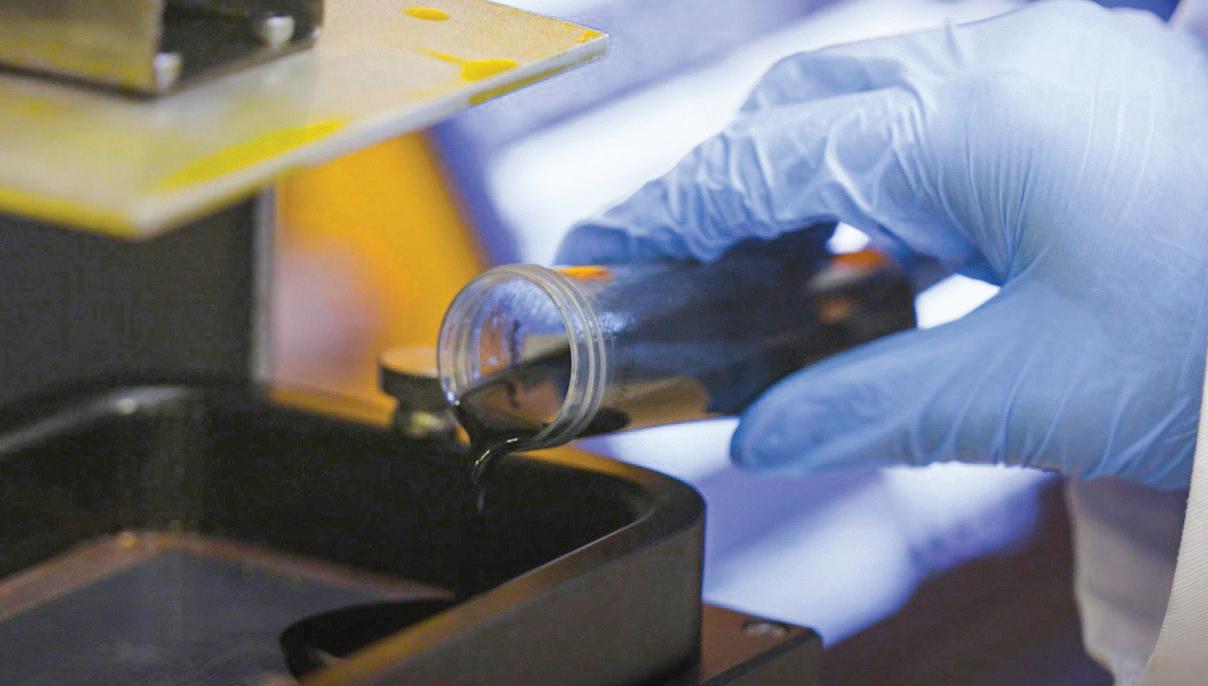
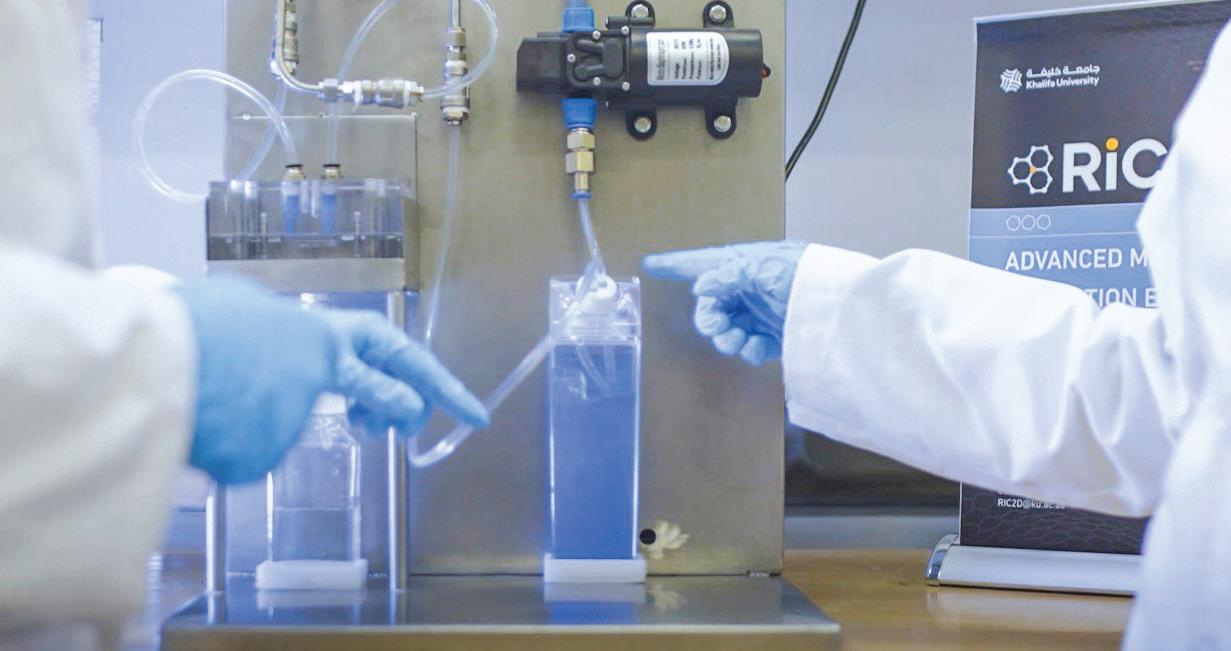
FROM THE NEWSROOM 12 KU TIMES
High-resolution climate modeling and satellite observations are at the core of the project
Developing graphene-based membranes for advanced water treatment solutions can enable low-cost desalination and improved water treatment.
DESIGN, INTEGRATION
AND TESTING OF HYBRID ELECTRIC PROPULSION SYSTEM FOR ADVANCED AIR MOBILITY VEHICLES
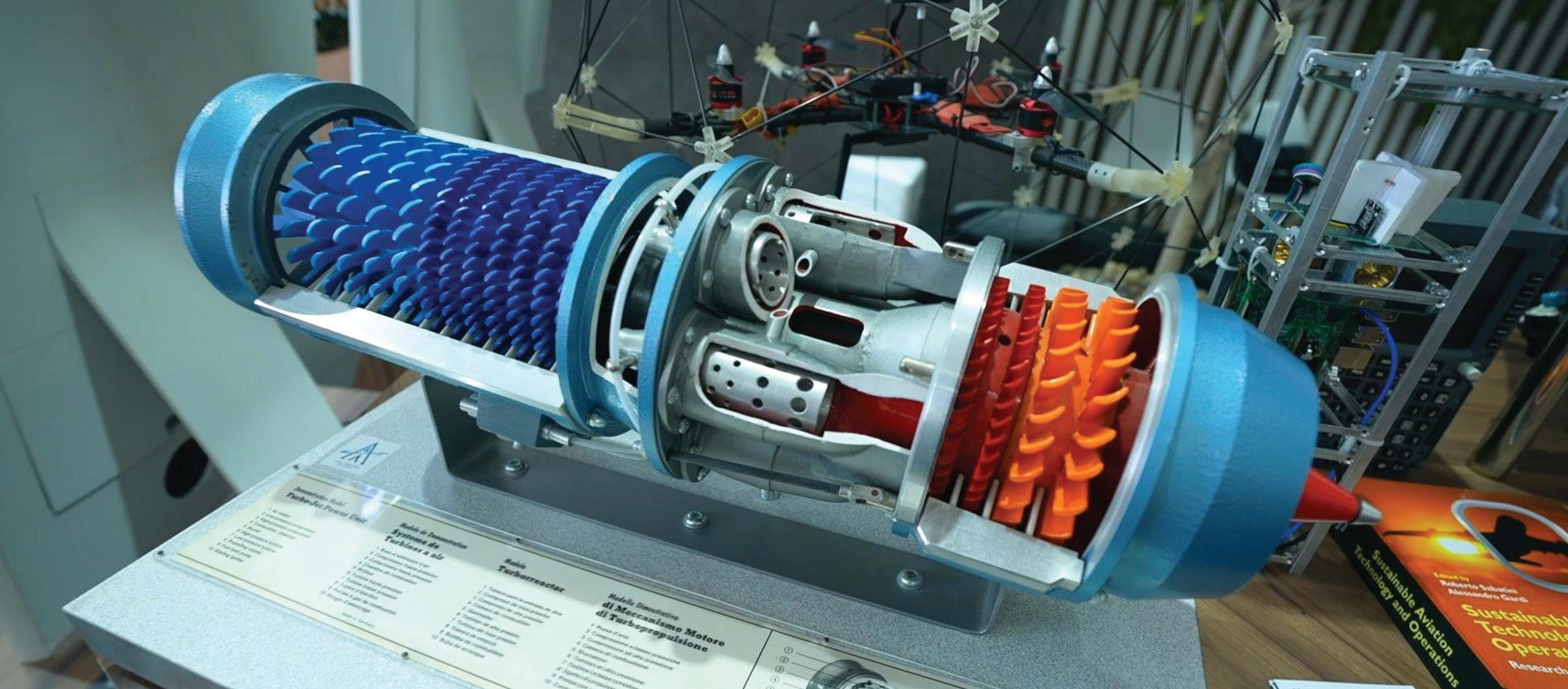
Medium-large Unmanned Aircraft Systems (UAS) rely on conventional Internal Combustion Engines (ICE) for their propulsion due to the energy density and specific energy limitations of electric batteries which would yield insufficient range and flight duration performances. In addition to being carbon-intensive and polluting, this solution is inefficient as ICE achieves their highest efficiency only at particular throttle settings, often higher than the thrust needed in flight.
This project led by Dr. Roberto Sabatini, Professor, Aeronautics and
Astronautics, aims to exploit the complementary advantages of ICE and electric propulsion by developing a Hybrid Electric Propulsion System (HEPS) involving a small efficient ICE complemented by multiple small electric motors.
Eclectic and ICE Vertical Take-Off and Landing (VTOL) UAS reduce fuel consumption and emissions, while effective propulsion design combines modern commercial hardware components. They are managed using onboard AI for continuous power and propulsion optimization.
DEVELOPMENT OF A NOVEL CUBESAT FOR CLIMATE CHANGE IMPACT ASSESSMENT

This project, which aims to design, integrate and test a 3U CubeSat, led by Professor Dr. Alessandro Gardi, Aerospace Engineering, can assess the impacts of climate change on ‘green’ areas’, specifically in the UAE and Gulf region. The project includes an AI onboard that automatically processes images and also integrates low-cost commercial-off-the-shelf hardware in 3U CubeSat.
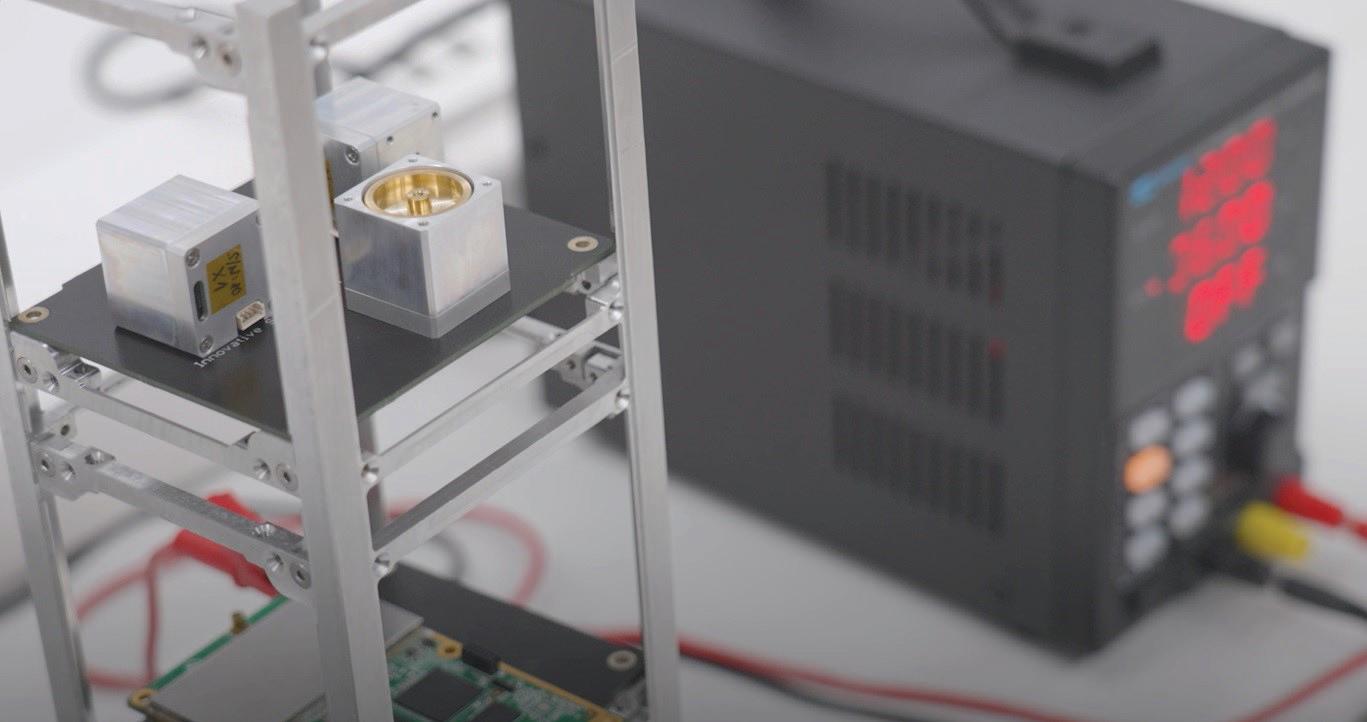
FROM THE NEWSROOM KU TIMES 13
The project combines the advantages of Internal Combustion Engines (ICE) and electric propulsion to develop a Hybrid Electric Propulsion System (HEPS).
The project combines the advantages of Internal Combustion Engines (ICE) and electric propulsion to develop a Hybrid Electric Propulsion System (HEPS).
SOLAR-POWERED WATER-FROMAIR PRODUCTION SYSTEM
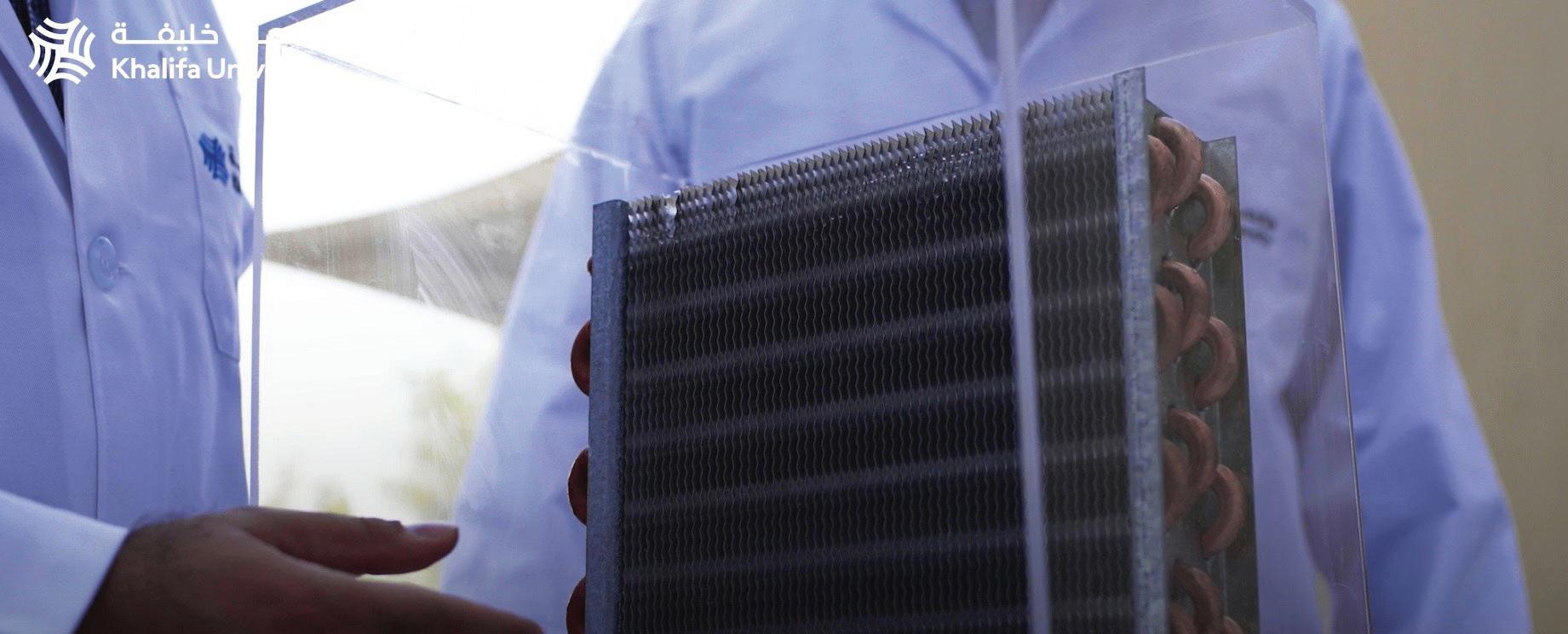
The project, which aids global water security, is led by Professor Dr. Samuel Mao, Dr. Ludovic Dumée, Assistant Professor, and Dr. Ebrahim Al-Hajri, Senior Vice-President, Support Services, and Associate Professor.
Solar-Powered Water-from-Air Production System demonstrates Net-Zero emission, energy-neutral water production sustainably, and it also addresses challenges in ensuring
SEAWATER ENERGY AND AGRICULTURE SYSTEM (SEAS)
Led by Dr. Alejandro Rios Galvan, Director, Sustainable Bioenergy Research Consortium (SBRC); Chief Research Scientist, the SEAS platform is the world’s first research facility to minimize waste,
abundant, clean water resources, emphasizing the importance of sustainable water management practices. The source of the sustainable freshwater is airbased water production with solar power through two solar-powered atmospheric water generation systems located at Sas Al Nakhl (SAN) Campus rooftop.
and grow both food and fuel using desert land irrigated by seawater, and produce sustainable biofuels for aviation.
The Seawater Energy and Agriculture System uses marginal resources to create an industrial ecology network - as it combines integrated aquaculture, haloagriculture fields of Salicornia (succulent herb) cultivation - and halo-agroforestry cultivation to generate sustainable biofuels for aviation. Aligning with UN

The second system at the Masdar Institute Solar Platform uses a different technology, while both systems use adsorption, vapor compression to produce potable water from air using solar power. Their capability of standalone production is 30 liters-a-day of high-quality freshwater.
SDGs by producing biomaterials and bioenergy, this system pumps seawater inland to supply an aquaculture farm that cultivates fish and shrimp.
The nutrient-rich water leaving this subsystem is then repurposed to irrigate and fertilize Salicornia fields. The effluent from these fields undergoes filtration in mangrove swamps before being returned to the ocean as the mangrove’s extensive root structure purifies water, serving as a carbon sink. The mangroves’ dual functionality makes it valuable for carbon offset credit mechanisms.
Projects like SEAS exemplify the integration of renewable resources, optimizing resource efficiency and minimizing waste in a circular system. The SBRC actively addresses environmental impacts associated with bioenergy production, considering factors like land use and water consumption, while also promoting carbon sequestration through halophyte cultivation.
FROM THE NEWSROOM 14 KU TIMES
The water-from-air project demonstrates net-zero emission, energy-neutral water production sustainably, ensuring abundant, clean water resources.
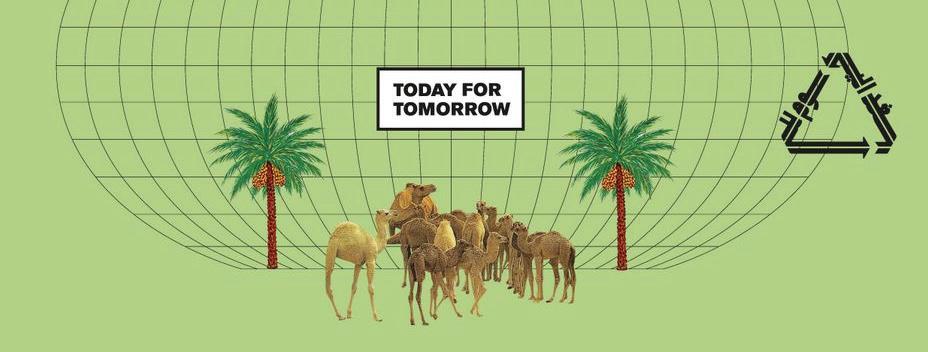
2023 - THE YEAR OF SUSTAINABILITY
With its unwavering commitment to combat climate change and promote sustainable practices, the UAE declared 2023 as the ‘Year of Sustainability,’ operating under the theme of ‘Today for Tomorrow,’ and aligning with the country’s vision to build a greener and more resilient future. As the host of the COP28 UAE summit, the UAE showcased its dedication to sustainability and continues to drive meaningful action on a global scale.
Being the first country in the Gulf region to sign the Paris Agreement, the UAE demonstrated its determination to address climate change. However, it did not stop
AGREEMENT WITH ADAFSA TO ADVANCE AGRICULTURE
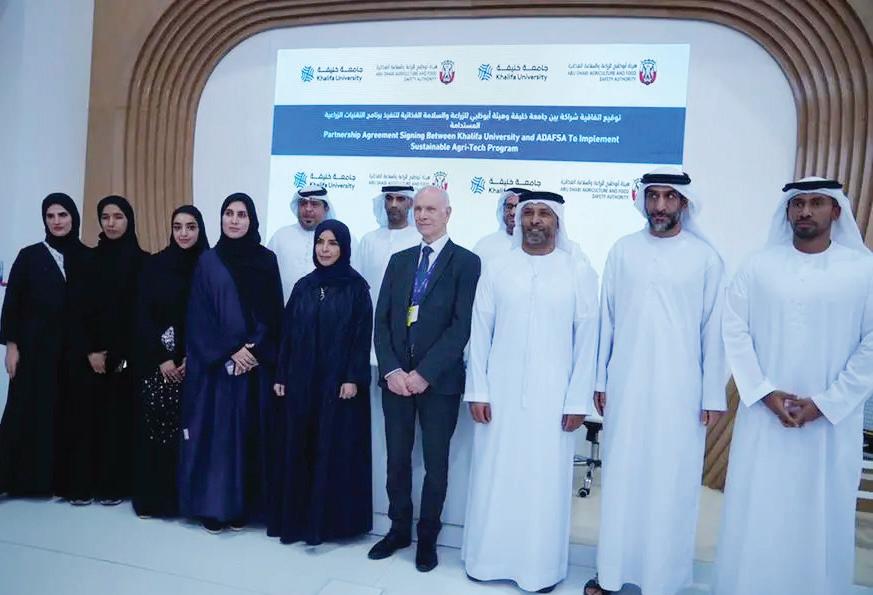
there. The UAE set an ambitious goal of achieving Net-Zero emissions by 2050, becoming the first country in the MENA region to make such a commitment.
In declaring 2023 as the Year of Sustainability, the UAE inspired collective action and fostered global collaboration. Drawing inspiration from the vision of the UAE's Founding Father the late Sheikh Zayed bin Sultan Al Nahyan, the Year of Sustainability encompassed a wide range of endeavors that served as a catalyst for positive change in society.
Khalifa University signed an agreement with the Abu Dhabi Agriculture and Food Safety Authority (ADAFSA) to implement the modern agricultural technologies program, which covers three projects – the Advanced Agriculture 4.0 program, which aims to develop the agricultural sector using modern technologies in agriculture, post-harvest practices, and transition to ‘climate-smart’ practices. The agreement was signed by His Excellency Saeed Al Bahri Al Ameri, DirectorGeneral, ADAFSA, and Khalifa University President Professor Sir John O’Reilly.
The program is being led by Emirates ICT Innovation Centre (EBTIC), which was established by Khalifa University, e& Global Technology and Investment Group (Etisalat), and BT Group, with the support of Telecommunication and Digital Government Authority’s ICT Fund.
The projects ensure that the community has access to safe and healthy food through the implementation of Advanced Agriculture 4.0 Program that aims to increase productivity and efficiency in the use of natural resources, and adopt the best climate-smart agricultural practices in both plant and animal production. It also contributes to maintaining crop quality and food security, and reducing the loss of local products.
The Post-Harvest Practices Project aims to preserve crop quality, reduce loss, and increase shelf life through the adoption of post-harvest technologies, contribute to food security, and increase the share of local agricultural products in the market. Both projects aim to raise awareness among farmers of appropriate practices and technologies through field days and virtual lectures, and publish guidelines covering all crops that can be grown in the country.
Transitioning to ‘Climate-smart’ practices includes a roadmap for achieving standards to measure climate-smart practices in the agricultural sector in the emirate, raise awareness among farmers about climate-smart agricultural practices and how to adapt to climate change, and increase the economic income, productivity, and quality of agricultural products in Abu Dhabi.
Earlier, ADFSA signed two cooperation agreements with Khalifa University, of which one aims to develop solutions to diversify food import sources using AI and machine learning. Another project aims to implement the first phase of ‘Expanding the coverage of inspection and control programs’ to develop the smart control system using AI and Internet of Things.

ACS STUDENT CHAPTER PRESIDENT BECOMES COP28 STUDENT AMBASSADOR
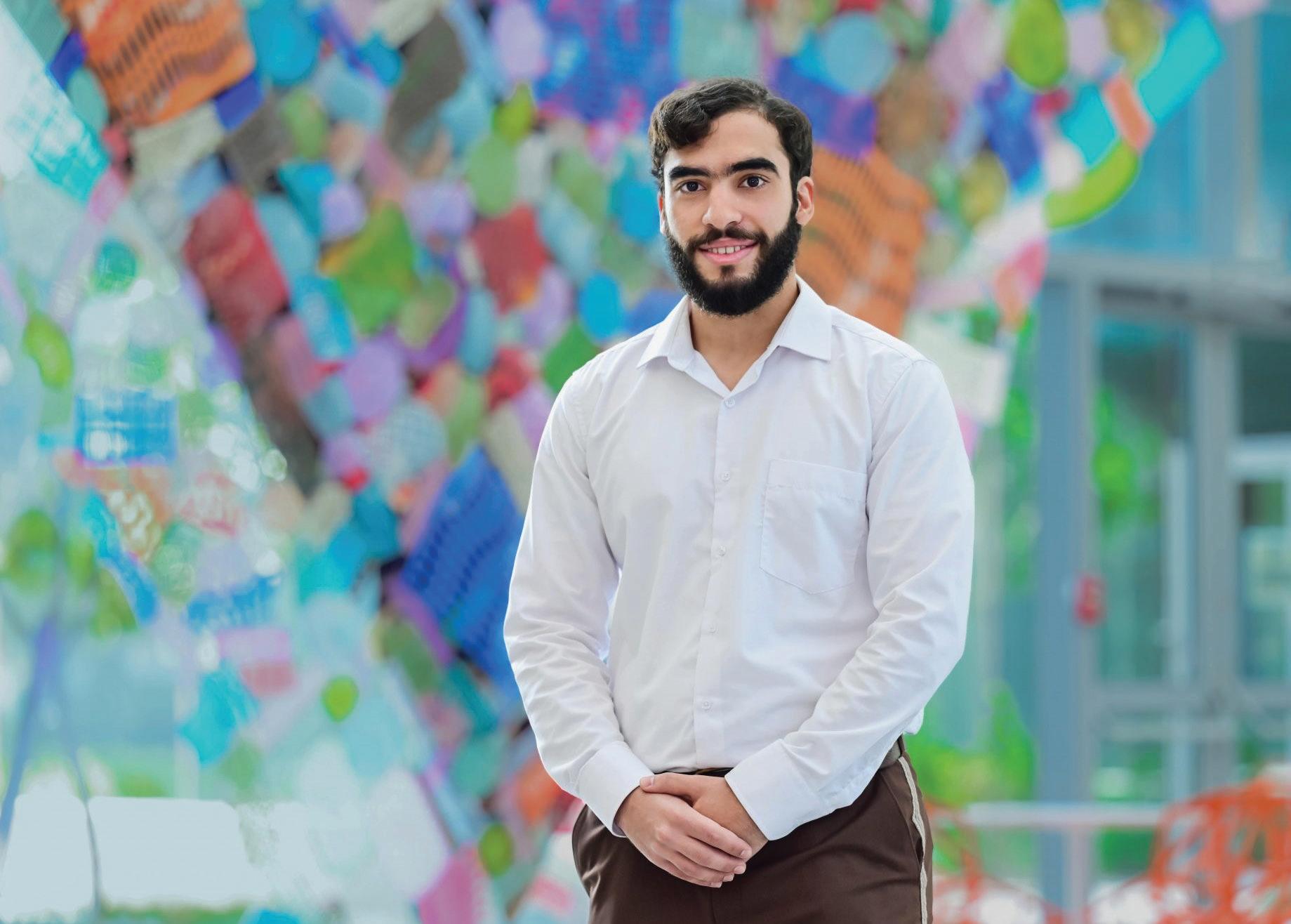
Mohammed Khalid Dawood Al-Dulaimi, senior undergraduate Chemistry student, and President and Founder of the American Chemical Society (ACS) student chapter at Khalifa University, was chosen as one of the ACS Student Ambassadors for the COP28 UAE Summit.
Al-Dulaimi is the only non-US student who was chosen to play a leadership role as part of the Ambassador program organized by the ACS. Alongside two mentors, he was one of the delegates who represented the American Chemical Society (ACS), a professional organization dedicated to the promotion and support of chemistry and its practitioners. They attended the summit from November 30-December 12, and engaged their communities through various social media platforms. During
the first week, the students published environment-themed blogs on the ACS’s climate change conversation website.
Al-Dulaimi is also an active member of the Green Youth Majlis (GYM) at the Environment Agency Abu Dhabi (EAD), one of the largest environmental regulators in the Middle East.
Dr. Sharmarke Mohamed, Associate Professor of Chemistry, Chair of the ACS International Chemical Sciences Chapter in the UAE, and founding faculty supervisor of the ACS Student Chapter at Khalifa University, commended Al-Dulaimi and said the proud moment recognizes Mohammed’s exceptional work and underscores the significant strides made by the Chemistry Department.
FROM THE NEWSROOM
Mohammed Khalid Dawood Al-Dulaimi is also an active member of the Green Youth Majlis (GYM) at the Environment Agency in Abu Dhabi (EAD), one of the largest environmental regulators in the Middle East.
LAUNCH OF GLOBAL SUSTAINABLE AVIATION EXCHANGE BRINGS TOGETHER INDUSTRY AND ACADEMIA TO ADDRESS AVIATION CHALLENGES
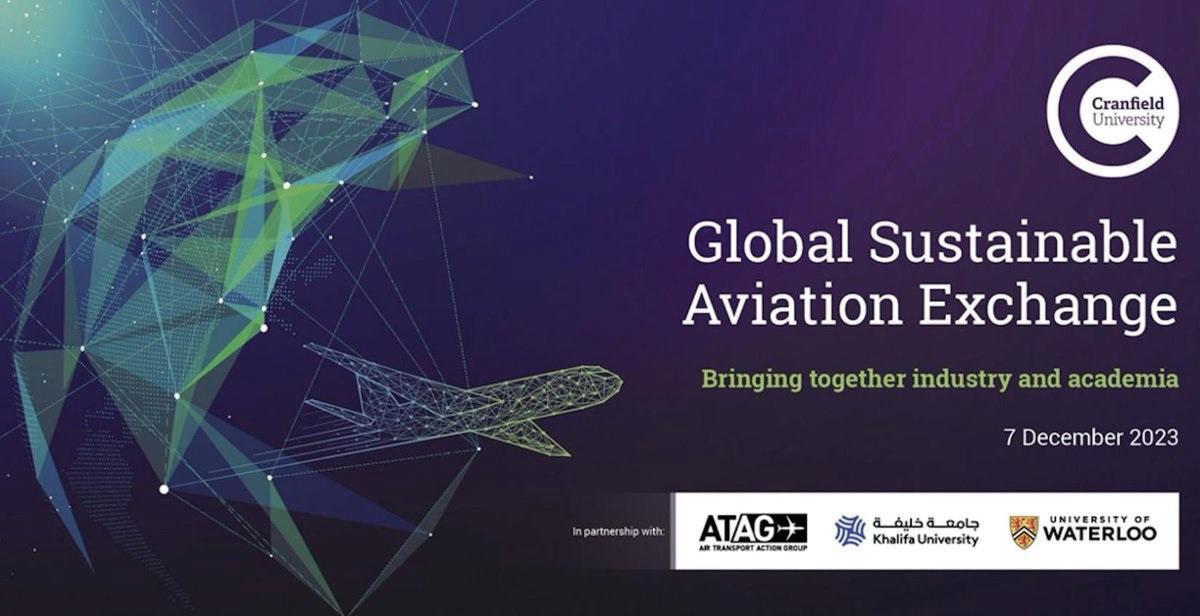
The GSAE will facilitate these collaborations through a program of challenge-specific workshops, starting in February 2024.
Khalifa University joined seven other stakeholders to officially launch the Global Sustainable Aviation Exchange (GSAE) at a ceremony co-hosted at the Khalifa University Main Campus in Abu Dhabi and Cranfield University in Bedford, UK, marking an important milestone in the aviation industry’s efforts in meeting Net Zero 2050 targets to address climate change and biodiversity.
The hybrid event, which coincided with the Rest Day of the COP28 UAE Summit and the International Civil Aviation Day 2023, brought together industry leaders, policymakers, investors, and leading academics from around the world.
The GSAE builds upon the success of the Global Aviation Summits held from 2020 to 2022, organized by Cranfield University in partnership with the Air Transport Action Group (ATAG), a coalition of aviation industry experts focusing on sustainable development issues.
Professor Sir John O’Reilly, President, Khalifa University was present at the inauguration, who highlighted Khalifa University’s decade long role in advocating, recommending and leading with stakeholders in demonstrating sustainable aviation practices during his welcome address at the event. Dr. Alejandro Rios Galvan, Director, Sustainable Bioenergy Research Consortium (SBRC) and Chief Research Scientist, participated in discussions addressing the Top 10 Sustainability Challenges that highlighted the latest research from around the world addressing the challenge. Dr. Galvan moderated a panel on Sustainable Aviation Fuels (SAF) Scale Up and accelerating solutions.
Key participants of the launch event included patrons of the GSAE include Salvatore Sciacchitano, President, International Civil Aviation Organization (ICAO), Jane Hupe, Deputy Director Environment, ICAO, Willie Walsh, Director General, International Air Transport Association (IATA), and Julia Simpson, President and CEO, World Travel and Tourism Council (WTTC).
During the launch event, industry and academic speakers and moderators engaged in scientific and knowledge exchanges to review the top 10 sustainable aviation challenges that must be addressed by 2030 to achieve the aviation industry’s goal of reaching net-zero emissions by 2050. One of the objectives of the launch event was to utilize these discussions as a starting point for initiating global collaborations to deliver operational solutions within this decade. The GSAE will facilitate these collaborations through a program of challengespecific workshops, starting in February 2024.
Other discussions during the event focused on greater clarity on sustainability challenges, addressing research gaps for the aviation sector’s 2050 target, reinforcing the importance of collaboration and action for sustainable aviation, skills shortage and workforce sustainability, adaptations to climate change impacts, the aviation sector’s role in achieving Net Zero 2050 while keeping global warming below 1.5˚C, and the dissemination of leading research and innovations to industry, investors, and governments.
Professor Sir John also mentioned Khalifa University’s own contributions to sustainable aviation practices, including initiatives such as the SBRC, which focuses on developing clean, alternative fuels for aviation, which in collaboration with key stakeholders resulted in the successful Abu DhabiAmsterdam Etihad Airways Boeing 787 flight powered by GE’s GEnx-1B engines fueled by biofuel produced through the SBRC’s Seawater Energy and Agriculture System (SEAS).
FROM THE NEWSROOM KU TIMES 17
FIRST-OF-ITS-KIND RESEARCH CONSORTIUM FOR RENEWABLE
AND ADVANCED AVIATION FUELS LAUNCHED
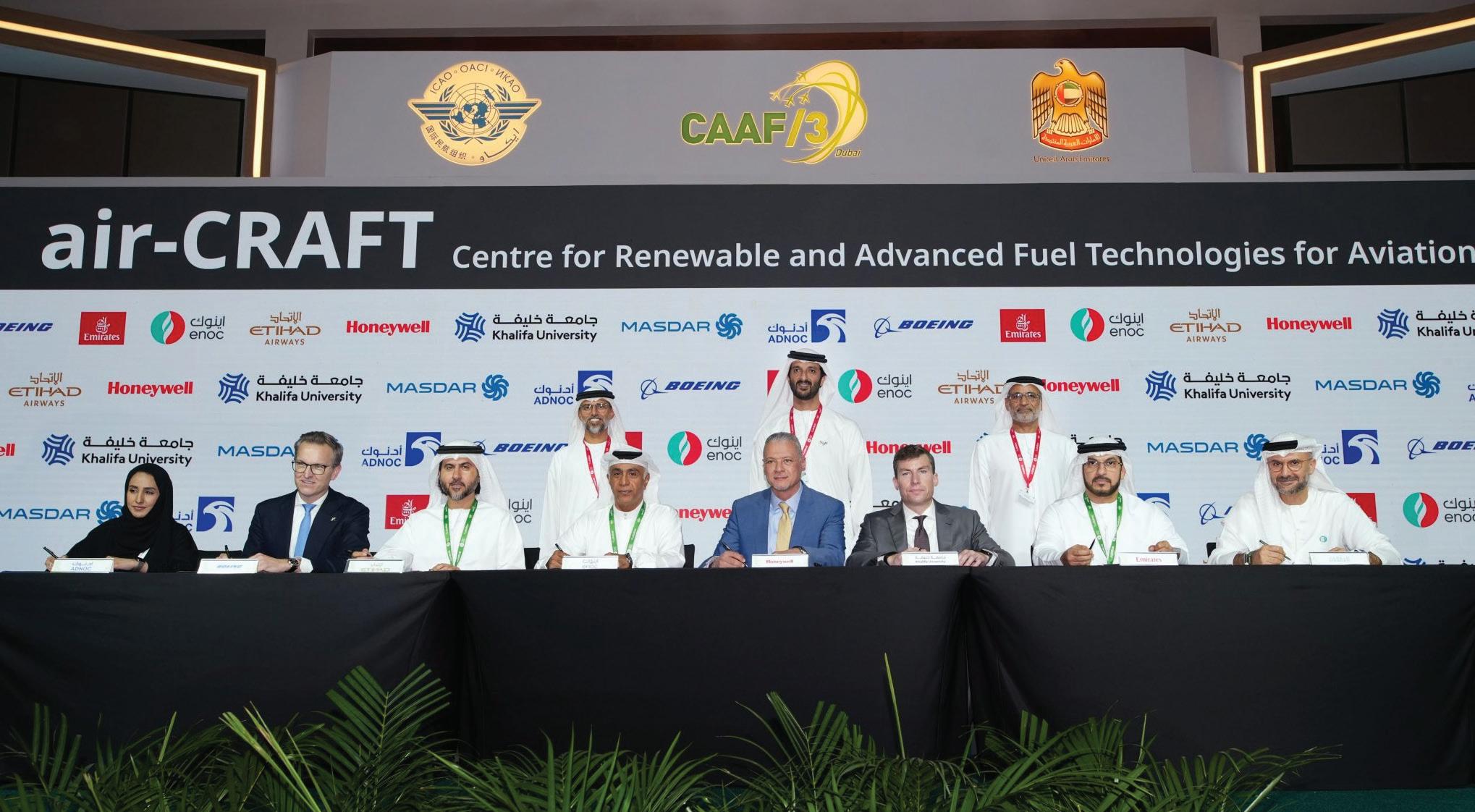
The consortium, Air-CRAFT, is supported by the UAE Ministry of Energy and Infrastructure and UAE General Civil Aviation Authority, and comprises eight entities: ADNOC, Boeing, Emirates, ENOC, Etihad, Honeywell, Khalifa University, and Masdar.
In the UAE Year of Sustainability, and at the 3rd ICAO Conference on Aviation and Alternative Fuels (CAAF/3) held in Dubai, UAE entities announced the launch of ‘Air-CRAFT’a research consortium focused on developing, producing, and scaling sustainable aviation fuel (SAF) technologies.
Air-CRAFT, or the UAE Centre for Renewable and Advanced Fuel Technologies for Aviation, is a first-of-its-kind initiative that brings together entities across the value chain –industrial, policy-maker, aviation regulator, fuel producers, academia and researchers, aircraft and powerplant manufacturers, and airline operators. While based in the UAE, the consortium will also engage with, and welcome the participation of relevant international entities as it progresses.
On the sidelines of CAAF/3, senior representatives from the consortium entities
signed the MOU, officially launching the AirCRAFT initiative.
Potential research topics at Air-CRAFT include environmental impact assessments, feedstock and process optimization, and techno-economic assessments. Air-CRAFT will also establish relevant links with other academic and research institutions in the UAE and internationally.
The consortium’s industrial and institutional partners will provide market demand, expertise, and technology to support research into the production of alternative fuels for the aviation sector - and extend an open invitation to UAE and international entities to join the consortium. Air-CRAFT is already in advanced discussions with key and strategic global players to be announced in due course.
The biggest decarbonization lever available to the aviation industry is the adoption of Sustainable Aviation Fuel (SAF). For long haul commercial flights in particular, no other technology platform is expected to significantly contribute to carbon neutrality goals in the next three decades at least,
due to cost, technical or regulatory barriers. Despite its critical role in decarbonization pathways for the aviation sector, SAF is supply constrained and needs to be scaled rapidly.
The UAE Ministry of Energy and Infrastructure has published a SAF Roadmap which has five principles to guide the industry in accelerating the decarbonization of the sector and transform it into a regional hub for alternative aviation fuels.
The five principles are: Establishing the Ambition: 700 million liters SAF by 2030, Accelerating SAF Technology Deployment and Innovation, Developing the National Regulatory Environment for SAF, Building Local Capacity to Boost In-Country Value, and Leading International Collaboration. AirCRAFT will also pursue the industrialization of SAF production and create an ecosystem to address the five principles of the UAE SAF Roadmap.
On the sidelines of CAAF/3, senior representatives from the consortium entities signed the MOU, officially launching the Air-CRAFT initiative.
ASTEROID NAMED AFTER KHALIFA UNIVERSITY FACULTY BY INTERNATIONAL ASTRONOMICAL UNION
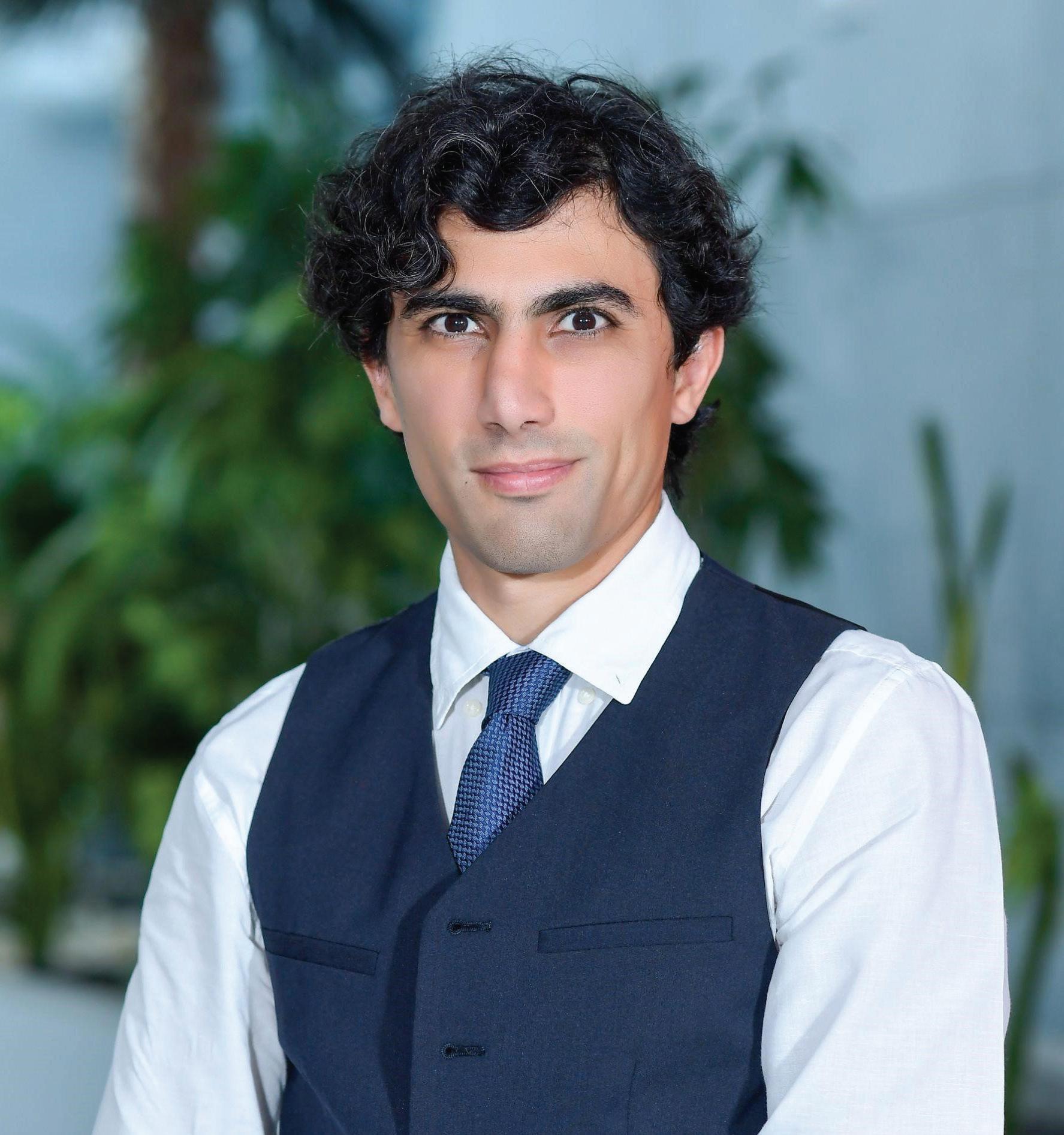
The International Astronomical Union (IAU) has named an asteroid after Dr. Mohamed Ramy El-Maarry, Associate Professor of planetary science in the Earth Sciences department and Director of the Space and Planetary Science Center, Khalifa University. The asteroid that once bore the designation of 2002 CZ has now been named (357148) El-Maarry – marking a historic moment for Khalifa University and for the UAE space sector.
The asteroid, named in recognition of El-Maarry’s significant contributions to the study of comets, and planetary science in general, was originally discovered on 2 February 2002, through the efforts of a joint venture between the Department of Astronomy and Astronomical Observatory of Padova and the German Aerospace Center DLR Berlin. The survey led to the discovery and naming of several asteroids, including the asteroid now known as (357148) ElMaarry.
Dr. Arif Sultan Al Hammadi, Executive Vice-President, Khalifa University, said: “The naming of the asteroid by the International Astronomical Union after our faculty marks a significant milestone
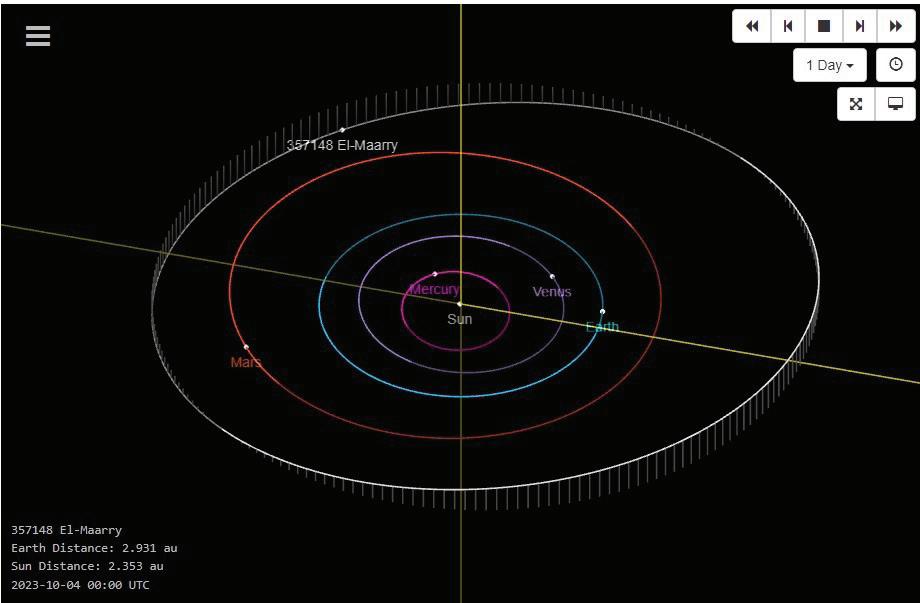
for Khalifa University and the UAE. The recognition for Dr. El-Maarry also emphasizes the globally-relevant research that our world-class faculty takes up at Space and Planetary Science Center in scientific exploration. We believe such honors recognize the impactful role played by scientists and researchers in the UAE’s space and astronomy sector while inspiring the future generation of innovators in science and technology.”
At the Khalifa University Space and Planetary Science Center, Dr. El-Maarry’s research covers planetary surfaces and the physical processes that affect them using a multi-disciplinary approach that involves data analysis of remote sensing data, modeling, lab work and comparative planetology mainly through fieldwork.
Dr El-Maarry has been involved with numerous international and national space missions in the past 16 years, including the European Rosetta mission to comet 67P/Churyumov-Gerasimenko, NASA’s New Horizons mission that explores Kuiper Belt Objects at the edge of our solar system, and the Emirates Lunar Mission, in addition to being on the science team for numerous other active and future missions including HiRISE and CaSSIS imagers onboard NASA’s MRO and ESA’s TGO missions, respectively, and the upcoming ESA ExoMars Rover, Comet Interceptor, the planetary defense mission Hera, and the Emirates Mission to the Asteroid Belt.
The asteroid can be viewed in the NASA Small Bodies Database. According to the information available, it is located in the inner Asteroid Belt, more than 300 million kilometers away from the Sun. It orbits the Sun once every approximately three and a half years, and should get closest to the Sun on 11 August 2024.
FROM THE NEWSROOM KU TIMES 19
The recognition for Dr. El-Maarry also emphasizes the globally-relevant research that our world-class faculty takes up at Space and Planetary Science Center in scientific exploration.
Dr. Mohamed Ramy El-Maarry, Associate Professor of planetary science in the Earth Sciences department and Director of the Space and Planetary Science Center, Khalifa University.
TOPPING UAE IN STANFORD UNIVERSITY’S LIST OF WORLD’S
TOP 2% MOST INFLUENTIAL RESEARCHERS
Khalifa University faculty represents more than 22% of all UAE faculty totaling 407 for 2023 with 90 faculty members earning a place on the prestigious 2023 Stanford University World Ranking, which identifies the top 2% most influential researchers worldwide, in a study conducted by global information analytics company Elsevier and Stanford University.
Earlier, in the year 2019, a total of 45 Khalifa University faculty were included in the prestigious listing of the world’s top 2% of scientists, representing a quarter of all UAE faculty, making the university top in the UAE with the highest number of faculty on the list.
Scientists are categorized into 22 fields and 174 subfields based on the Science-Metrix classification. Career-long data is updated until the end of 2022, while data for a single recent year reflects citations received in 2022. Selection is based on a c-score ranking in the top 100,000 or a percentile rank of 2% or higher. The data is sourced from Scopus and provided by Elsevier through the International Center for the Study of Research (ICSR) Lab.
The publicly available database of highly cited scientists, provides standardized information on their citation metrics, co-authorship
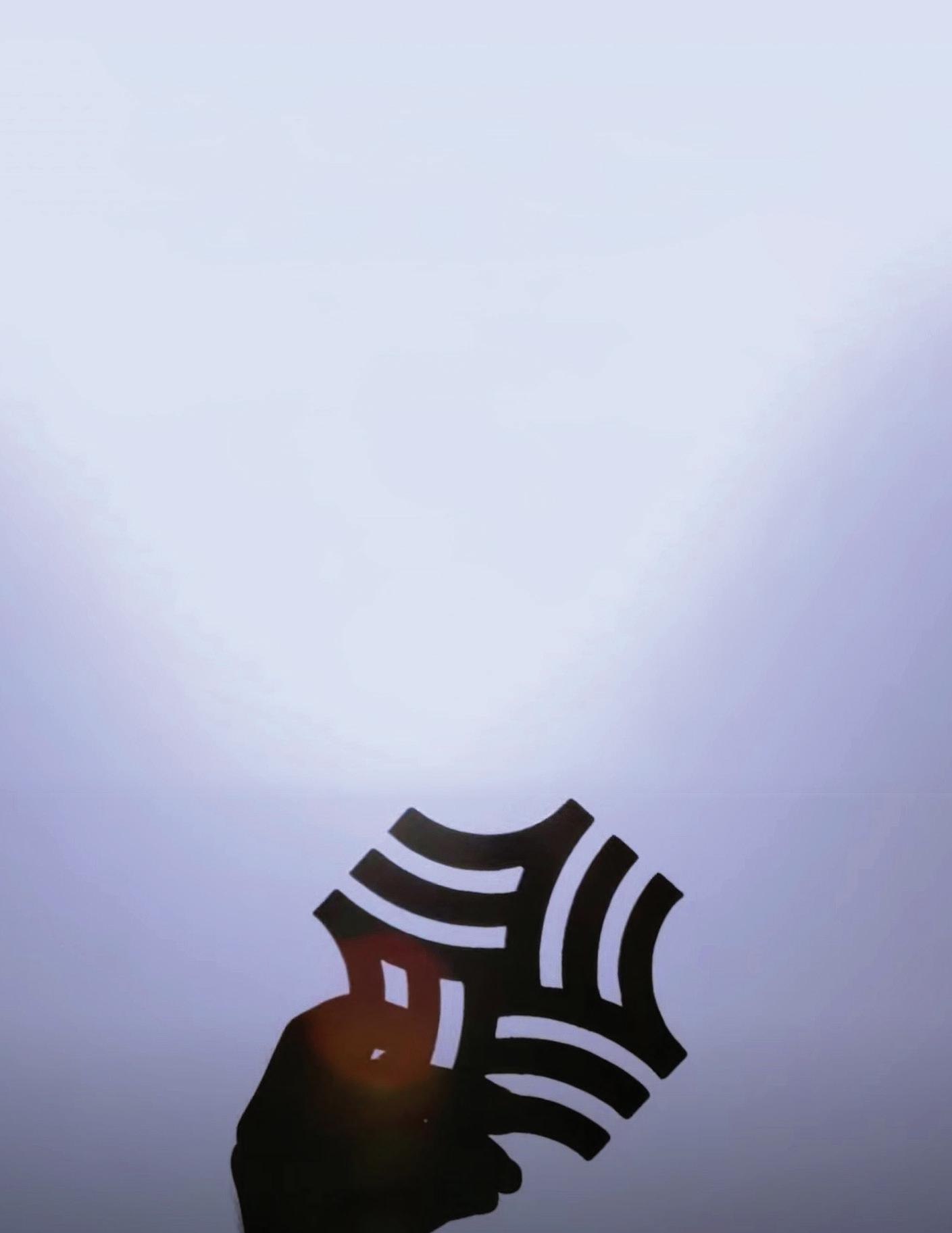
adjusted HM-index, field classification, and subfield-specific percentiles. The database includes data on citations to papers in different authorship positions, c-scores, and citation ratios.
As of Spring 2023, Khalifa University has more than 400 faculty members. As of 31 October 2023, the university has 293 issued patents, with 741 filed patent applications pending, while total invention disclosures exceed 650.
With 16 core research centers Khalifa University drives innovation spanning diverse areas including clean and renewable energy, hydrocarbon exploration and production, water and environment, healthcare, aerospace, biotechnology, and supply chain and logistics. Research in these sectors is enhanced by platforms such as robotics, machine learning and data science, information and communication technologies, and advanced materials and manufacturing. Additional depth and breadth to the university’s portfolio is provided by research in mathematics, physics, chemistry, biology, humanities and social sciences.
Khalifa University faculty represents more than 22% of all UAE faculty totaling 407 for 2023 with 90 faculty members earning a place on the prestigious 2023 Stanford University World Ranking.
20 KU TIMES

TOP IN UAE AND AMONG TOP 40 IN ASIA IN QS SUSTAINABILITY RANKINGS 2024

Khalifa University is ranked top in the UAE, and among top 40 in Asia out of 478 institutions, in the QS World University Rankings: Sustainability 2024.
It also came among the top 200 in Environmental Impact in the 2024 QS World University Rankings: Sustainability that highlights different ways in which universities are taking action to tackle the world’s greatest Environmental, Social and Governance (ESG) issues.
The QS Sustainability Rankings analyzes Environmental Education, Research, Sustainability, Employability and Outcomes, Equality, Knowledge Exchange, Social Impact of Education, as well as Health and Wellbeing not only of its students, but society more widely.
FROM THE NEWSROOM
With an overall score of

Khalifa University has surged ahead to be placed second in the Times Higher Education (THE) Arab University Rankings 2023, moving higher from the 5th place in last year’s ranking, while maintaining its position as the top university in the UAE for the third consecutive year.
In all, 313 institutions across 18 countries are listed in THE Arab University Rankings 2023. There are 10 institutions from the UAE in the list. Khalifa University is also ranked first in the ‘Society’ and ‘Teaching’ categories in the UAE.
THE Arab University Rankings 2023 employs 16 carefully calibrated performance indicators that are organized within five categories – Teaching (the learning environment); Research (volume, income and reputation); Citations (research influence); International outlook (staff, students, and research); and Society (knowledge transfer and impact).
ARAB
BREAKDOWN OF RANKING OVERALL RESEARCH QUALITY INTERNATIONAL OUTLOOK REASEARCH ENVIROMENT TEACHING SOCIETY 91.4 90.7 74.7 99.2 88.3 92.1 2021 2022 2023 OVERALL 2023 Rank : 2 100 91.4 5 2 6
UNIVERSITY RANKINGS
FROM THE NEWSROOM 22 KU TIMES
91.4, Khalifa University is also ranked first in the ‘Society’ and ‘Teaching’ categories in the UAE.

EMIRATI ASTRONAUT DR. SULTAN AL
NEYADI AND HIS EXPEDITION 69 COLLEAGUES INSPIRE AT KHALIFA UNIVERSITY
A special visit to the Main Campus by Dr. Sultan Al Neyadi and his three colleagues, astronauts Sergey Prokopyev, Woody Hoburg, and Dmitri Petelin, who spent six months on the International Space Station (ISS) as part of the Expedition 69 Mission, marked a momentous occasion for space enthusiasts and the Khalifa University community.
During his time aboard the ISS, Dr. Sultan Al Neyadi served as a representative of the UAE and the Arab world, capturing important moments and experiences and showcasing the unique welcoming culture of the region to the international space community.
The visit to Khalifa University included an interactive session with students, who had the opportunity to engage with the astronauts and take photographs with them. The visit also included a comprehensive tour of the university’s state-of-the-art research facilities, providing the astronauts with an insight into the institution’s commitment to scientific progress.
Dr. Sultan Al Neyadi’s active involvement in space-related initiatives has significantly enhanced the UAE’s presence in the international space community. As one of the first Emirati astronauts selected in 2018, his accomplishments have served as a source of inspiration for aspiring astronauts and individuals interested in the field of space exploration.
Ahead of Dr. Al Neyadi’s homecoming, Abu Dhabi’s landmarks including Khalifa University Main Campus were lit up on 17 September 2023, illuminated with images of the Emirati explorer.

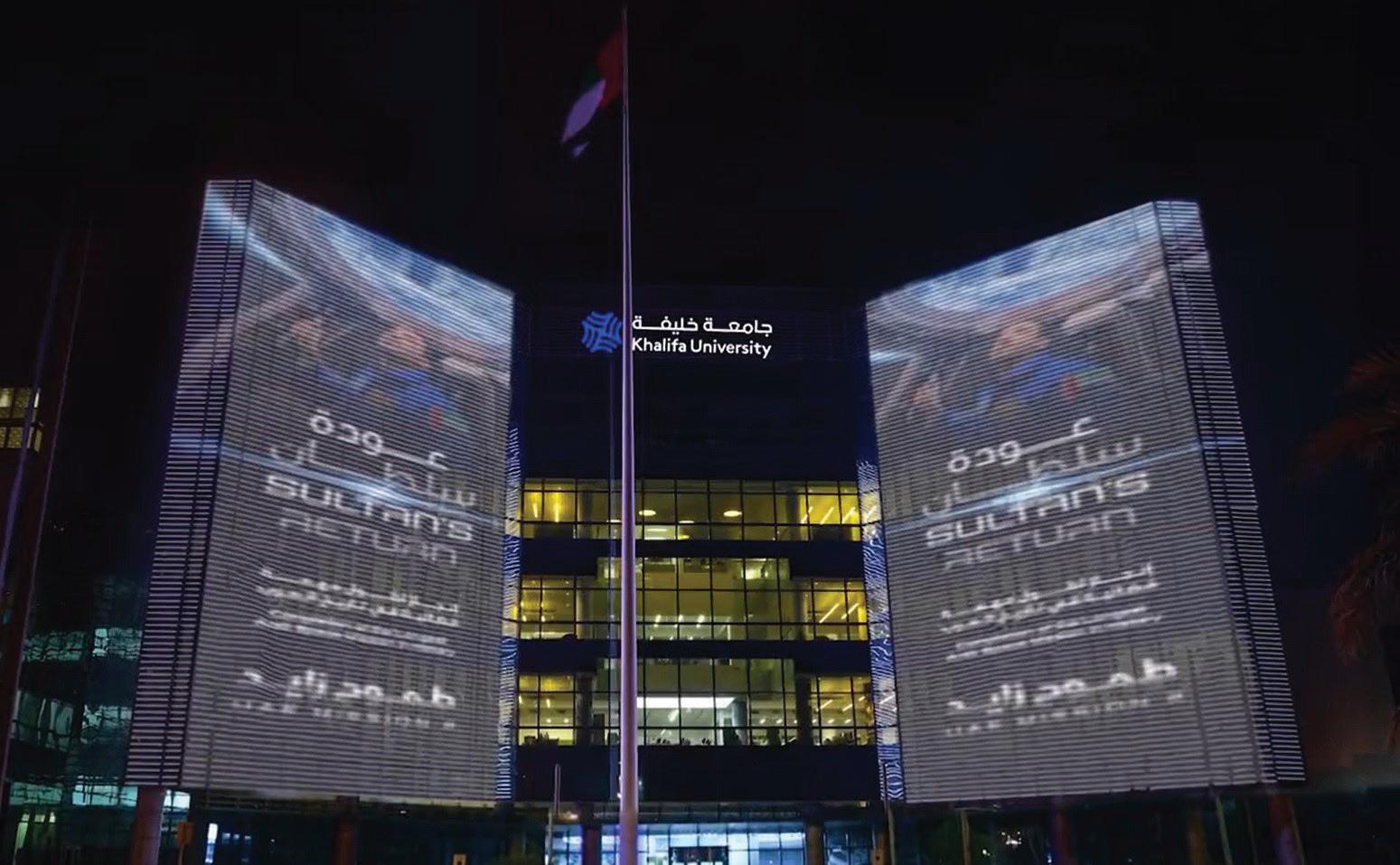 The visit by the Expedition 69 team marked a momentous occasion for space enthusiasts and the Khalifa University community.
Emirati Astronaut Dr. Sultan Al Neyadi and his Expedition 69 colleagues toured the campus.
Khalifa University Main Campus celebrates the homecoming of Emirati Astronaut Dr. Sultan Al Neyadi.
The visit by the Expedition 69 team marked a momentous occasion for space enthusiasts and the Khalifa University community.
Emirati Astronaut Dr. Sultan Al Neyadi and his Expedition 69 colleagues toured the campus.
Khalifa University Main Campus celebrates the homecoming of Emirati Astronaut Dr. Sultan Al Neyadi.

MOU ESTABLISHES THE CATIC-KU JOINT LAB
Khalifa University and the China National AeroTechnology Import and Export Corporation (CATIC) signed a memorandum of understanding (MoU) to establish a ‘CATIC-KU Joint Lab’ and facilitate talent exchange of researchers and students.
The MoU was signed by, Dr. Arif Sultan Al Hammadi, Executive Vice-President, Khalifa University, and Wang Donghua, Managing Director of Sales Division, CATIC, in the presence of Quan Xin, Senior Project Manager, Fiona, Senior Project Manager, and Zhang Jinyu, Representative, CATIC Gulf Office. The MoU assesses the viability and feasibility of jointly addressing opportunities in areas related to aerospace technology, as well as supporting related educational programs.
The CATIC-KU Joint Lab will donate lab equipment to support student and faculty research in aerospace-related projects, as well as jointly sponsor international student competitions
in areas connected with aerospace. It will also support student-oriented project activities, including Senior Design Projects (SDPs).
In addition, the joint lab will enable an industrial internship and exchange program at the CATIC facility in China for Khalifa University’s undergraduate and postgraduate students. Similarly, faculty and researchers from Khalifa University will have access to the CATIC facility to conduct joint research.
Several emerging technical challenges in aerospace sectors will also be addressed jointly through the CATIC-KU Working Group, which will comprise faculty and researchers from Khalifa University and researchers from CATIC. Current areas of research interest include AI-based air vehicle systems, advanced aero-structures and materials, and innovative sensing and detection.
FROM THE NEWSROOM 24 KU TIMES
Dr. Arif Sultan Al Hammadi, Executive Vice-President, Khalifa University, and Wang Donghua, Managing Director of Sales Division, CATIC, in the presence of representatives from the CATIC Gulf Office.
SUSTAINABLE ENERGY TECHNOLOGY SOLUTIONS PRESENTED AT ADIPEC 2023
Khalifa University showcased nine sustainable energy technology solutions at the Abu Dhabi International Petroleum Exhibition and Conference (ADIPEC) 2023. The event brought together more than 1,600 ministers, CEOs, policy makers, innovators and energy experts speaking across over 350 conference sessions, to accelerate collective action and under the theme ‘Decarbonising Faster Together,’ which focused on decarbonization and future-proofing the energy system.
Dr. Steve Griffiths, Senior Vice-President, Research and Development, and Professor of Practice, Chemical and Petroleum Engineering, participated in a strategic panel discussion on nuclear energy’s role in supporting a low-carbon energy system held at the Decarbonisation Theatre, Decarbonisation Zone, Hall 12. Development of nuclear power as a key enabler of secure transitions to lowemissions energy systems was one of the key insights shared by Dr. Griffiths.
At the exhibition, projects by Khalifa University included real-time monitoring of fugitive emissions, membranes for use in oil-in-water emulsion separation, advanced CO2 capture technology, neuromorphic vision technology infrastructure inspection, and a solution for efficient hydrogen production to produce sustainable fuels
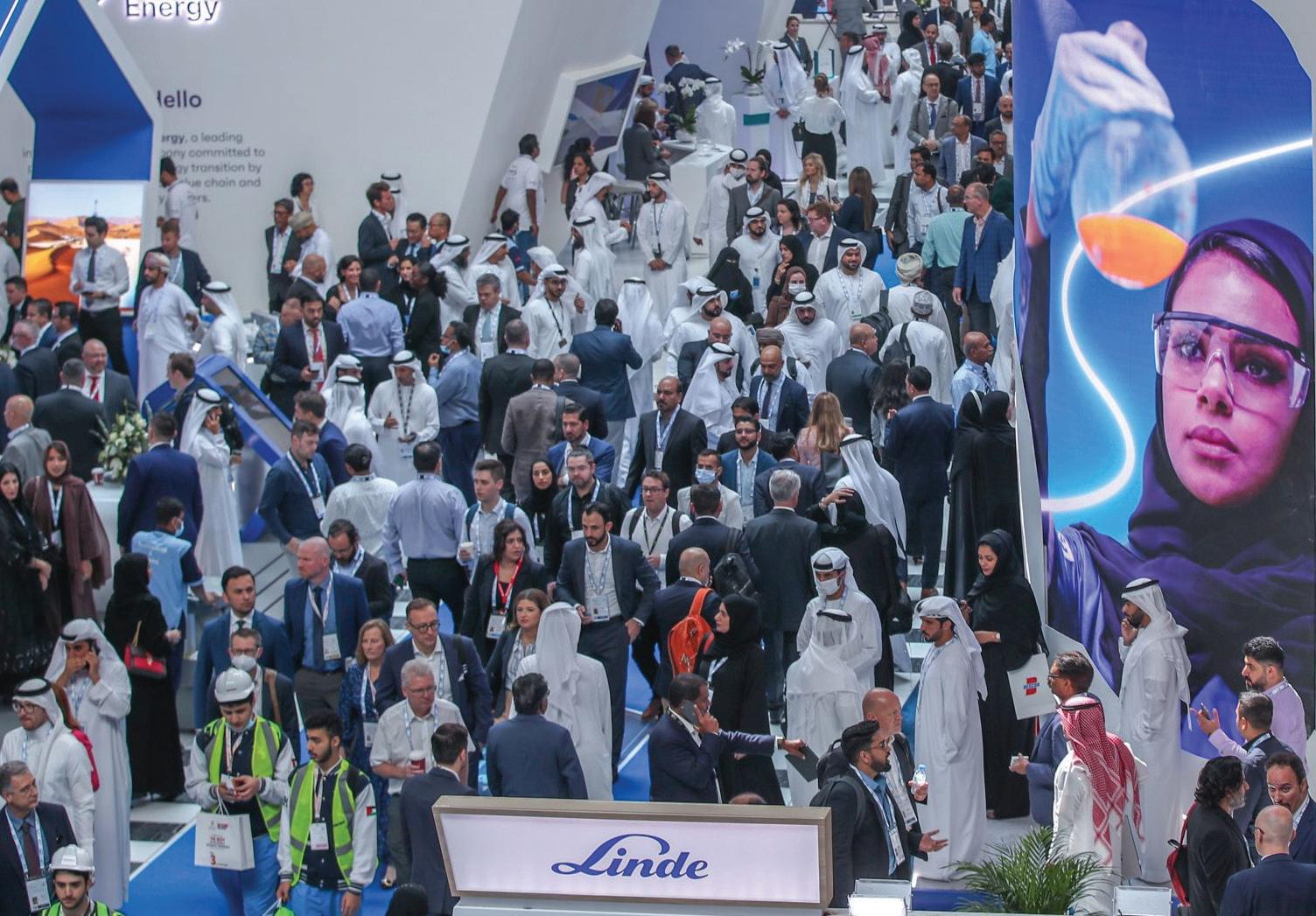
— crucial contributions to the UAE’s clean energy production future.
Across four Youth Innovation Talks at the 11th edition of Young ADIPEC, which is hosted by ADIPEC, several international, regional, and local students engaged with in-depth presentations and Q&A sessions with Khalifa University students. These presentations detailed the process of
how Khalifa University students invented, refined and delivered two highly impactive cleantech innovations such as the novel nanomaterial-enhanced membrane capable of removing oil from wastewater in a sustainable manner, as well as the computational screening method for identifying the best photocatalysts for green hydrogen production.

FROM THE NEWSROOM KU TIMES 25
Students engaged with in-depth presentations and Q&A sessions with Khalifa University students at Young ADIPEC 2023.
Abu Dhabi International Petroleum Exhibition and Conference (ADIPEC) 2023.
SASKATCHEWAN SIGNS LETTERS OF INTENT WITH KHALIFA UNIVERSITY

Multiple Saskatchewan organizations signed letters of intent (LOI) with Khalifa University to jointly explore collaborative projects. The Saskatchewan Research Council (SRC) signed an LOI related to the operation and industrial applications of microreactor technology. The University of Regina and the Petroleum Technology Research Centre (PTRC) also signed an LOI with Khalifa University to move forward a shared commitment to sustainable energy research.
The LOI with SRC lays the framework for a
collaborative and strategic approach to cooperation through various key components including sharing knowledge on microreactors and identifying potential industrial applications for microreactors.
In November 2023, the Government of Saskatchewan announced C$80 million in funding for SRC to pursue licensing and commercial demonstration of an eVinci™ microreactor. SRC will apply the research and knowledge gained from the
deployment of the microreactor to better understand the technology and help pave the way for future microreactor projects.
Khalifa University’s Nuclear Engineering academic program and its Emirates Nuclear Technology Center have made significant contributions to the implementation and operation of the UAE’s sustainable energy research.
The LOI with the University of Regina and PTRC covers a commitment to promoting educational and research collaboration for clean energy technologies, including carbon capture, utilization and storage (CCUS). This partnership moves forward the possibility of reaching NetZero by 2050, a mutual goal for both Saskatchewan and the United Arab Emirates.
Khalifa University’s Petroleum Engineering department ranks 8th in the world by the 2023 Quacquarelli Symonds (QS) World University Rankings by Subject. The Research and Innovation Center on C02 and Hydrogen (RICH) at Khalifa University’s Petroleum Institute already leads in developing novel materials and technologies for CCUS, as well as H2 production, transportation and utilization, and sustainable fuels, as key enabling technologies for energy transition.
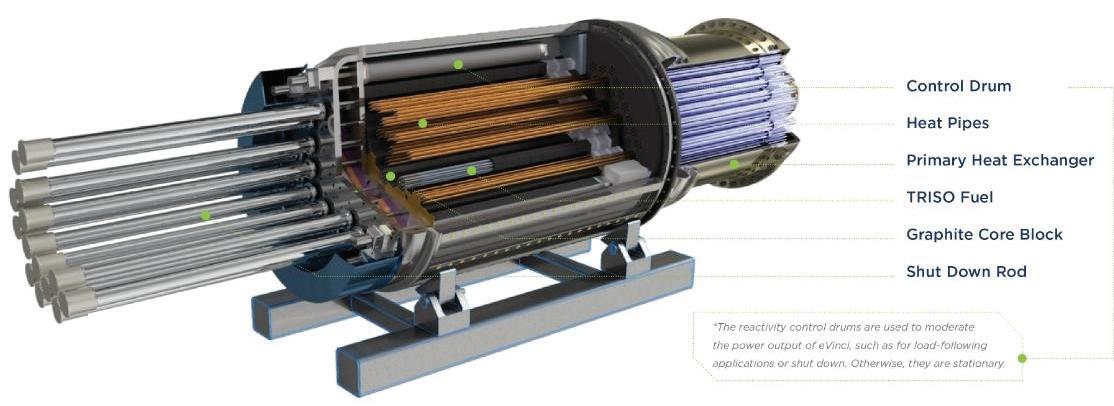
FROM THE NEWSROOM 26 KU TIMES
This international partnership moves forward the possibility of reaching net-zero by 2050, a mutual goal for both Saskatchewan and the UAE.
The Saskatchewan Research Council (SRC) signed an LOI with Khalifa University related to the operation and industrial applications of microreactor technology.
The letter also promotes joint educational activities, including faculty and student exchange programs and internships. This exchange of shared knowledge ensures both universities can create opportunities for their students and faculties alike.
The PTRC is a not-for-profit organization. They use public and private sector funding to conduct research and development and demonstration projects that increase the production of subsurface energy, while also lessening its environmental impact. This includes reducing CO2 emissions through carbon capture and storage, like the Aquistore project, which has 570,000 tonnes of CO2 stored underground, and CO2-enhanced oil recovery (EOR).
PTRC’s awareness of the deep subsurface has also led to new projects including geothermal heating in Regina and Estevan. The letter of intent with Khalifa University will allow both regions to share knowledge about subsurface energy production.
The Aquistore deep saline CO2 storage project is the largest field site in the world for testing new measurement and monitoring technologies to assure the safe storage of carbon dioxide – and PTRC researchers and experts expect to leverage this knowledge from the reservoir that has also helped inform new work in geothermal energy and EOR – with Khalifa University.

KHALIFA UNIVERSITY, TOKAMAK ENERGY GROUNDBREAKING NUCLEAR FUSION TECHNOLOGY
With nuclear fusion technology being a key theme at the COP28 UAE summit, Khalifa University, in collaboration with Tokamak Energy, a UK-based company specializing in nuclear fusion energy generation, showcased the enormous potential of nuclear fusion technology through the UAE’s first-of-its-kind ‘Focus on Fusion’ event.
Through ‘Focus on Fusion,’ Khalifa University and Tokamak Energy enlighten students and stakeholders about the process that fuels the sun and stars, demonstrating how it can be harnessed to generate carbon-free energy right here on Earth.
Other than showcashing fusion energy’s potential as a clean, secure and affordable
source of power for the future, the event highlighted how fusion technology can be an important solution for achieving energy security and combating climate change in the pursuit of a Net Zero world.
The three-day event featured an immersive exhibition that served as a gateway into the world of fusion. Visitors had the opportunity to explore and engage with the cuttingedge technologies driving fusion research and development, while networking and collaborating with various stakeholders in the energy sector.
At the heart of ‘Focus on Fusion,’ Tokamak Energy’s team of leading scientists and engineers took center stage, offering a series of informative lectures on different approaches to achieving commercial fusion, the fundamental physics underlying fusion reactions, and the pivotal role played by new-generation high-temperature superconducting magnet technology in accelerating the progress toward practical fusion power.
Tokamak Energy is a leading global company working collaboratively with both public and private partners around the world to deliver commercial fusion energy by the 2030s.
FROM THE NEWSROOM KU TIMES 27
RECEIVING SWORD OF HONOUR AWARD FROM BRITISH SAFETY COUNCIL
The leading health and safety organization British Safety Council awarded the prestigious Sword of Honour award to Khalifa University, recognizing its exceptional achievements in health, safety, wellbeing, and environmental management.
Michael Robinson, CEO, British Safety Council, presented the award to Dr. Fatima Mohsen Abdulla AlFaqeeh, Manager, Environment Health and Safety, Khalifa University at a ceremony held in London.
This remarkable accomplishment follows Khalifa University's receipt of the British Safety Council's International Safety Awards 2022 with 'distinction,' making it the sole university in the Middle East to be recognized for its unwavering commitment to health, safety, and wellbeing.
When it comes to sustainability, Khalifa University's consistent sustainable efforts and commitment remains evident through its campuses, which actively promote energy and water conservation while engaging stakeholders to adhere to best practices that reduce carbon footprint.
The Environment Health Safety (EHS) and Facility Management Department at Khalifa University is currently implementing 22 initiatives aimed at enhancing energy efficiency, reducing operational costs and carbon emissions, and aligning with the UAE Water Security Strategy 2036 and UAE Energy Strategy 2050. These initiatives include plans to reduce the use of drinking water bottles by 70% through the introduction of self-serving dispensers, increasing the recycling rate from 4% to 30%, and achieving a 3% reduction in energy consumption for 2023 compared to 2022.
Khalifa University has also made significant contributions to research and innovation, obtaining over 290 patents, with more than 60% of them focused on new discoveries and technologies related to sustainability. It has also listed 54 patents in areas such as advanced materials and manufacturing, clean and renewable energy, environment, hydrocarbon exploration and production,
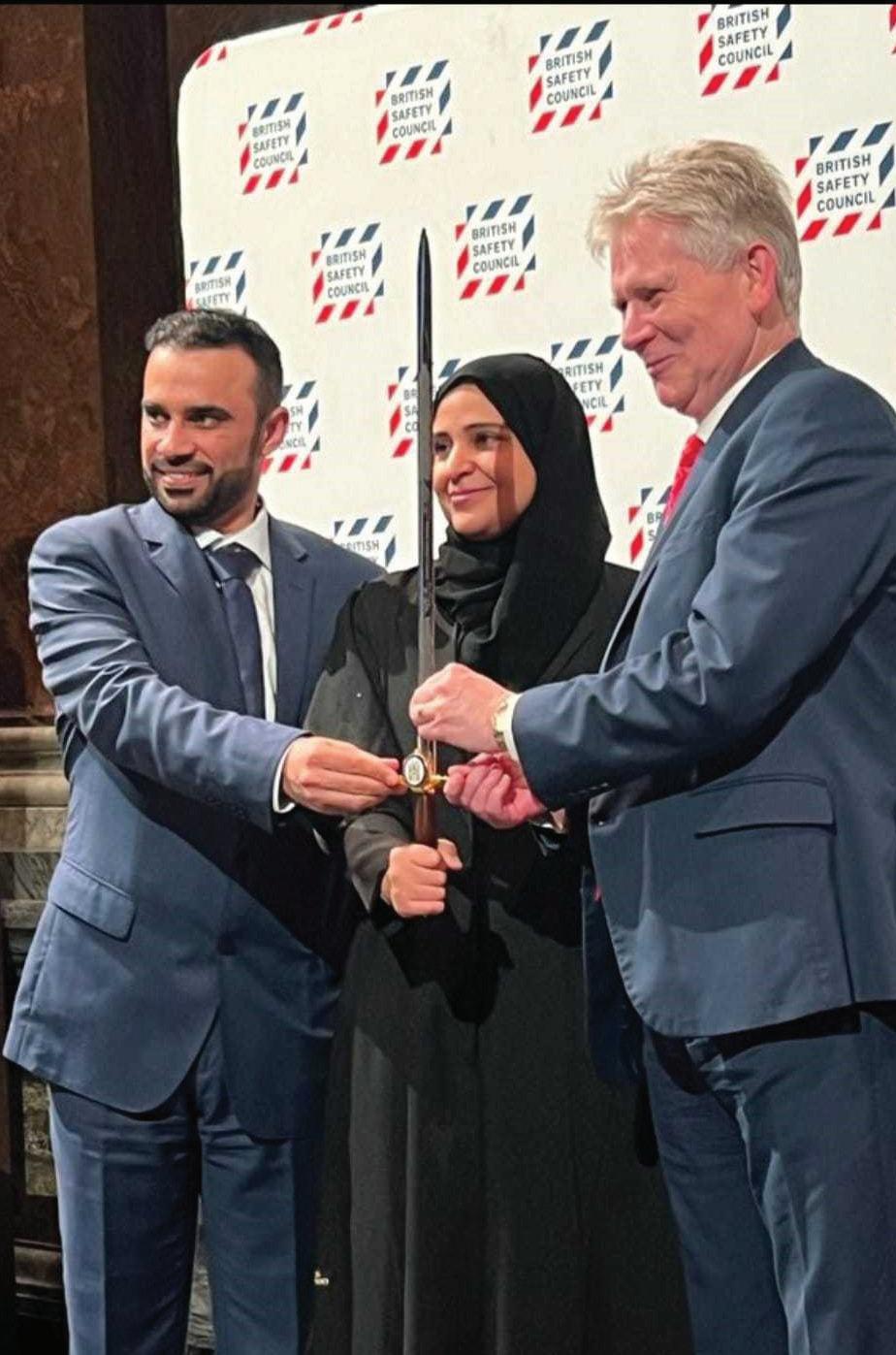
robotics, intelligent systems and data science, sensors, and water and environment.
The University's academic programs play a crucial role in promoting sustainability by imparting knowledge and instilling a spirit of environmental consciousness in students across various disciplines. Its holistic research and academic initiatives tackle strategic, scientific, and industrial challenges faced by the global community, contributing to the development of human and intellectual capital in the UAE.
The decision to apply for the Sword of Honour award stemmed from Khalifa University's unwavering commitment to creating a safe and conducive environment for learning as well as the significant emphasis on the well-being, health, and safety of the university community by Khalifa University leadership, and as directed by the UAE leadership.
FROM THE NEWSROOM 28 KU TIMES
FROM THE NEWSROOM 28 KU TIMES
Khalifa University received the Sword of Honour award from the British Safety Council for achieving a five-star result in health, safety, wellbeing and environmental management. Dr. Fatima Mohsen Abdulla AlFaqeeh, Manager, Environment Health and Safety, accepted the award from Michael Robinson, CEO, British Safety Council, in London.
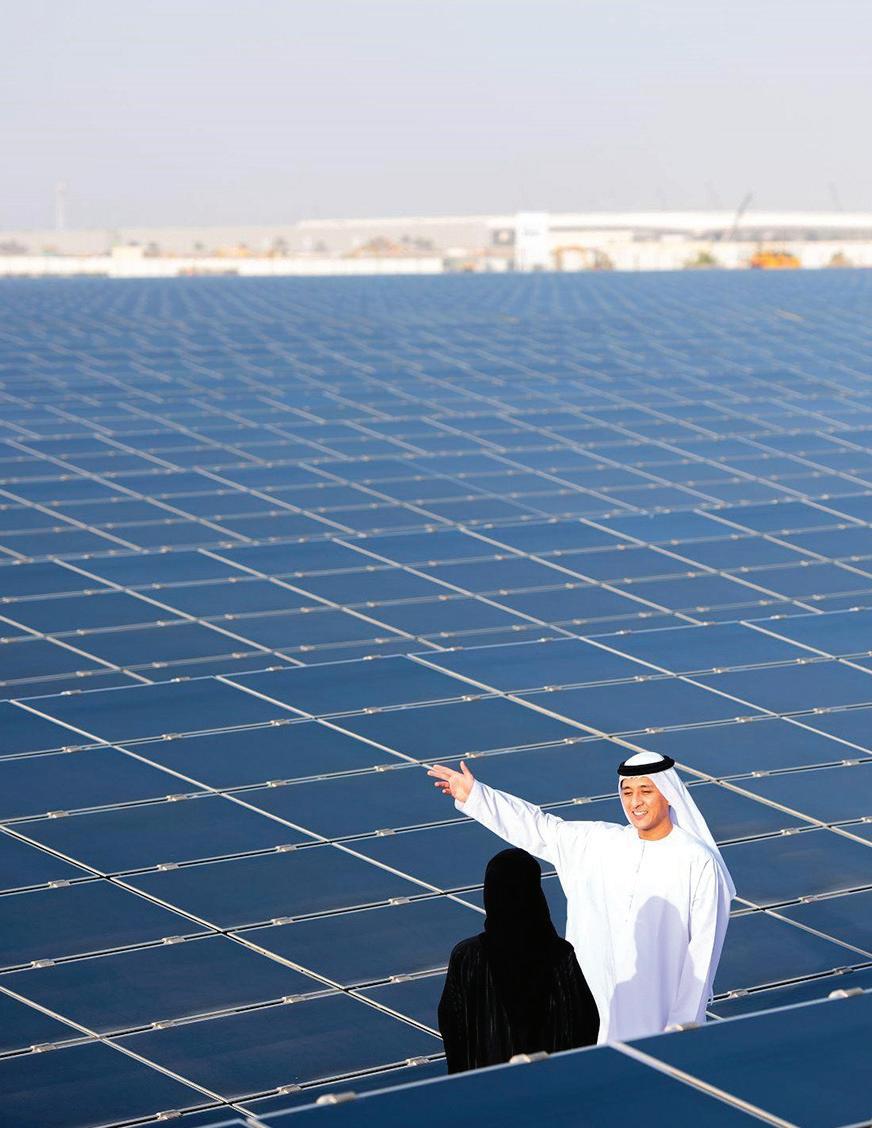
PARTNERING WITH ADNOC TO LAUNCH ‘MINOR IN ENERGY TRANSITION’ PROGRAM
A new academic 'Minor in Energy Transition', aimed at undergraduate students, was launched in collaboration with Abu Dhabi National Oil Company (ADNOC). The program seeks to provide them with a comprehensive understanding of the challenges and opportunities associated with transitioning from conventional fossilbased energy sources to sustainable, low-carbon alternatives.
Designed for students pursuing Engineering and Science majors, the program offers new insights into the changing energy landscape, whilst developing the skills required to navigate the evolving energy industry. The 'Minor in Energy Transition' aligns with the goals outlined in the UAE Energy Strategy 2050 and underscores ADNOC's commitment to equipping young talent in the UAE with the knowledge and expertise needed to build successful careers across the energy sector in the region and beyond.
By focusing on the transition from fossil fuels to cleaner and renewable energy sources, the program aims to enhance energy security by reducing reliance on finite resources and mitigating the carbon footprint.
Students enrolled in the 'Minor in Energy Transition' program will need to complete a minimum of 15 credit hours of coursework. This includes three core courses, worth a total of nine credits, which cover subjects such as Introduction to Energy Transition Management, Energy Policy and Economics, and Innovative LowCarbon Energy Conversion Systems. Students will also have the opportunity to choose two Technical Elective courses from a selection that includes Carbon Capture and Storage, Climate Change Policy and Risk Management, Pollution Prevention and Waste Management, Introduction to Clean Energy Production, as well as Renewable and Sustainable Energy.
KU TIMES 29 FROM THE NEWSROOM
BRINGING ICAR 2023 TO UAE IN COLLABORATION WITH ABU DHABI CONVENTION AND EXHIBITION BUREAU

Four crucial sessions for FORUMs, including a panel discussion to cover the entire gamut of the robotics sectosr, was part of the event
The 21st International Conference on Advanced Robotics (ICAR 2023) is one of the most established robotics conferences that holds great influence over the development of robotics science and it was only natural that Khalifa University, renowned for its expertise in the field, hosted the conference at the Main Campus. Brought to Abu Dhabi with the support of the Abu Dhabi Convention and Exhibition Bureau, ICAR 2023 was technically co-sponsored by the IEEE Robotics and Automation Society.
The conference featured five plenary talks, three workshops, four tutorials, and several forums, oral presentations, and competitions from all areas of robotics, including vision and cognitive, as well as humanoid robots. Four crucial sessions for FORUMs, including a panel discussion to cover the entire gamut of the robotics sector, was part of the event that
attracted a large number of researchers, academics, and industry professionals from across the world.
The opening ceremony of the ICAR 2023 involved Professor Sir John O’ Reilly, President Khalifa University, who gave the welcome speech and Dr. Arif Sultan Al Hammadi, ICAR 2023 General Co-Chair and Vice-President Khalifa University who shared his perspectives on robotics as the UAE General Co-Chair.
The individual sessions of the FORUMs were held at the Khalifa Innovation Center (KIC), a deep-tech incubator located at the Main Campus that supports the commercialization of scientific research through tailored and mentored incubation, nurturing business concepts into successful startups.
Among the four sessions under FORUMs, Dr. Hend Al Tair, Director of Department of Science, Technology and Scientific Research, UAE Ministry of Education, held a session titled ‘Robotics Education in the UAE’, organized in collaboration with the Ministry of Education and Abu Dhabi’s Advanced Technology Research Council (ATRC).
Organized in collaboration with IEEE Women in Engineering (WIE), the panel titled ‘Women in Robotics: challenges and worldwide perspectives’, had three distinguished panelists sharing their experiences and perspectives, and focusing on Diversity, Equity and Inclusion in Robotics. It aimed to educate young generations of engineers and scientists to respect the inclusion of different contributions across genders and cultures in Robotics and Engineering, while identifying the main challenges faced by young professional women and possible useful countermeasures to encourage and increase their ‘retainment’ in the job market. Other forum topics included ‘Robotics in Africa’ and ‘Emerging Impact of Robotics in Industries.’
Keynote speakers included Dr. Giulia De Masi, Technology Innovation Institute (TII), UAE, who shared her perspectives on ‘Smarter Together: Collective Intelligence from Biological Systems to Robotic Systems’ and Dr. Eric Feron, Director of Robotics, Intelligent Systems, and Control (RISC) Laboratory, KAUST, Saudi Arabia, spoke about ‘Robots as Engineered Systems’.
Prof. Cecilia Laschi, Provost’s Chair Professor, National University of Singapore, spoke on Soft Robotics: from pioneering challenges to current achievements and perspectives, and Prof. Paolo Dario, Scuola Superiore Sant’Anna, Pisa, Italy, spoke on Robotics for Sustainable Development.
FROM THE NEWSROOM 30 KU TIMES
Dr. Kostas Alexis, Norwegian University of Science and Technology (NTNU), Norway spoke on ‘Resilient Autonomy in Perceptually-degraded Environments’, and Dr. David Vernon, Carnegie Mellon University Africa, Rwanda, gave a keynote on ‘The Situation Model Framework for Cognitive Behavior: Implications for the Design of Robot Cognitive Architectures’.
Workshops took place on Embodied Neuromorphic AI for Robotic Perception and Culturally Sensitive Social Robots

for All, and Robotics Education in the UAE: Challenges and Opportunities, while oral sessions included Medical Robots, Multi-robot Systems, among others. Tutorials were held on MARUS - Marine Robotics Unity Simulator, Practical Reproducibility of Robotics Source Code, Advancement in Bilateral Teleoperation, and Technologies for Autonomy and their Application to Robotic Surgery. Social events included tours of Khalifa University laboratories, and poster presentations on Aerial Robots, Robot Design and Robot Vision among others.
KHALIFA UNIVERSITY HOSTS AL REYADA ENERGY SEMINAR ORGANIZED BY TOTALENERGIES FOUNDATION IN UAE TO FOCUS ON SUSTAINABILITY AND COP28
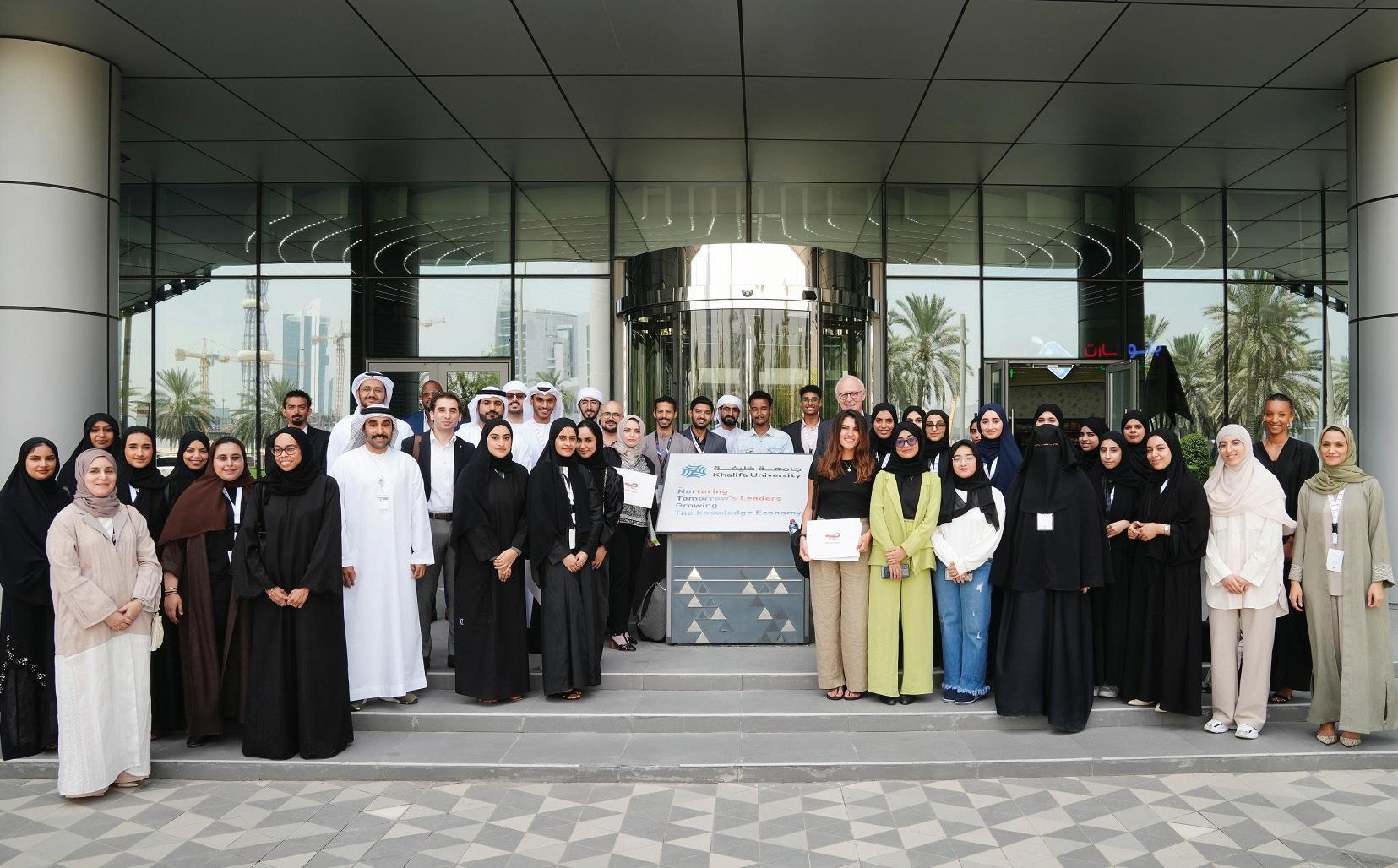
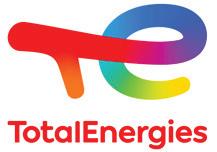
Khalifa University hosted the Al Reyada Energy Seminar (Summer School) 2023, organized by the TotalEnergies Foundation in the UAE. During the seminar, a team led by students from Khalifa University, American University of Sharjah, Zayed University, Sorbonne University, and 42 Abu Dhabi was announced the winner of the Hackathon 2023.
Hosted at the Khalifa University Main Campus under the theme ‘Sustainable Responsibility toward COP28 and beyond’, in coordination with TotalEnergies Professeurs Associés (TPA), the second edition of the Al Reyada Energy seminar brought students from Khalifa University, Zayed University, Sorbonne University, American University of Sharjah, UAE University, Abu Dhabi 42 and Mohamed Bin Zayed University for
Humanities, and provided them with practical knowledge about COP-28 and challenges in sustainability and energy.
More than 60 students participated in the seminar, which featured a range of engaging content including courses, interaction with experts, team-building activities, workshops, and a field trip, in addition to the hackathon that was organized in partnership with Institut Français – all linked to themes aligned with the UAE’s 2023 Year of Sustainability.
‘Sustain A-ride’, the Hackathon’s winning project, was based on carpooling dedicated to reducing the overall CO2 emission within American University of Sharjah (AUS). The
main idea was ride sharing for students via an app that works similar to Uber. However, in this case, the riders and driver will share the price for fuel or electricity, while the driver will have designated space with no parking fees. Support from investors may not be required as the project is expected to be self-sustaining.
The winning team included Robiel Yemane Tekle Tekle, a Khalifa University Chemical Engineering student, Alreem Alshamsi from UAE University, Sarah Qahtan from Zayed University, Habibelrahman Hassan and Faizan Multani from American University of Sharjah, and Abubaker Alseri from Abu Dhabi University.
Among the experts, TPA Professor JeanPierre Cordier shared his knowledge in ‘Alternative Energies and Sustainable Responsibility. Three professionals from TotalEnergies – Magalie Lemaire, Senior Vice-President for Business, Gas, and Planning, Pierre Roman, Head of Projects – Instrumentation and Control, and Norma-Maria Akoury, Legal Manager, – shared their inspiring experience with students. In addition, Dr. Saeed Al Hassan, Associate Professor, Chemical Engineering, Khalifa University, launched the opening dialogue, and Kinza Mishal, Specialist, Energy and Decarbonization, gave a talk on COP28.
During a field trip to 42 Abu Dhabi – an innovative and disruptive coding school – seminar participants were introduced to its novel learning methodology. Students also met Serge Braz, Project Developer Manager, Electricité de France (EDF), who delivered a talk about how EDF calculates its carbon footprint.
FROM THE NEWSROOM 32 KU TIMES
Group photo of the ‘Hackathon’ participants
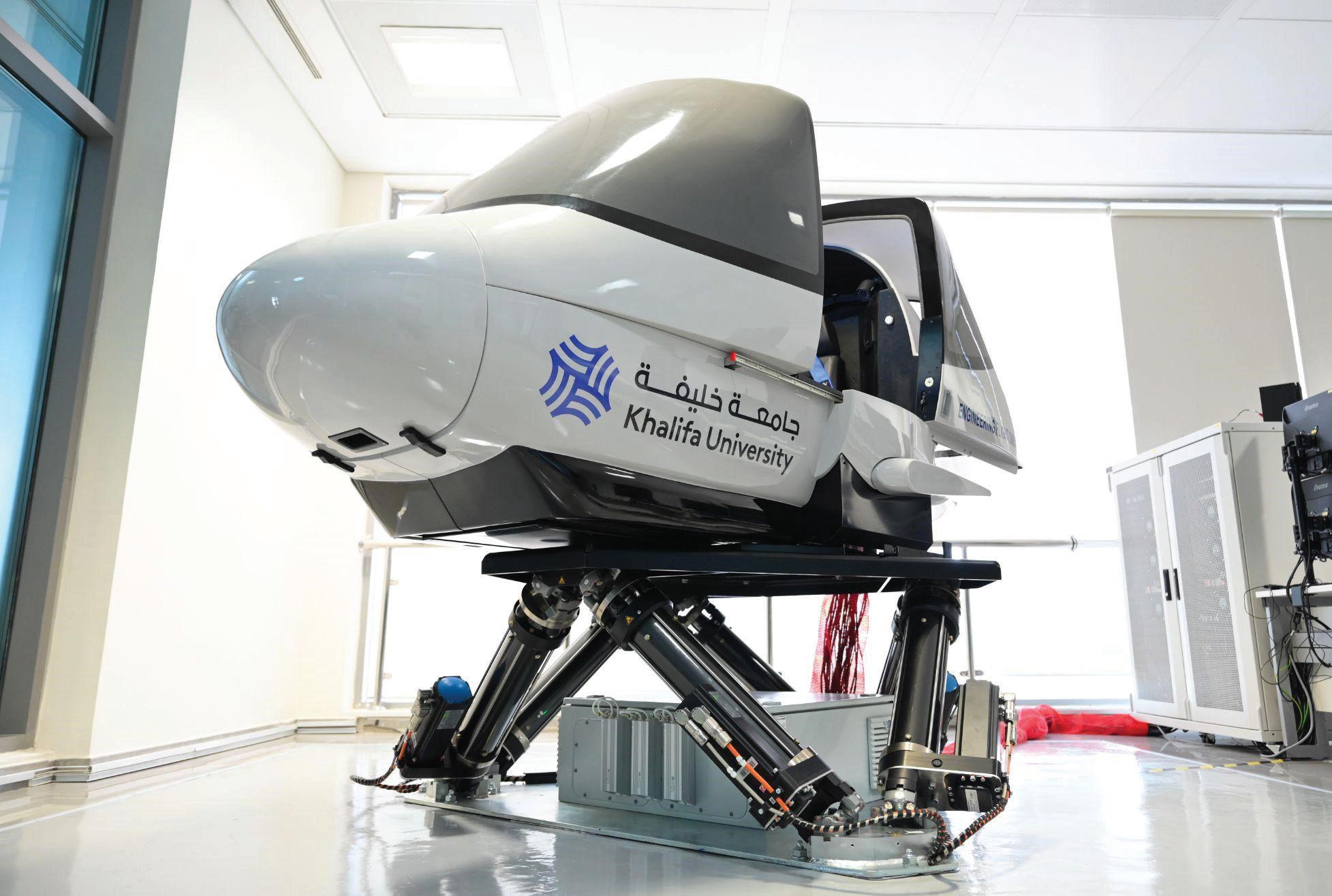
INSTALLING THE BOEING SIMULATOR FOR ENHANCED AEROSPACE ENGINEERING EDUCATION
The installation of a state-of-the-art flight simulator for academic purposes was part of the ongoing collaboration with The Boeing Company to support the Aerospace Engineering curriculum at Khalifa University and strengthen development of the UAE’s human capital in the aviation and aerospace sector. The launch of Boeing’s Immersive Flight Simulator at Khalifa University Main Campus was announced at Dubai Air Show 2023, bringing together aviation enthusiasts and industry stakeholders from around the globe.
The educational flight simulator, a pivotal laboratory facility within Khalifa University’s Aerospace Engineering department, serves as both a familiarization tool for junior undergraduate students, and a study and research facility for senior undergraduate and postgraduate students. The simulator offers full six degrees of freedom and real-time application based on the standard academic equations, while the flight software has a built-in editor for entering aerodynamic geometry and airfoil data.

Students will have the opportunity to learn the latest flight decks of commercial aircraft, which feature fully tactile control panels and flight controls. This hands-on experience will be integrated into multiple courses, exposing students to fundamental and advanced concepts in aircraft operation, airmanship, avionics systems, air navigation, flight dynamics, stability, handling qualities and control, role of human factor in aerospace engineering, and aviation safety.
Khalifa University with support from Boeing earlier opened a 3D-printing composite materials facility and installed other equipment to enhance students’ experience. Furthermore, Boeing funds senior design projects of students and engagements to attract the best talent to study aerospace engineering at Khalifa University..
The flight simulator at Khalifa University is a familiarization tool for junior undergraduate students, and a study and research facility for senior undergraduate and postgraduate students.
FROM THE NEWSROOM
The launch of Boeing’s Immersive Flight Simulator at Khalifa University Main Campus was announced during the Dubai Air Show 2023.
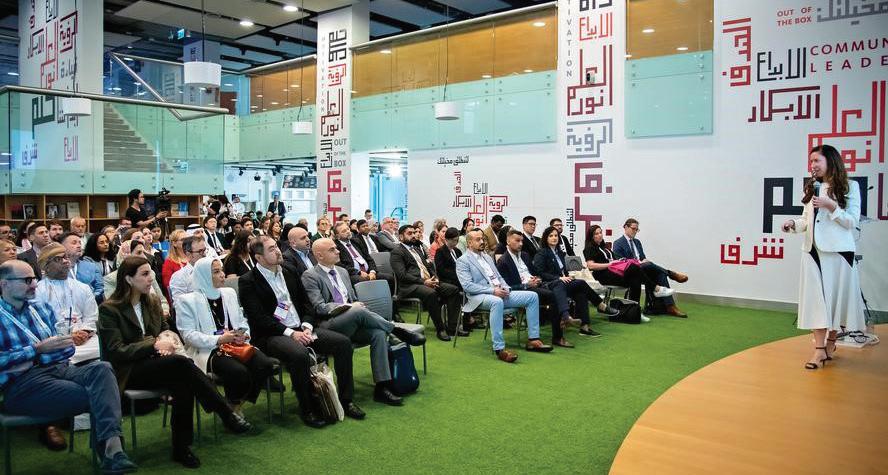
GATHERING VISIONARIES, INNOVATORS, AND EDUCATORS FOR QS REIMAGINE EDUCATION AWARDS AND CONFERENCE 2023
Khalifa University and Quacquarelli Symonds (QS) hosted the 10th edition of the Quacquarelli Symonds (QS) Reimagine Education Awards and Conference 2023 with the aim to shape the future of education.
The three-day hybrid event from was held at the Main Campus and virtually, involved a jury of 50 top experts from institutions across the globe who declared the 2023 Overall Award Winners at a Gala Dinner that concluded the many fireside chats, workshops, and keynote lectures that took place at Khalifa University and online, as part of the conference.
Prof. Dr. Mohamed Yousif Baniyas, Director, Commission for Academic Accreditation (CAA), Ministry of Education, UAE, offered his
perspectives during the event at Khalifa University for a fireside chat with Nunzio Quacquarelli, President, QS, on reimagining the future of education in the UAE and the global future of learning.
By hosting the event, Khalifa University facilitated partnerships between ed-tech companies, universities, schools, and educational non-profits on a global scale, in line with the event’s central theme of reimagining education. Igniting Innovation and Collaboration, Challenging Norms and Driving Transformation, and Reimagining the Future - Students as Change-Makers, Rethinking Education, and Harnessing AI were some of the other themes discussed during the landmark event.
The conference commenced with a speed roundtable that connected startups with potential investors, acting as a launchpad for innovation and collaboration. The attendees engaged in thematic Peer Learning sessions covering topics on teaching and learning, talent development, ed-tech solutions, and sustainability. Shortlisted innovators competing for the Reimagine Education Awards presented their projects in speed presentations across four rooms at Khalifa University, dedicated to the Future of Learning, Universities, Work, and Sustainability. The regional winners of the awards were honored soon after.
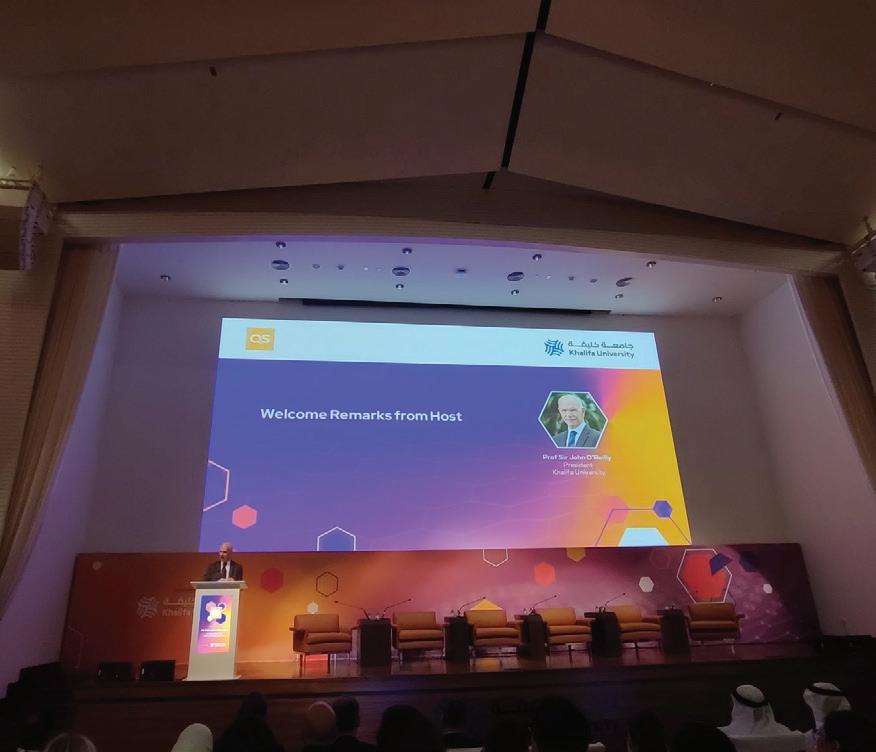
Visionaries gather at Khalifa University to mark the 10th edition of the QS Reimagine Education Awards and Conference 2023, shaping the future of education.
Professor Sir John O’Reilly, Nunzio Quacquarelli, and Professor Jerry Wind, Emeritus Professor, The Wharton School delivered the welcome addresses, whilst Jeff Maggioncalda, CEO, Coursera gave a keynote speech on Generative AI’s ongoing progress in learning. Professor Sir John also participated in a fireside chat with Amy Baker, CEO, The Pie (Professionals in International Education), on shaping the future of higher education.
The event included debates on the relevance of traditional degrees and a panel discussion on The Future of AI in Higher Education that included Dr. Sarah Grant, Interim Executive Director, IDEA Lab, Imperial College Business School and Gabriel Rossi Assistant Dean, Faculty and Curriculum, Yale School of Management on the Future of AI in Higher Education, and others.
Several discussions also explored strategies for unlocking students’ potential to become innovative entrepreneurs and incubating success within university ecosystems. These included a panel on Empowering Gen Alpha: Innovative Learning Models for a Digital Generation with the likes of Monica Ares, Executive Director, IDEA Lab, Imperial College Business School, Audrey Giacomini, Director of Partner Programs, Minerva Project, Anant Agarwal, Founder, edX, Sarah Toms, Chief Learning Officer, IMD, and Viggo Stacey, Editor, The Pie News.
FROM THE NEWSROOM 34 KU TIMES
Visionaries gather at Khalifa University to mark the 10th edition of the QS Reimagine Education Awards and Conference 2023, shaping the future of education.
REGION’S FIRSTOF-ITS-KIND MARINE STUDIES AND RESEARCH FACILITY OPENED IN COLLABORATION WITH STANFORD UNIVERSITY
Following the launch of the Khalifa University Marine Studies and Research Lab - the region’s first-ever advanced robotics research facility equipped with wave and stream generation facilities - Khalifa University’s Center for Autonomous Robotic Systems has partnered with Stanford University’s Center for Autonomous Robotic Systems to explore the use of marine robotics for sustainable ocean ecosystems, including removal of plastics to curb pollution.
The collaboration was part of a Memorandum of Understanding, signed by Professor Sir John
O’Reilly, President, Khalifa University; and Professor Oussama Khatib, Director, Stanford Robotics Laboratory, in the Computer Science Department at Stanford University.
The partnership aimed to facilitate research and development of marine robotics systems to monitor and clean the ocean; and explore deep waters.
Khalifa University’s Marine Studies and Research Lab has a wave generator, flow current generator, tracking systems, and an overhanging (gantrytype) mechanism covering the width of the pool – features that provide a controlled environment for testing robots under adverse underwater conditions of the sea. The OceanOneK robot, designed and built by a Stanford University team led by Dr. Khatib, made its Abu Dhabi debut and demonstrated its capability in retrieving plastic waste in the pool.
The Marine Studies and Research Lab allows for extensive and controlled testing of marine robotic vehicles including underwater,
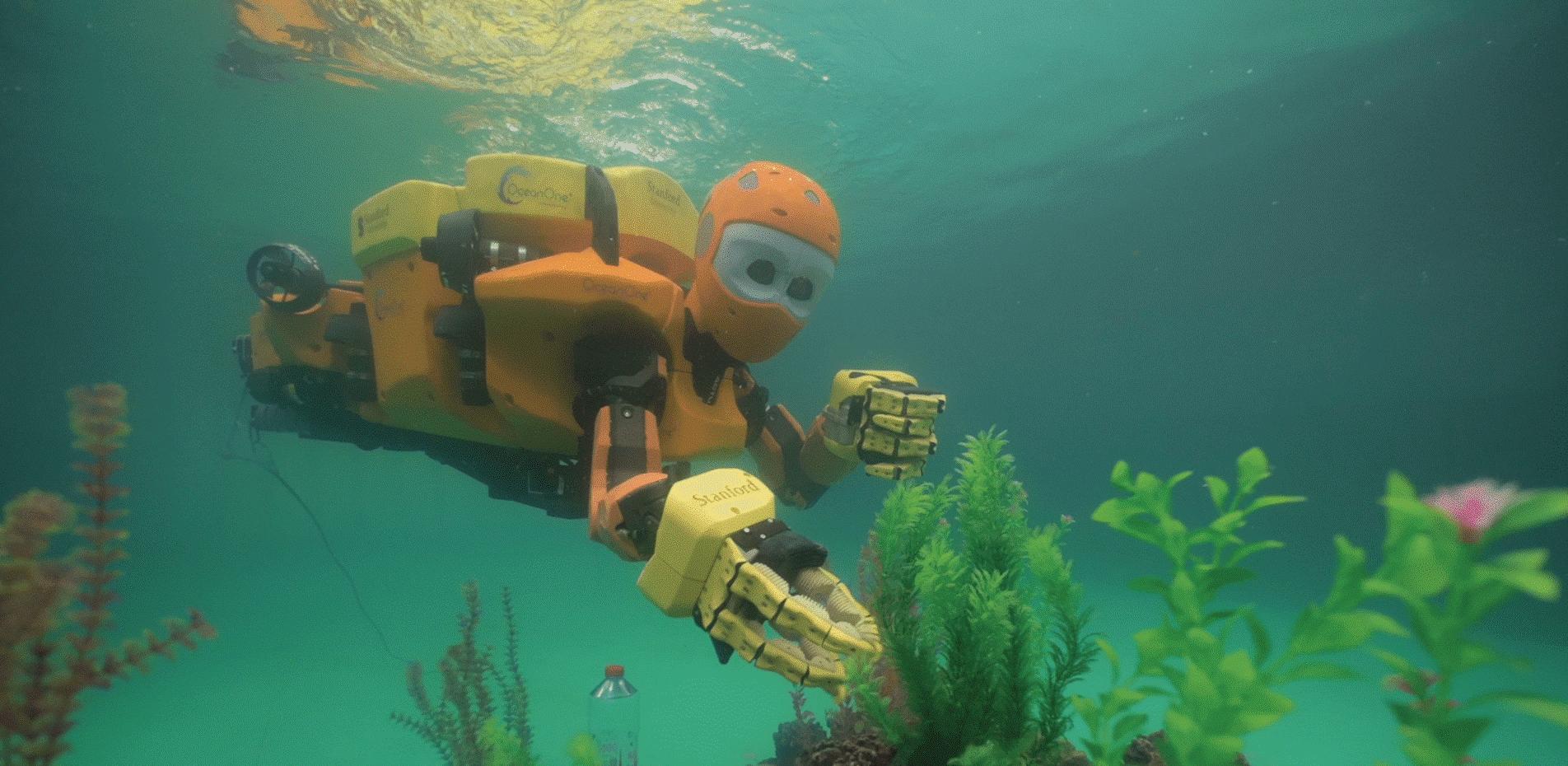

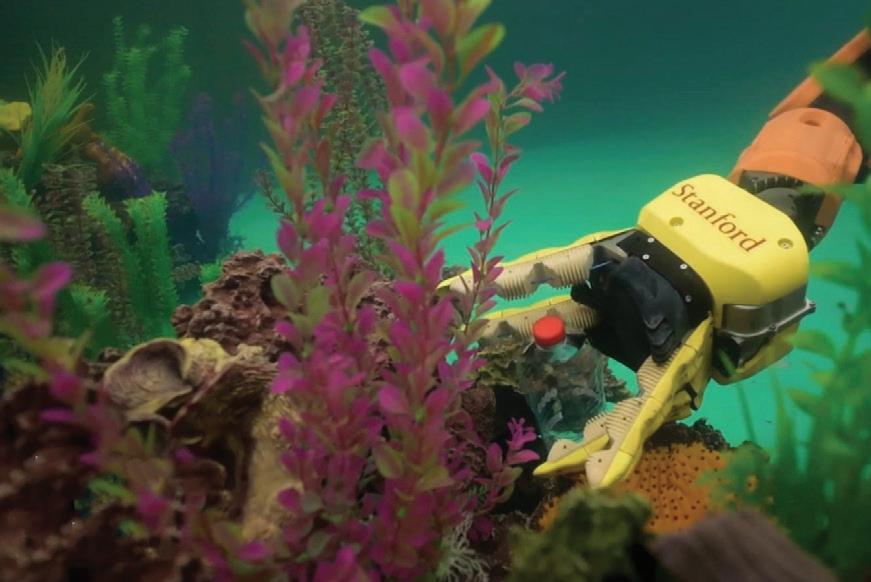

surface, autonomous or remotely tele-operated devices. Potential applications of marine robots include underwater cleaning of plastics, coral reef inspection, and critical infrastructure inspection.
Dr. Arif Sultan Al Hammadi, Vice President, Khalifa University, said: “Khalifa University has always remained at the forefront of research and innovation in the UAE and the region, and we are delighted to enter into this collaboration with Stanford University to further expand the scope of our research in robotics and machine learning to ensure sustainability and cleaner oceans by removing plastics and other pollutants. We believe this collaboration will surely lead to more sustainable solutions that will benefit the UAE and the global community, in ensuring a cleaner environment on planet earth.”
Professor Lakmal Seneviratne, Director, KUCARS, said: “Our researchers are already developing autonomous robots for various land, air and marine applications. In the recent past KUCARS researchers have applied for patents on five innovative robotics solutions for these applications.”
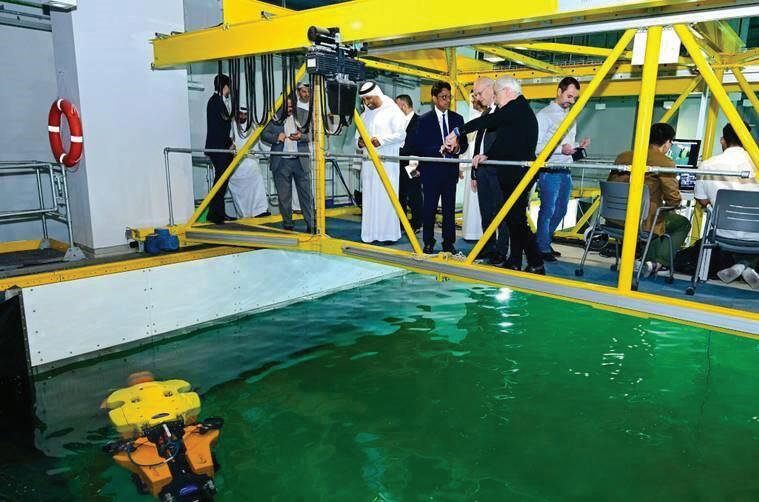
 The unique Ocean One robot in Khalifa University’s Marine Studies and Research Lab’s pool
The robot, controlled by a team on the surface, collects plastic bottles from mock coral reefs placed in a pool.
Ocean One’s robotic arm retrieves plastic from a mock coral reef placed inside the pool.
The unique Ocean One robot in Khalifa University’s Marine Studies and Research Lab’s pool
The robot, controlled by a team on the surface, collects plastic bottles from mock coral reefs placed in a pool.
Ocean One’s robotic arm retrieves plastic from a mock coral reef placed inside the pool.
KU TIMES 35 FROM THE NEWSROOM
Khalifa University Marine Studies and Research Lab - the region’s first-ever advanced robotics research facility equipped with wave and stream generation facilities.
CELEBRATING OUTSTANDING ACHIEVEMENT OF 2023 YFEL MEMBERS
In just 14 years, Khalifa University’s Young Future Energy Leaders (YFEL) outreach program has created a robust 600-strong network of future leaders in alternative energy and sustainability and in the latest edition of the program, the members of the 2023 YFEL received their certificates of completion during a gala ceremony for successfully concluding their year-long schedule of commitments, becoming fully equipped in finding solutions to achieving energy efficiency and tackling climate change.
Launched in 2010 by the UAE President His Highness Sheikh Mohamed bin Zayed Al Nahyan, the YFEL program offers members exceptional and unmatched access to top global leaders, senior business executives, and academics engaged in alternative energy and sustainability. Members of Khalifa University leadership, sponsors of the 2023 YFEL program, as well as dignitaries, and guests were present at the ceremony.
The certificates of completion were presented to the 2023 YFEL members which includes UAE Nationals, locally-based students and professionals, as well as international young professionals from 11 countries. Also present were the 2024 YFEL members, for whom the occasion served as an ‘orientation’ ceremony. They include UAE Nationals among whom were young professionals, and international and locallybased students.
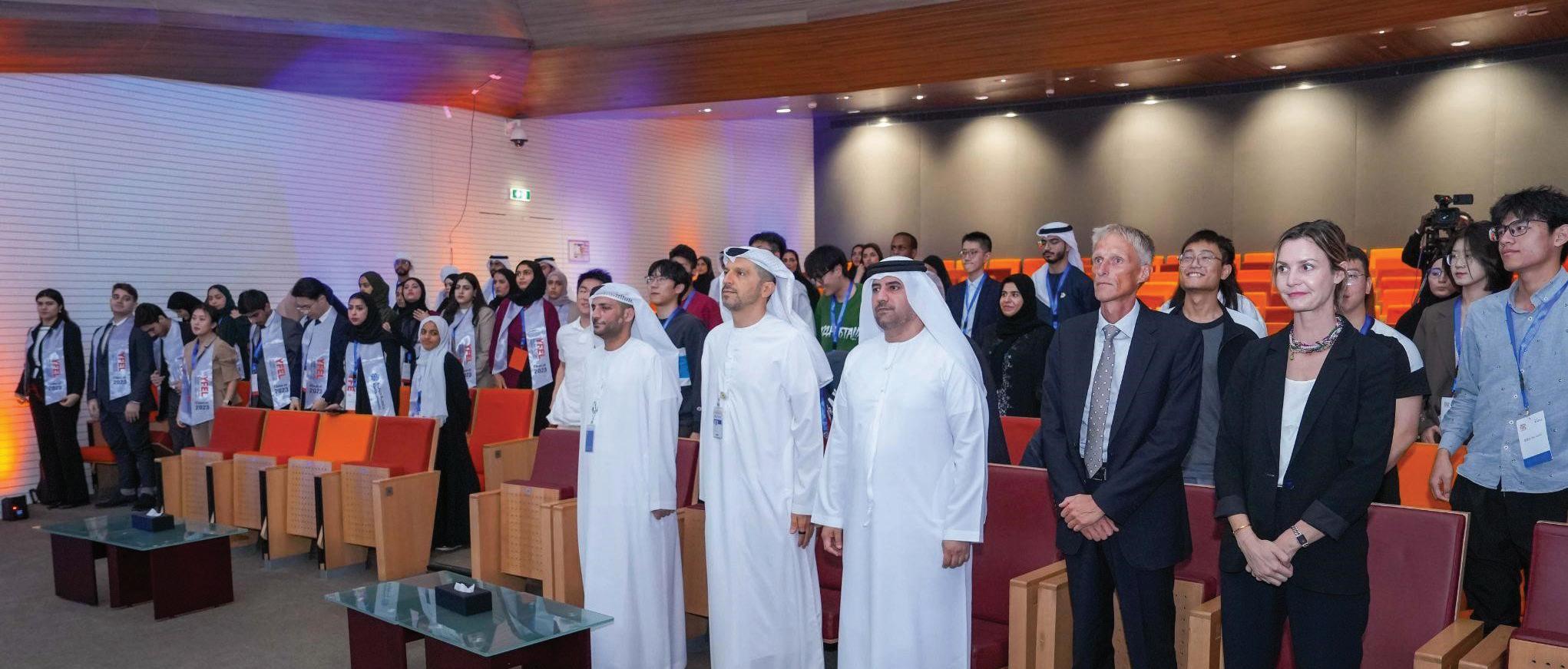
Throughout the year, the 2023 YFEL members undertook projects aligned with their annual commitments, focusing on critical areas such as green hydrogen production, biowaste-to-fuel solutions for transportation in rural communities, 2D materials for hydrogen storage, real-time non-destructive early assessment of date fruit, improving photovoltaic (PV) panels performance, swappable battery system for sustainability, combined heat and power systems for hydrogen production, and many more.
In addition to their projects, the 2023 YFEL members attended a series of workshops and lectures on Leadership, Battery Tech, Sustainable Catalysis, Space Mining, Waste Energy, Robotics, and Energy Harvesting. These sessions provided invaluable insights and expertise from industry professionals, further
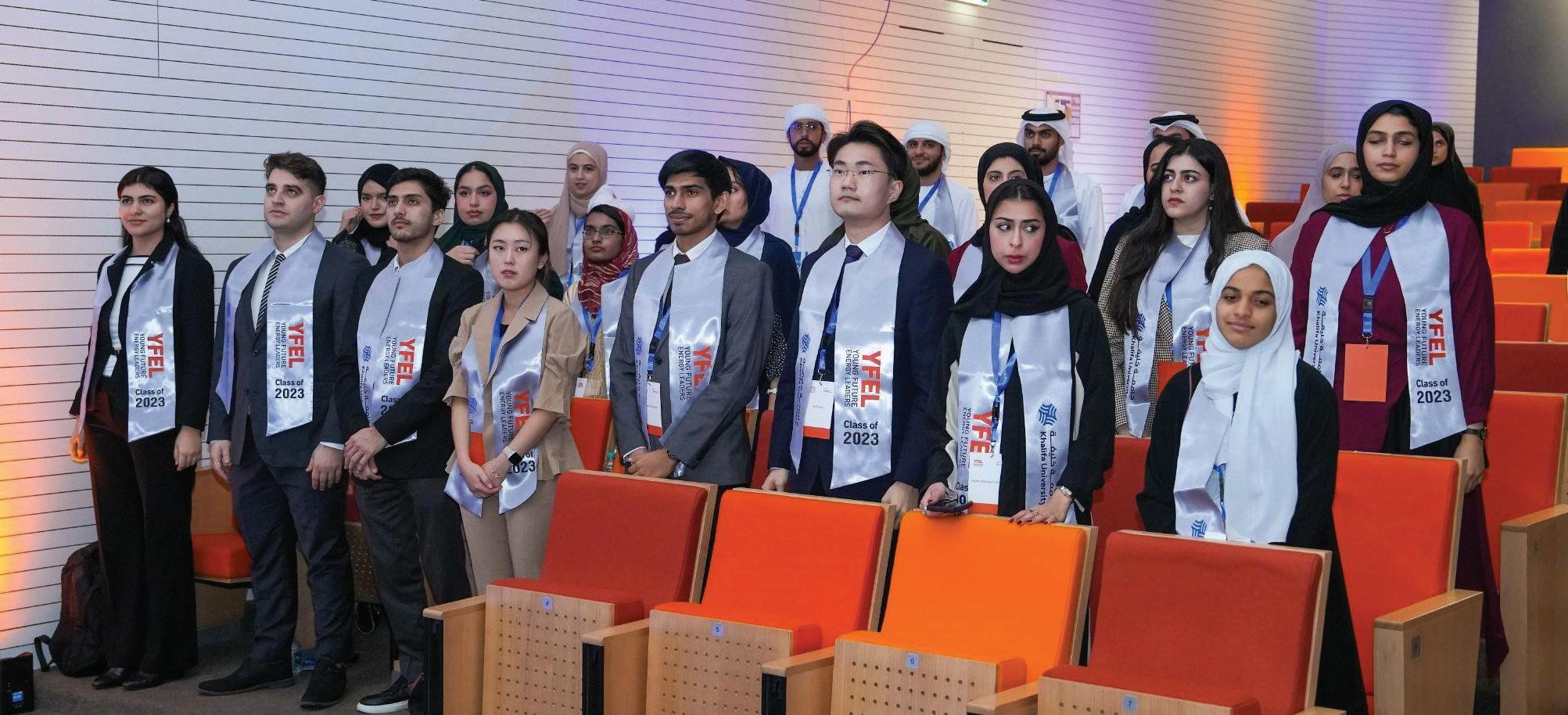
enriching the YFEL members’ understanding of cutting-edge technologies and sustainable practices.
The YFEL program also encouraged active engagement with the industry through the German Emirati Sustainability Days, a weeklong event held in collaboration with partners such as German Emirati Joint Council for Industry and Commerce - AHK, and others. This initiative facilitated knowledge-sharing and fostered important connections between the YFEL members and leading industry stakeholders.
Over the years, the YFEL program has received support from community leaders and UAE-based corporate sponsors. Notable among them were Emirati philanthropists His Excellency Mohammed bin Kardous Al Ameri, and His Excellency Sultan bin Rashed Al Dhaheri.
As part of the program, some of the 2023 YFEL members took part in a case study competition, focusing on Charging Infrastructure for Electric Trucks, resulting in 11 winners, who addressed crucial challenges in sustainable transportation. Furthermore, Sultan Bader AlBahri, a YFEL member, received Dubai Electricity and Water Authority’s (DEWA) Nujoom Youth Employee Award for outstanding contributions to advancing sustainability initiatives.
FROM THE NEWSROOM 36 KU TIMES
2023 YFEL members include UAE Nationals, locally-based students and professionals, as well as international young professionals from 11 countries.
2023 YFEL Graduation Ceremony at Khalifa University Main Campus also welcomed the 2024 YFEL cohort.
YFEL JOURNEYS
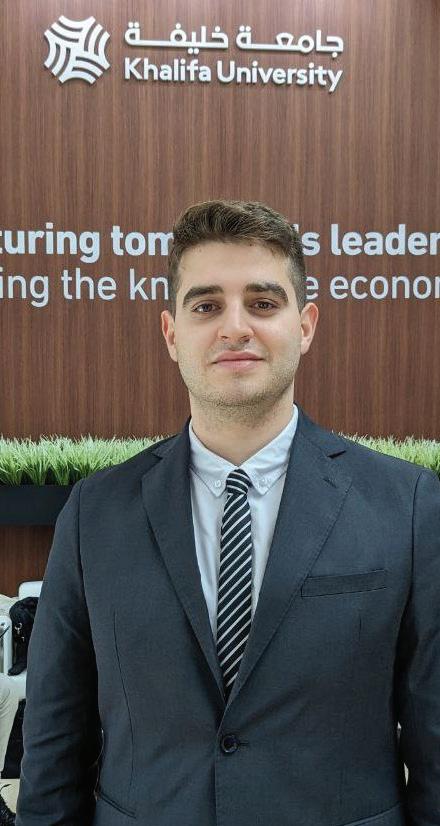
Gianluca Di Bella, a member of Khalifa University's 2023 YFEL program from Italy, shares his experience:
“This year I had the privilege to attend the Young Future Energy Leader Program offered by Khalifa university of Science and Technology in Abu Dhabi.
Thanks to this program, I had the opportunity to deepen my knowledge on the topic that I am passionate about and that brings me the will to become an expert in the energy sector.
And thanks to several technical sessions, projects and conferences, I have widened my horizon and network in this fundamental sector, essential for us and the future of our planet.
During this year, I have worked with colleagues from across the world on the “Swappable Battery System for Sustainable and Efficient Electric Vehicles” project. This helped me to immerse myself into a new topic and address a more practical and direct use of energy, while having the opportunity to appreciate people from different cultures working together and demonstrate how diversity can still unite us and increase results.
Since I have a Master's degree in Energy Engineering from Politecnico Di Milano, my plan is to have a long and successful career in this field, and I am confident that the skills developed during this one-year project through the YFEL program will prove to be the key to my professional growth.”
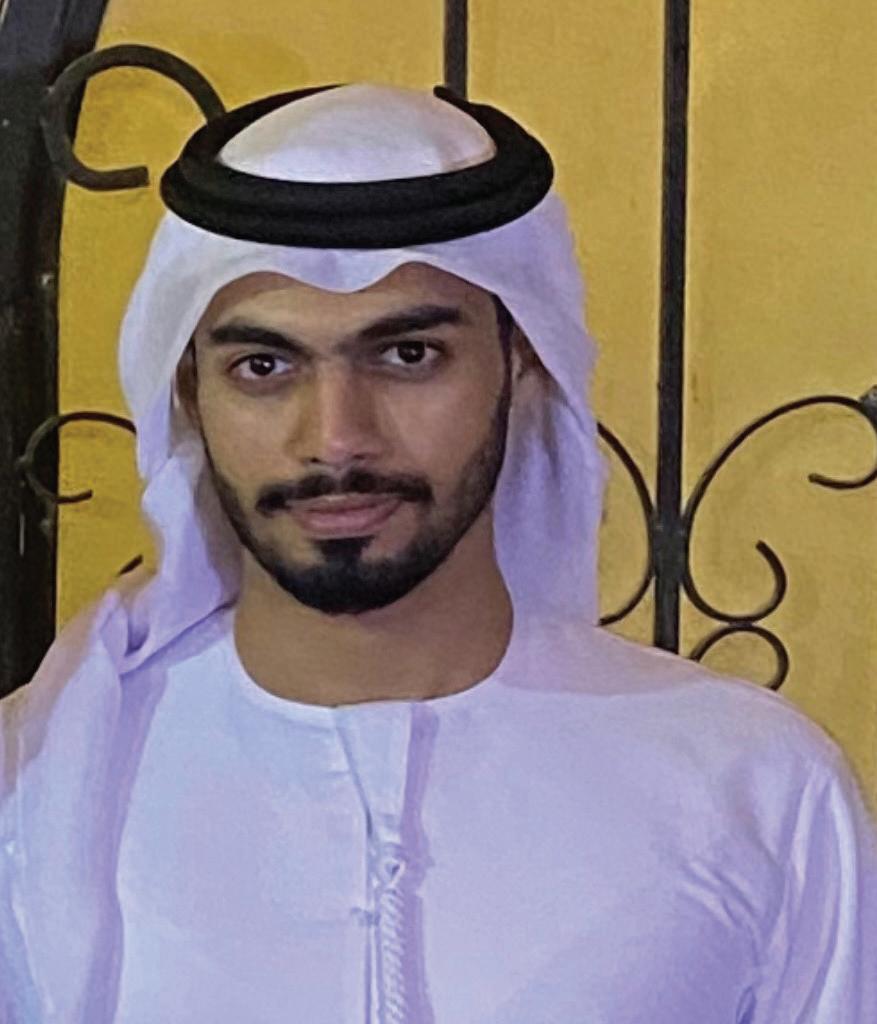
“The Young Future Energy Leaders (YFEL) program has been a transformative journey, nurturing both my personal and professional growth. It has provided me with a unique platform to engage with sustainability in a holistic manner, blending diverse perspectives and forging invaluable connections with other YFEL members. Through my participation in the program, I had the privilege to work on two significant projects. The first project focused on improving solar panel efficiency, delving into cutting-edge materials and design innovations to harness the power of renewable energy to combat climate change.
The second project was dedicated to enhancing electrical truck infrastructure, addressing the pressing need for sustainable transportation solutions and expanding charging networks.
Going forward, my passion for sustainability continues to guide my path. I plan to leverage the knowledge and experiences gained through the YFEL program to pursue a career in sustainable urban planning and advocate for more inclusive, and ecofriendly policies.
Abdulrahman Rashid Khalifa Albuflaseh, Emirati Engineer, Mechanical Maintenance, Water and Civil - Metering and EquipmentDubai Electricity and Water Authority (DEWA), shares this experience:
The YFEL program has equipped me with the necessary tools to drive change, emphasizing the crucial role of sustainability in shaping a brighter and more equitable future for all.”
FROM THE NEWSROOM KU TIMES 37
KU TIMES 37
SPEARHEADING AVIATION INDUSTRY INNOVATION WITH SANAD AND LUFTHANSA TECHNIK MIDDLE EAST
Khalifa University, in collaboration with Sanad, a global aerospace engineering and leasing solutions leader wholly owned by Abu Dhabi’s Mubadala Investment Company , and Lufthansa Technik Middle East (LTME), provider of maintenance, repair and overhaul (MRO) services, announced the development of cutting-edge digital solutions poised to transform components repair turnaround time (TAT).
This technological leap, by Sanad and LTME, has been further enriched through the dedicated team of researchers at Khalifa University’s Advanced Research and Innovation Center (ARIC), a collaboration between Mubadala and Khalifa University. It signifies a pivotal moment in the aviation industry, leveraging the power of Artificial Intelligence (AI), Internet of Things (IoT), 3D imaging, and the innovative AVIATAR platform. Collectively, their mission is to reduce a minimum of 10 days from the traditional 30-day turnaround time for component repair. At the core of their innovative approach lies the streamlining of preliminary inspections driven by an innovative AI-based tool developed by Khalifa University researchers.
With technical guidance from the Sanad R&D team, the research team at Khalifa University’s ARIC, including 10 UAE National undergraduate students, a PhD researcher, three research engineers, and two faculty members, developed the automated chord measurement system that utilizes laser profiling and robotic technologies for aerospace MRO operations. ARIC’s advanced AI-based visual inspection of aero-engine blades promises to reduce human error and expedite the time-consuming process associated with current manual inspections, thereby elevating precision, efficiency, and safety in chord measurements and blade inspections within aerospace MRO operations.
Khalifa University’s revolutionary tool automatically generates a comprehensive digital inspection report that encompasses all relevant preliminary inspection details. Seamless sharing of this inspection report is facilitated through a secure digital connectivity platform, built upon Lufthansa Technik’s AVIATAR Management platform, enabling real-time defect detection using laser calibration and robot arms.
This collaboration marks another stride by Khalifa University in its contribution to developing advanced technology components for the aerospace sector and building human capital in the UAE. The synergy between LTME and SANAD is set to empower LTME to enhance the overall value they deliver to their partners while simultaneously supporting SANAD in minimizing downtime.
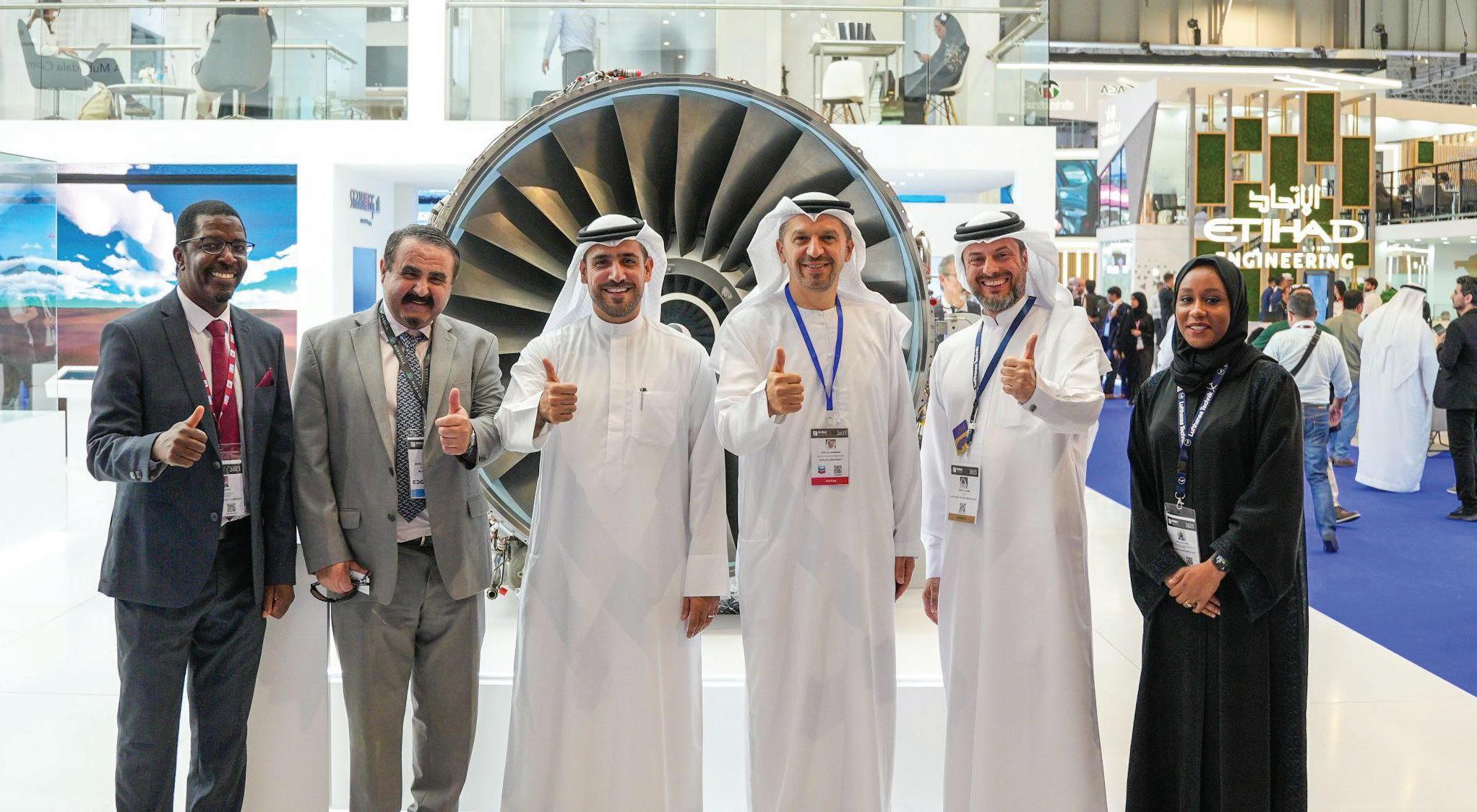
FROM THE NEWSROOM 38 KU TIMES
This technological leap, by Sanad and LTME, has been further enriched through the dedicated team of researchers at Khalifa University’s Advanced Research and Innovation Center (ARIC).
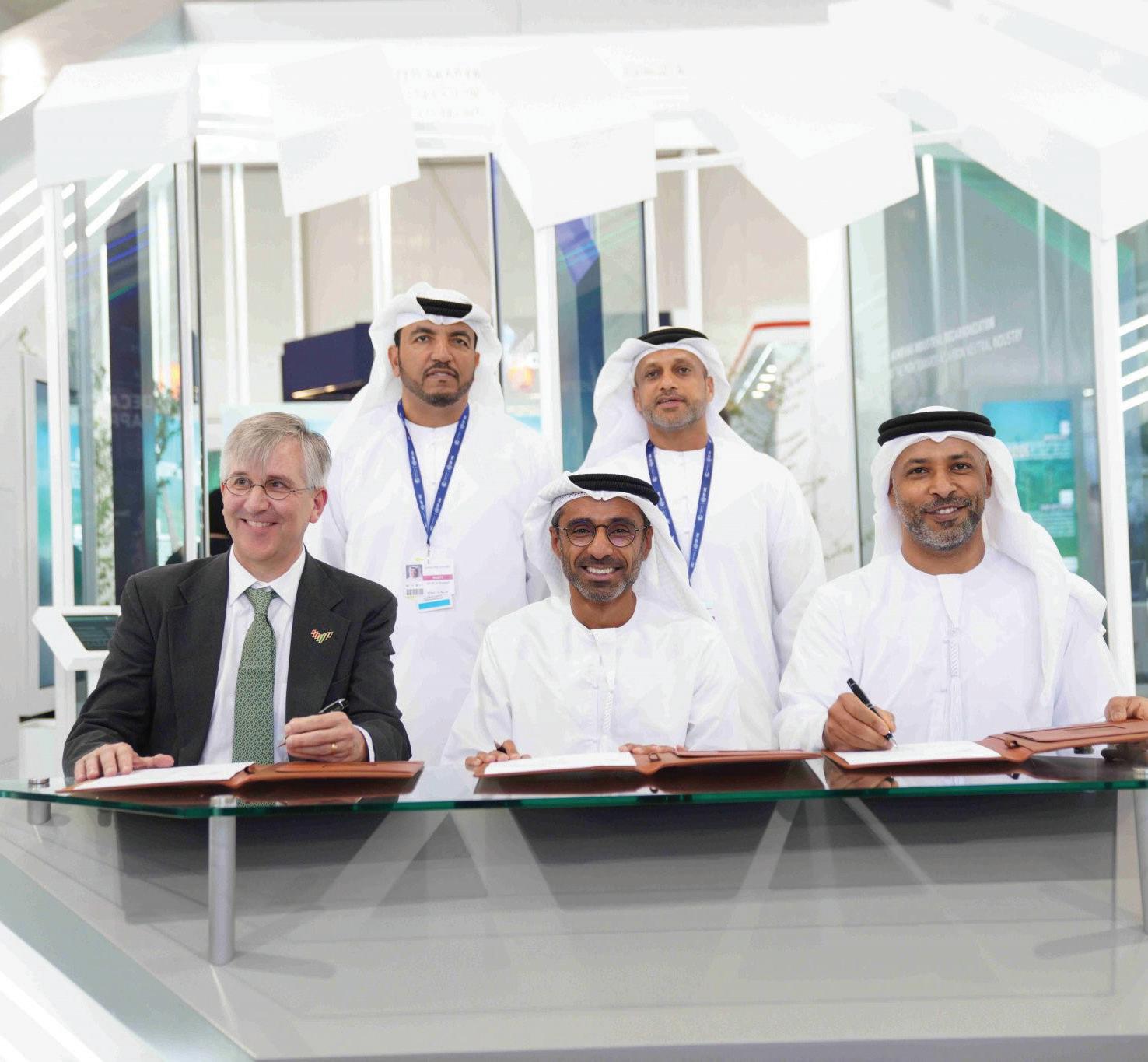
COLLABORATING WITH EMIRATES
STEEL ARKAN, OHMIUM INTERNATIONAL TO DRIVE GREEN HYDROGEN ADOPTION IN THE STEEL SECTOR
In a significant move towards decarbonization and the adoption of clean energy, Emirates Steel Arkan (ESA), Ohmium International, and Khalifa University signed a Memorandum of Understanding (MOU) to accelerate the integration of green hydrogen as a clean
energy source in the steel sector, contributing to the UAE's low-carbon transformation goals.
The partnership aimed to develop cleaner production methods for steel products and advance sustainable construction practices. The agreement is in line with the UAE National Strategy for Industry and Advanced Technology, which aims to decarbonize hard-to-abate sectors while increasing the competitiveness of national industries. The strategy also supports the UAE Net Zero by 2050 strategic initiative as well as the country’s economic diversification plans.
The signing ceremony took place at the Ministry of Industry and Advanced Technology (MoIAT) pavilion in the Green Zone at COP28 UAE with attendance from His Excellency Omar
Al Suwaidi, Undersecretary, UAE Ministry of Industry and Advanced Technology, Eng. Saeed Al Ghafri, CEO, Emirates Steel, H.E. Eng. Saeed Ghumran Al Remeithi, Group CEO, Arkan and CEO, Emirates Steel, Dr. Ebrahim Al-Hajri, Senior Vice-President, Support Services, Khalifa University, and Arne Ballantine, CEO and Co-Founder, Ohmium International.
The collaboration, under MoIAT’s ‘Make it in the Emirates’ initiative, aims to deliver a comprehensive research and development program to help accelerate the uptake of green hydrogen, a clean energy source across the steel sector, ultimately enabling ESA to be among the leading manufacturers of green steel, marking a significant and shared commitment to promoting sustainable practices and reducing the sector's environmental impact.
The collaboration aims to optimize the use of advanced power electronics at Khalifa University Advanced Power and Energy Center’s (APEC) laboratories for the application of green hydrogen in the production of Direct Reduced Iron (DRI). This optimization is crucial for facilitating the seamless integration of green hydrogen into the steel production process. The MOU also highlights Ohmium's advanced power electronics capabilities to optimize the power grid within a steel plant, ensuring efficient and reliable energy supply.
This latest MOU builds upon the previous collaboration between Khalifa University and Emirates Steel, which established a formal framework for joint research projects, professional training programs, technical consultations, and student internships at Emirates Steel premises.
FROM THE NEWSROOM KU TIMES 39
Back left to right: His Excellency, Omar Ahmed Suwaina Al Suwaidi, Undersecretary, UAE Ministry of Industry and Advanced Technology, and Group CEO, Emirates Steel Arkan, H.E. Eng Saeed Ghumran Al Remeithi. Front left to right: Arne Ballantine, CEO, Ohmium International, Eng. Saeed Al Ghafri, CEO, Emirates Steel, and Dr. Ebrahim Al-Hajri, Senior Vice-President, Support Services, Khalifa University.

HOSTING
THE
REGION’S FIRSTEVER HEALTHY AGING AND PRECISION MEDICINE CONFERENCE
Khalifa University hosted the highly anticipated Two-day Healthy Aging and Precision Medicine Conference 2023 at the Main Campus, bringing together renowned experts and professionals to discuss advancements and strategies in promoting healthy aging and precision medicine.
The conference featured a diverse range of speakers and engaging discussions with a welcoming ceremony beginning with the attendance of His Excellency Dr. Mugheer Al Khalili, Chairman, Department of Community Development..
Dr. Arif Sultan Al Hammadi, Executive VicePresident, Khalifa University, delivered the welcome speech, followed by Her Excellency
Dr. Asma Al Mannaie, Executive Director, Research and Innovation - Department of Health, who also extended her welcome remarks. Professor Dr. Habiba Alsafar, Dean, College of Medical and Health Sciences (CMHS), and Professor Saleh Ibrahim, Associate Dean of Research CMHS, also provided their welcome remarks.
The conference featured a panel discussion on pioneering public health strategies and social policies for healthy aging and longevity, moderated by Dr. Saleh Ibrahim. The panel included experts such as Dr. Mohammed Al Ameri from the Abu Dhabi Department of Health, Dr. Manal Taryam, CEO, NoorDubai Foundation, Dr. Peter Mills, Director, PHG Institute at Cambridge, Dr. Natasha Ridge, Executive Director, Sheikh Saud bin Saqr Al Qasimi Foundation for Policy Research, Dr. Thana Alyafei, Chair, Department of Medicine at Sheikh Khalifa Medical City, and Dr. Erik Koornneef, Director, Research and Innovation at Abu Dhabi Healthcare Company SEHA.
In addition, there was a Poster Viewing session focused on the themes of healthy aging, Genomics Precision Medicine and
Precision Prevention, and Social and Public Health Policy. Attendees had the opportunity to explore the latest research and initiatives in these areas.
The conference also featured Professor Moustapha Kassem from the University of Southern Denmark, who delivered a presentation on osteoblast cellular senescence and approaches for cellular rejuvenation. Dr. Nadir Kadri from the Karolinska Institutet discussed the role of mesenchymal stromal cells in modulating the immune system during aging. Dr. Abigail Langton from the University of Manchester provided a global perspective on skin aging.
Other notable speakers included Professor Mohamed Seghier from Khalifa University, who shared insights on brain health and healthy aging from a neuroimaging perspective. Professor Sherif Elkhamisy from the University of Sheffield delivered a presentation on breaking and sealing the human genome. Dr. John McDermott from the University of Manchester discussed implementing pharmacogenomics across the NHS. Professor Inken Wohlers from the Research Center Bostel spoke on biomolecular data analyses towards precision medicine for pneumology. Dr. Youssef Idaghadour from NYU Abu Dhabi presented on the UAE Future Health Study.
The impressive lineup of speakers also included Dr. Peter Mills from the PHG Institute at Cambridge, who discussed the normative context for personalized public health. Dr. MoezAllslam Ezzat from Sharjah University spoke about the interplay between caloric restriction, intermittent fasting, and healthy aging. Dr. Erik Koornneef from SEHA shared current and future trends in precision medicine from a research and innovation perspective. Lastly, Dr. Kheirat Habbal from Khalifa University presented on the BALSAM Community Health Program.
40 KU TIMES
Discussions on advancements and strategies in promoting healthy aging and precision medicine.
INAUGURATING REGION’S FIRST CLINICAL GENOMIC MEDICINE AND GENETIC COUNSELING PROGRAM

Khalifa University collaborated with the Department of Health (DoH) – Abu Dhabi and Harvard Medical School to inaugurate the Clinical Genomic Medicine and Genetic Counseling program at KU Main Campus to equip healthcare professionals with the necessary skills to address genetic and genomic challenges in a clinical setting.
The six-month course includes 55 lectures by experts from Harvard Medical School Teaching Hospitals and Khalifa University faculty and it is being offered in the region for the first time by DoH Abu Dhabi in partnership
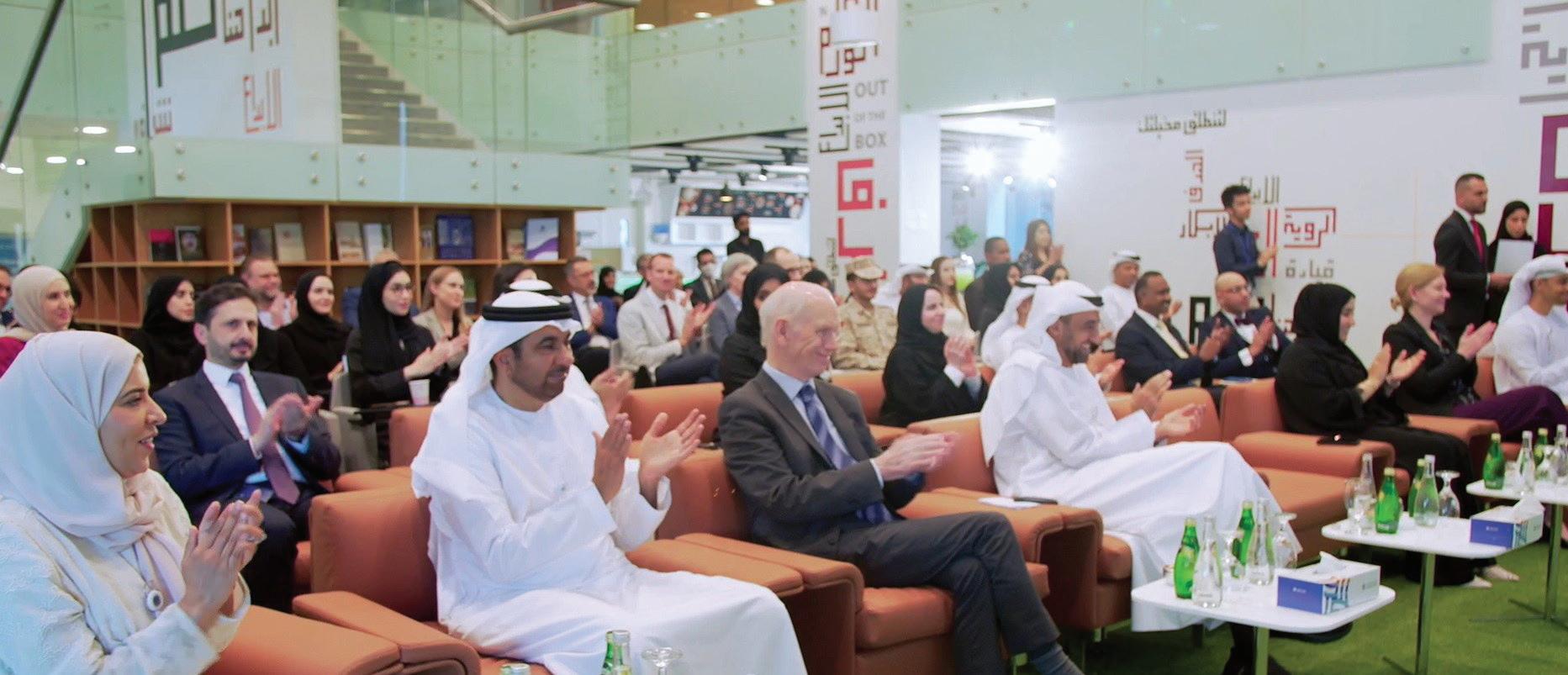
His Excellency Mansoor Almansoori, Chairman, Department of Health – Abu Dhabi, Professor Sir John O’Reilly, President, Khalifa University, and His Excellency Homaid Al Shimmari, ViceChairman of the Board of Trustees of Khalifa University attended the inaugural ceremony that also featured a video message from Dr. Robert S. D. Higgins, President, Harvard Medical School Teaching Hospital – Brigham and Women’s Hospital, and Executive VicePresident at Massachusetts General Hospital (MGH), Brigham. Dr. Maureen Flynn, Chair and Associate Professor, Director, MS in Genetic Counseling, Massachusetts General Hospital (MGH) Institute of Health Professions, affiliated with Harvard Medical School also shared her message via video. After a panel discussion on ‘Clinical Genomic Medicine and Genetic Counseling’, Dr. Asma Ibrahim Al Mannaei, Executive Director, Research and Innovation Center, DoH – Abu Dhabi, gave the closing remarks.
The course was also part of the International Center for Genetic Diseases’ (iCGD) largest and most comprehensive national genomics program, focusing on the genome and precision medicine areas, with a specific emphasis on the diagnosis and treatment of cancer, metabolic disorders, systems-based disorders, as well as newborn and population screening. Course
with Brigham and Women’s Hospital.
The inauguration of the Clinical Genomic Medicine and Genetic Counseling Course signified an important step towards advancing genomic medicine in the UAE as the course aims to enhance patient care and contribute to the successful implementation of the Emirati Genome Program (EGP) - a national project crucial for the realization of the National Genome Strategy - an extensive population genomic initiative that utilizes whole sequencing and AI technologies.


attendees gained proficiency in diagnostics, clinical decision-making, and the analysis and interpretation of genomic data, contributing to building the professional and genomic medicine capacity necessary for the successful implementation of the Emirati Genome Program and the formulation of appropriate public health policies in the country.
 His Excellency Mansoor Almansoori, Chairman, Department of Health – Abu Dhabi giving a speech at the conference at Khalifa University.
Inauguration of the Clinical Genomic Medicine and Genetic Counseling program at the Main Campus
Khalifa University faculty share their insights during a panel discussion
His Excellency Mansoor Almansoori, Chairman, Department of Health – Abu Dhabi giving a speech at the conference at Khalifa University.
Inauguration of the Clinical Genomic Medicine and Genetic Counseling program at the Main Campus
Khalifa University faculty share their insights during a panel discussion
KU TIMES 41 FROM THE NEWSROOM
Khalifa University’s expertise and capabilities in convening specialists and stakeholders from multiple sectors.
Professor Sir John
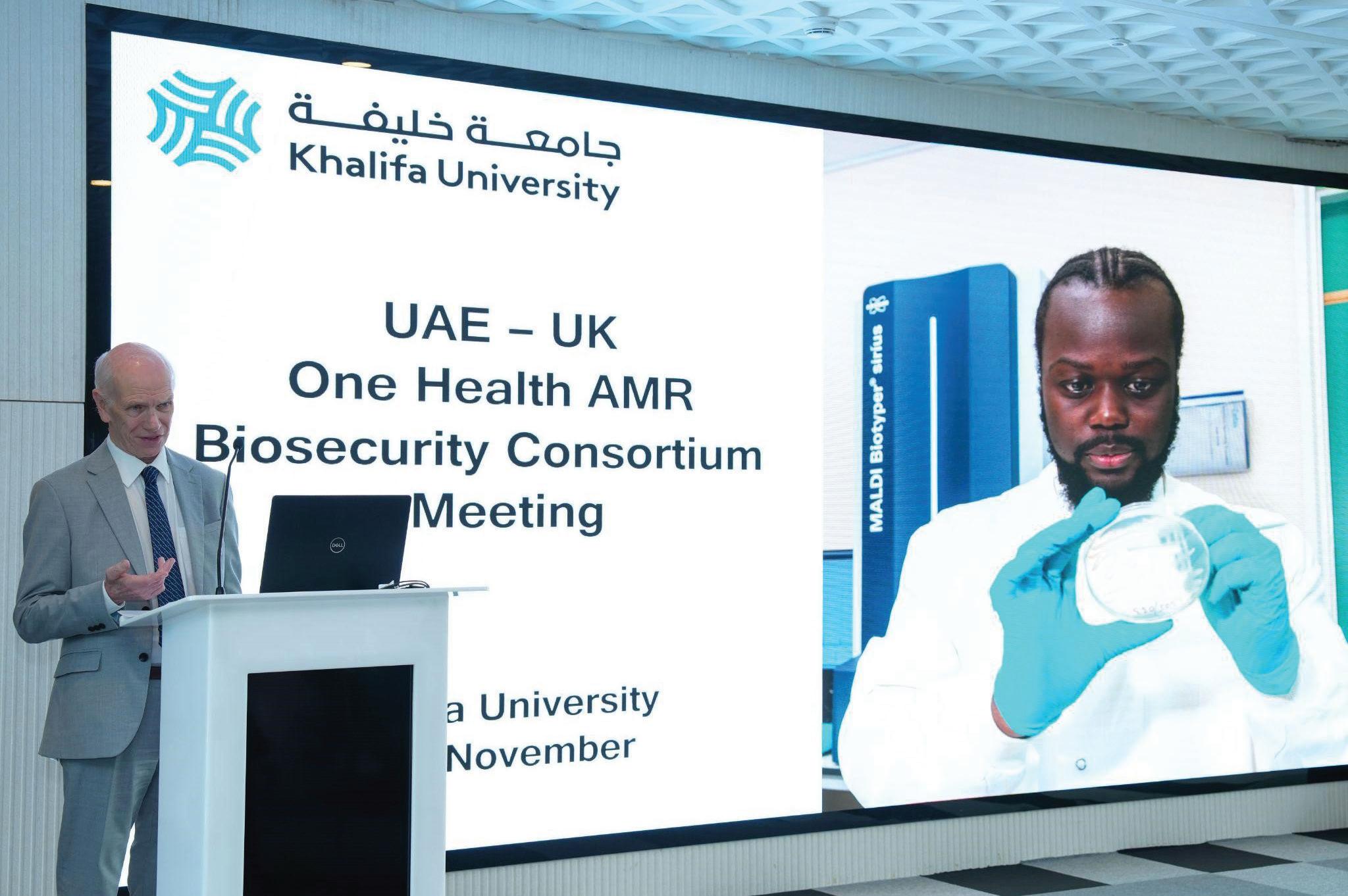
UAE-UK ONE HEALTH AMR BIOSECURITY CONSORTIUM MEETING FOCUSES ON COMBATING ANTIMICROBIAL RESISTANCE
A significant gathering aimed at addressing the urgent need for innovation and action in combating Antimicrobial Resistance (AMR) - the UAE-UK One Health AMR Consortium Meeting, was hosted by Khalifa University. The meeting brought together speakers, professionals, and stakeholders from the UAE, the UK, and the wider region to discuss strategies for tackling AMR through the ‘One Health’ approach, which recognizes the interconnectedness of human, animal, agriculture and water sectors, and environmental health.
Professor Sir John O’Reilly, President, Khalifa University, gave the welcome speech and emphasized the significance of hosting the consortium meeting, showcasing the trust and recognition placed in

The meeting took stock of the progress made since the first gathering in March 2023 and explored possibilities for international collaboration, particularly in utilizing big data genomic approaches for molecular epidemiology.
Dame Sally Davis, the UK Special Envoy on AMR, delivered a video address, providing valuable perspectives on the global context of AMR and emphasizing the need for immediate action. Dr. Najiba Abdulrazzaq, Co-Chair, UAE National Higher Committee on AMR, highlighted the remarkable efforts undertaken by the UAE in combating AMR and showcased the collaborations established through the National AMR Action Plan.
Dr. Will Le Quesne from the Centre for Environment, Fisheries, and Aquaculture Science provided an introduction to the UAE-UK One Health AMR Consortium, emphasizing the importance of collaboration and knowledge exchange between the two countries. Dr. Dean Everett, Professor in Infectious Diseases and Lead, Khalifa University’s Infection Research Unit, presented a research vision for the UAE-UK Consortium, outlining collective aspirations and ambitions for the future.
Other speakers discussed the AMR management and surveillance in medical settings, the human population, veterinary and agriculture sectors including Dr. Jens Thomsen, Chair, UAE National SubCommittee for AMR surveillance, Dr. Ghada Ahmed Abdel Wahab from the Abu Dhabi Agriculture and Food Security Agency, and Professor Ed Feil from Bath University.
FROM THE NEWSROOM 42 KU TIMES
O’Reilly addressing the gathering at the Consortium Meeting at Khalifa University.

FORGING A 10-YEAR PARTNERSHIP WITH MUBADALA
Khalifa University plays a vital role in developing future leaders and contributing to the growth of the local and regional education sector, offering a world-class learning environment which prepares students for careers in Science, Technology, Engineering, and Mathematics (STEM).
And, in order to offer better educational experience in STEM areas, a newly signed 10year agreement between Khalifa University and Mubadala Investment Company aimed to contribute to the Khalifa University Fund to support research and development, with enhanced facilities.
As a result of the multi-year agreement, the Engineering building at the University Main Campus was named Mubadala Building, during a signing ceremony that was attended by Fatima Al Marzouqi, Director – Portfolio Emiratization, Mubadala Investment Company, and Professor Sir John O’Reilly, President, Khalifa University, and Dr. Ebrahim Al-Hajri, Senior Vice President, Support Services.
Mubadala Building is one of the extension wings that was inaugurated in 2016. Other buildings on campus house part of the Engineering department, the College of Medicine and Health Sciences, the Body Museum, research labs, libraries, gymnasium, sports facilities and other state-of -the-art amenities.
Fatima Al Marzouqi, Director – Portfolio Emiratization, Mubadala Investment Company, and Dr. Ebrahim Al-Hajri, Senior Vice-President, Support Services, Khalifa University at the Mubadala Building.
EBTIC SHOWCASES INNOVATIVE PROJECTS AT GITEX 2023
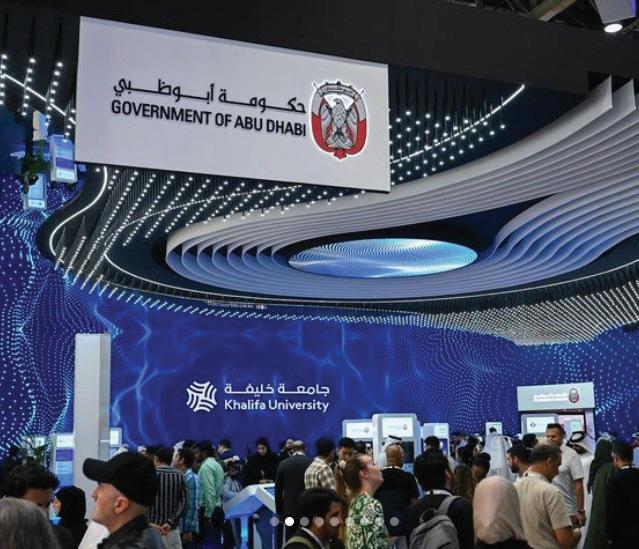
Two projects from Khalifa University’s Emirates ICT Innovation Center (EBTIC), namely the Prediction of Machine Failure and Voice Analytics Using AI, made a significant impact at the 43rd edition of the Gulf Information Technology Exhibition (GITEX) Global 2023, one of the world’s largest technology and startup expo held in Dubai every year.
Established through a collaboration between Etisalat by e&, BT Group, and Khalifa University of Science and Technology, the research and innovation center, EBTIC exemplified innovation and advanced technologies through the two projects that aimed at transforming various industries, demonstrating the


University’s commitment to contributing to a digital economy.
One of the projects unveiled by EBTIC, the Prediction of Machine Failure, involved a bespoke hardware prototype capable of monitoring vital environmental conditions, such as machine vibration, temperature, and humidity levels. By harnessing the power of AI, this solution leverages sensor data to predict the performance and deterioration of key hardware components. The technology, which can be remotely applied to factory machinery and telecom exchanges, enables proactive maintenance and prevents potential failures.
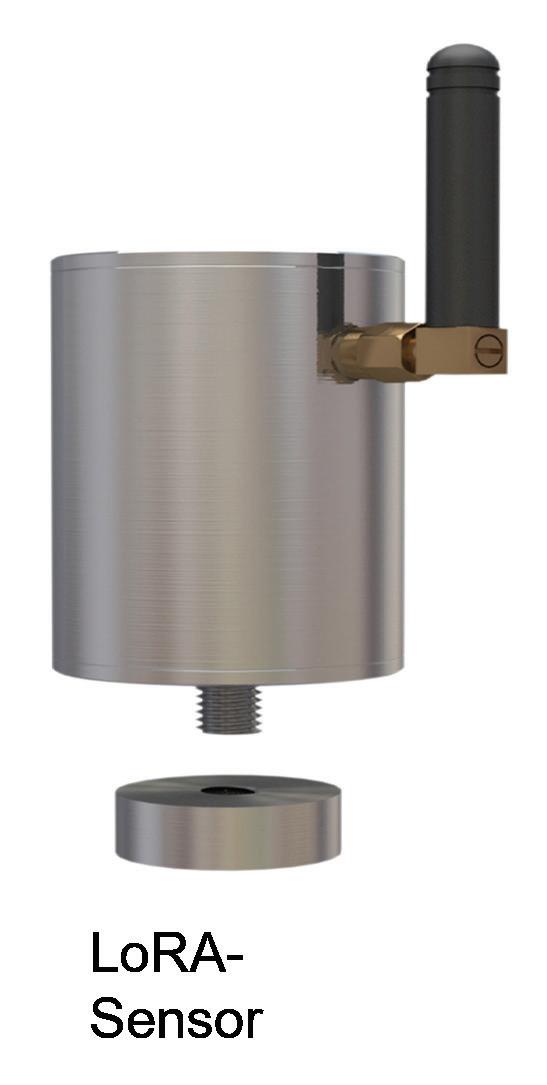
FROM THE NEWSROOM 44 KU TIMES
Khalifa University’s presence at GITEX 2023, through EBTIC, highlighted the institution’s commitment to innovation, research and the advancement of technologies.
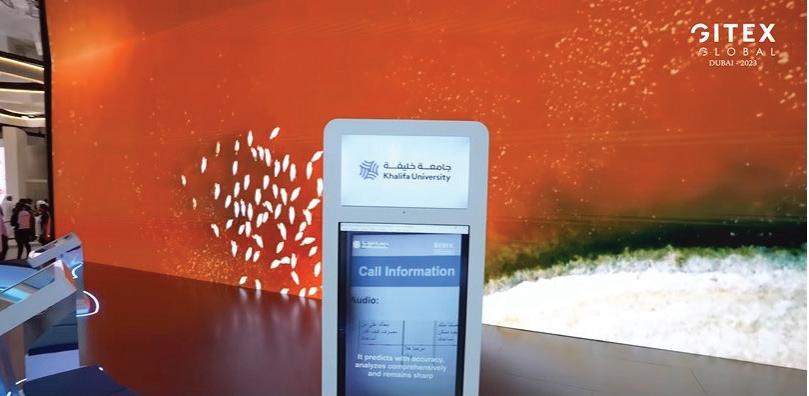
Data can be shipped wirelessly up to 2km using LoRA (long range) radio communications protocol enabling the prediction of future failure and the reasons for the failure, to allow time for proactive maintenance. Based on the anomalies in the data, the solution also sounds various real-time alarms before the failure occurs to ensure efficient hardware monitoring.
Another remarkable project showcased at GITEX was EBTIC’s development of advanced Voice Analytics Using AI. This sophisticated technology extracts insights from voice data, transcending language barriers and dialects. The solution, which works seamlessly with Arabic and its various dialects, offers significant potential for enhancing customer service outcomes and any other use cases where voice can be captured to drive business intelligence. It enables voice transcription, speaker recognition, and tailored analytics, making it a valuable tool for numerous applications. This technology has already been integrated into several EBTIC projects in the UAE, and is a cornerstone of the startup venture, 10Folds.

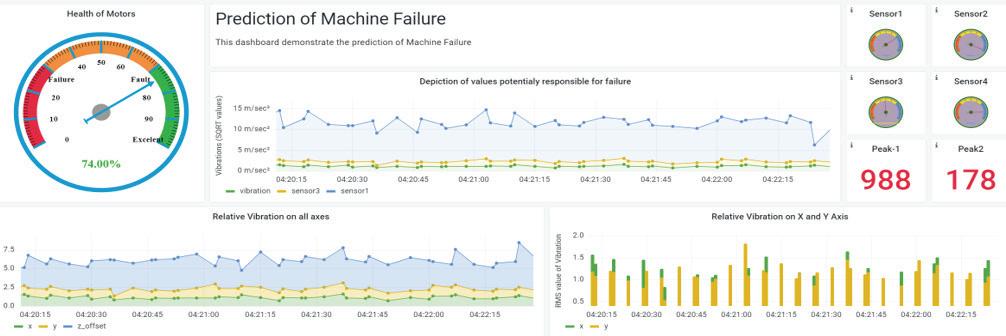

Visitors to Khalifa University’s EBTIC stand at GITEX 2023 were treated to interactive demonstrations of both projects by Abdul Qader Alafeefi, Research Assistant, EBTIC. The hardware monitoring solution featured a visual dashboard displaying real-time measurements of machine health as well as demos of physical aspects, including the sensors and gateways used in the solution. The demo of the voice analytics project involved the extraction of business intelligence from an audio file of a phone conversation between two people, showcasing the types of insights that can be extracted from it.
FROM THE NEWSROOM KU TIMES 45
EBTIC Research Assistant Abdul Qader Alafeefi demonstrates the use of the projects to visitors at Khalifa University’s EBTIC stand at GITEX 2023.
By showcasing the Voice Analytics Using AI projects, Khalifa University solidified its position as a leading educational institution and a catalyst for technological advancement in the UAE and beyond.
Examples of the types of business intelligence that can be extracted from the Voice Analytics Using AI project.
The Predictive Machine Failure project uses the long range or LoRA sensor to allow time for proactive and efficient maintenance of hardware.
COLLABORATING WITH ALIBABA CLOUD TO LAUNCH GITEX AI INNOVATEFEST 2023
Khalifa University has collaborated with Alibaba Cloud, the digital technology and intelligence arm of Alibaba Group, to launch GITEX AI InnovateFest 2023. Addressing the theme of ‘Transforming Industries with Generative AI’ this inaugural AI hackathon aimed to cultivate local talent in the Middle East and Africa (MEA) region and foster the creation of innovative solutions using Generative AI solutions from Alibaba Cloud.
Participants in the hackathon received training at Khalifa University’s Innovation Center (KIC), a deep-tech incubator that provides tailored incubation and scale-up programs to startups. The hackathon will utilize Alibaba Cloud’s solutions, such as the Platform for Artificial Intelligence (PAI) and Elastic Compute Service (ECS), to offer participants a platform for demonstrating the potential of Generative AI in enhancing productivity and improving user experience.
By collaborating with Alibaba Cloud and hosting the GITEX AI InnovateFest 2023, Khalifa University aimed to empower local talents in the Middle East and Africa (MEA) region and foster innovation in Artificial Intelligence. This initiative highlights the university’s commitment to nurturing future leaders and its expertise in machine intelligence, positioning it as a key player in the region’s digital transformation journey.

FROM THE NEWSROOM 46 KU TIMES
1ST INTERNATIONAL AMCC CONFERENCE ON NEW AND ADVANCED MATERIALS SHOWCASES KHALIFA UNIVERSITY’S STRENGTHS IN MATERIALS CHEMISTRY RESEARCH
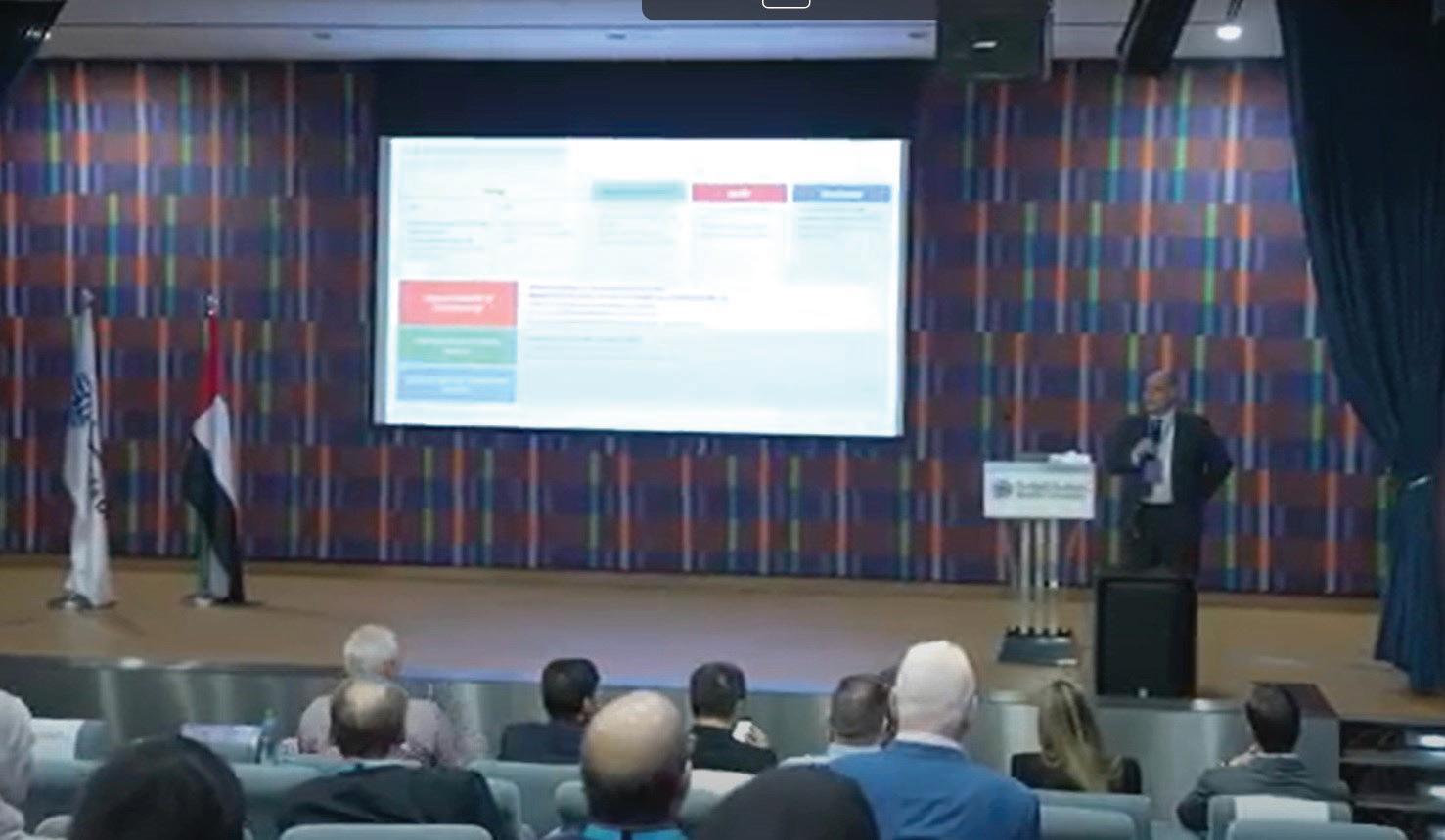


Khalifa University’s Advanced Materials Chemistry Center (AMCC) hosted the 1st AMCC Conference on New and Advanced Materials bringing together over 120 registered attendees from leading research-intensive universities in Europe, Asia and the Middle East to explore the advances in materials chemistry being made by Khalifa University’s AMCC researchers.
The conference focused on the role that chemists play in developing advanced materials for a range of industries including energy, healthcare and the environment.
The conference included keynote lectures from distinguished international chemists such as Prof. Derek Woollins, St. Andrews University, UK; Prof. Sanjay Mathur, Cologne University, Germany; and Prof. Andrey Roghach, City University of Hong Kong, reflecting the strong collaborative research relationships that exist between AMCC and global research powerhouses around the world.
The conference was also attended by Dr. Steven Griffiths, Senior Vice-President, Research and Development and Professor of Practice, Dr. Ahmed Al-Durra, Associate Provost for Research and Professor, Electrical Engineering and Computer Science, Prof. Ehab El-Saadany, Acting Dean, College of Engineering and Physical Sciences, Prof. Sharmarke Mohamed, Chair of the Conference and Theme Leader, AMCC, and Prof. Ahsan Ul Haq Qurashi, Director, AMCC.
An important deliverable of AMCC in preparing the next generation of researchers is allowing junior researchers to present their work to their peers. A key part of the conference was to give a platform

Steven Griffiths, Senior VicePresident, Research and Development and Professor of Practice, delivered a speech at the conference.

to junior researchers who are working in cutting-edge applied materials chemistry projects. A total of 22 poster presentations were given by graduate students, postdoctoral research fellows and research scientists working across a range of materials chemistry projects spanning functional inorganic materials, functional polymer materials and multiscale materials simulations. The award ceremony for the best poster presentations for junior researchers was officiated by Dr. Ahmed Al-Durra.
AMCC is dedicated to advancing research in the field of materials chemistry, with a focus on developing new materials, new methods and establishing their structure-property relationships through advanced characterization methods and multiscale modeling for various potential applications.
Dr.
1st International AMCC Conference on New and Advanced Materials at Khalifa University Main Campus.
FROM THE NEWSROOM
Graduate students, postdoctoral research fellows and research scientists working across a range of materials chemistry projects presented 22 posters.
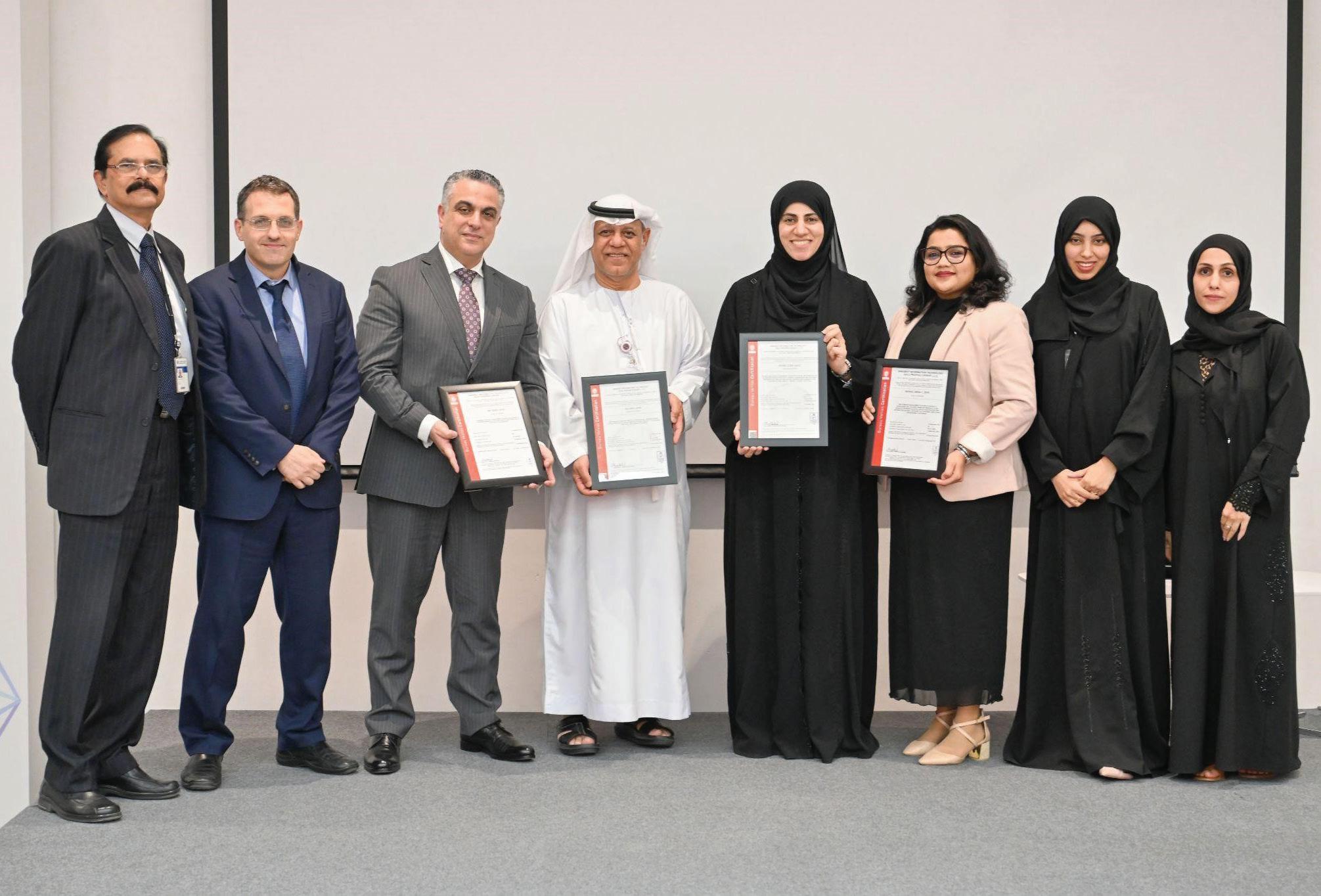
ANKABUT RECEIVES FOUR ISO CERTIFICATIONS
Ankabut, the UAE’s Advanced National Research and Education Network offering academic institutions connectivity to global education networks received four prestigious ISO certifications by Bureau Veritas, an accredited certification body, that conducted an external audit. For Ankabut, implementation of these four ISO standards was not a mere checklist exercise as it has integrated them into its management system, ensuring process efficiency.
The certifications, namely ISO 9001 (QMS) Quality Management System, ISO 20000 (ITSMS) IT Service Management System, ISO 27001 (ISMS) Information Security Management System, and ISO 22301 (BCMS) Business Continuity Management System, underscore Ankabut’s commitment to enhance customers’ experience.

With these certifications in place, Ankabut is now poised to take its services to even greater heights. Future plans involve following the updated processes outlined in the ISO standards including the setting up of continuous improvement programs to improve operational processes, and prioritizing customer feedback and requirements to consistently exceed expectations.
Managed by Khalifa University, Ankabut has more than 30 institutional members with connections to over 70 sites throughout the UAE, and offers UAE academic and research institutions connectivity to other education networks worldwide.
FROM THE NEWSROOM 48 KU TIMES
Fahem Al Nuaimi, CEO, Ankabut alongside the Bureau Veritas team.
FROM THE NEWSROOM 48 KU TIMES
With these certifications in place, Ankabut is now poised to take its services to even greater heights.
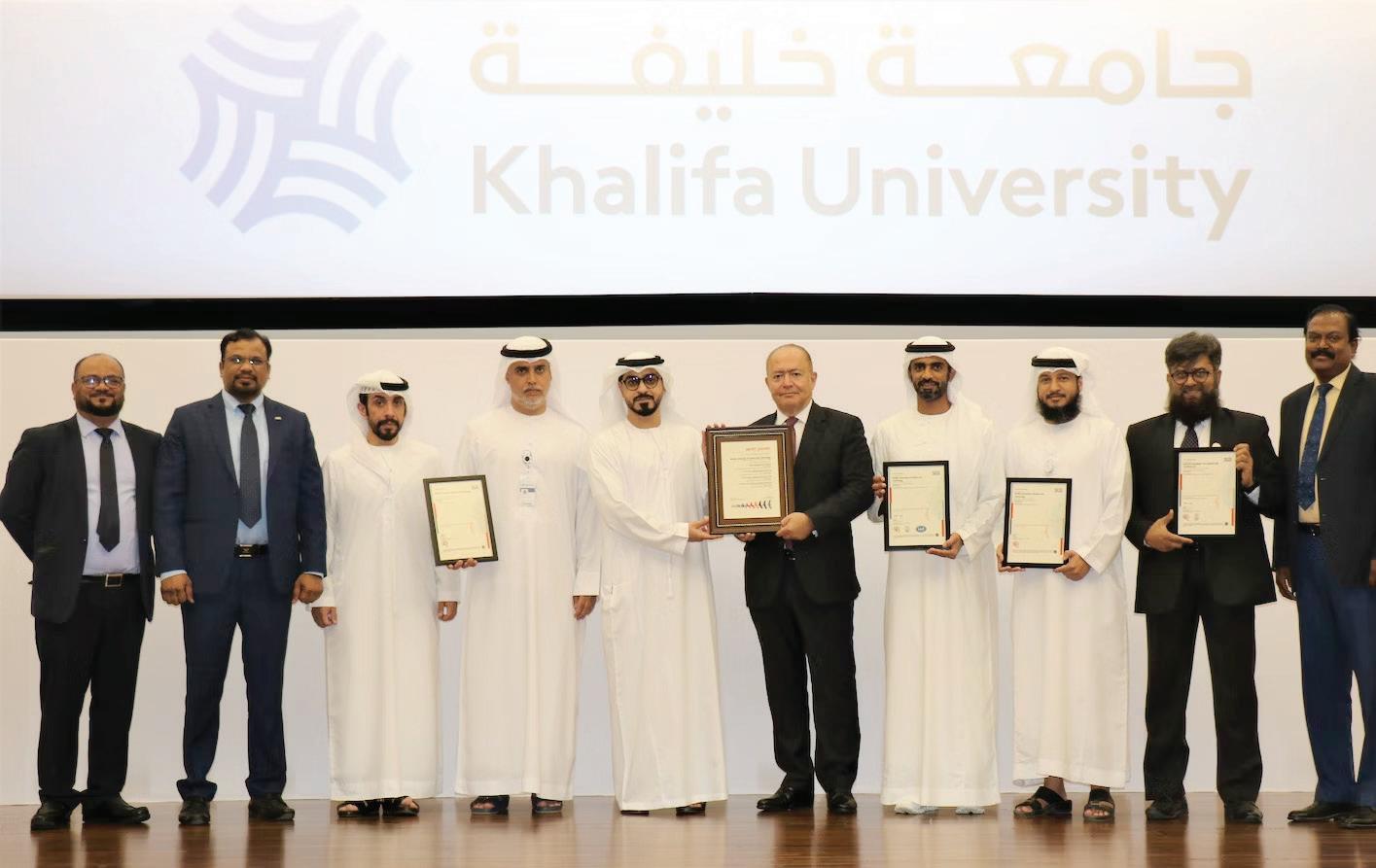
KHALIFA UNIVERSITY RECEIVES FOUR ISO CERTIFICATIONS FROM SGS
Khalifa University received four prestigious certifications from SGS, a leading provider of inspection, verification, testing and certification services. The certifications include ISO 9001 for quality management systems, ISO 55001 for asset management systems, ISO 41001 for facility management systems, and ISO 18788 for security operations management systems.
As a university committed to excellence in education and research, Khalifa University remains as the best possible environment for its students, faculty and staff. These new certifications demonstrate the university’s dedication to global best practices in quality management, asset management, facility management, and security operations.
The ISO 9001 certification signifies that Khalifa University’s highly effective
quality management systems ensure continuous improvement of services, while reflecting the university’s commitment to providing students with a superior learning experience.
The ISO 55001 certification emphasizes Khalifa University’s commitment to effectively managing its on-campus assets and infrastructure. With this certification in place, the university can optimize asset performance and enhance decision-making processes related to asset investments.
By obtaining the ISO 41001 certification for facility management systems, Khalifa University demonstrates its focus on ensuring efficient facilities operations. This recognition highlights the university’s commitment to maintaining a suitable learning environment.
The ISO 18788 certification showcases Khalifa University’s dedication to safeguarding the safety and security of its campus community. This certification verifies that the university has implemented robust security operations management systems aligned with international best practices.
FROM THE NEWSROOM KU TIMES 49
The certifications highlight the University’s commitment to maintaining a suitable learning environment.

RIC2D AND GRAPHMATECH COLLABORATE TO ADVANCE GRAPHENE-ENGINEERED MATERIALS
Khalifa University’s Research and Innovation Center for Graphene and 2D Materials (RIC2D) and Graphmatech AB, a leading company in the development of grapheneenhanced materials signed a memorandum of understanding (MoU), establishing a strategic framework for cooperation in advanced graphene-engineered materials and manufacturing processes. The MoU was signed by Dr. Hassan Arafat, Senior Director, RIC2D, and Dr. Mamoun Taher, CEO and Founder of Graphmatech.
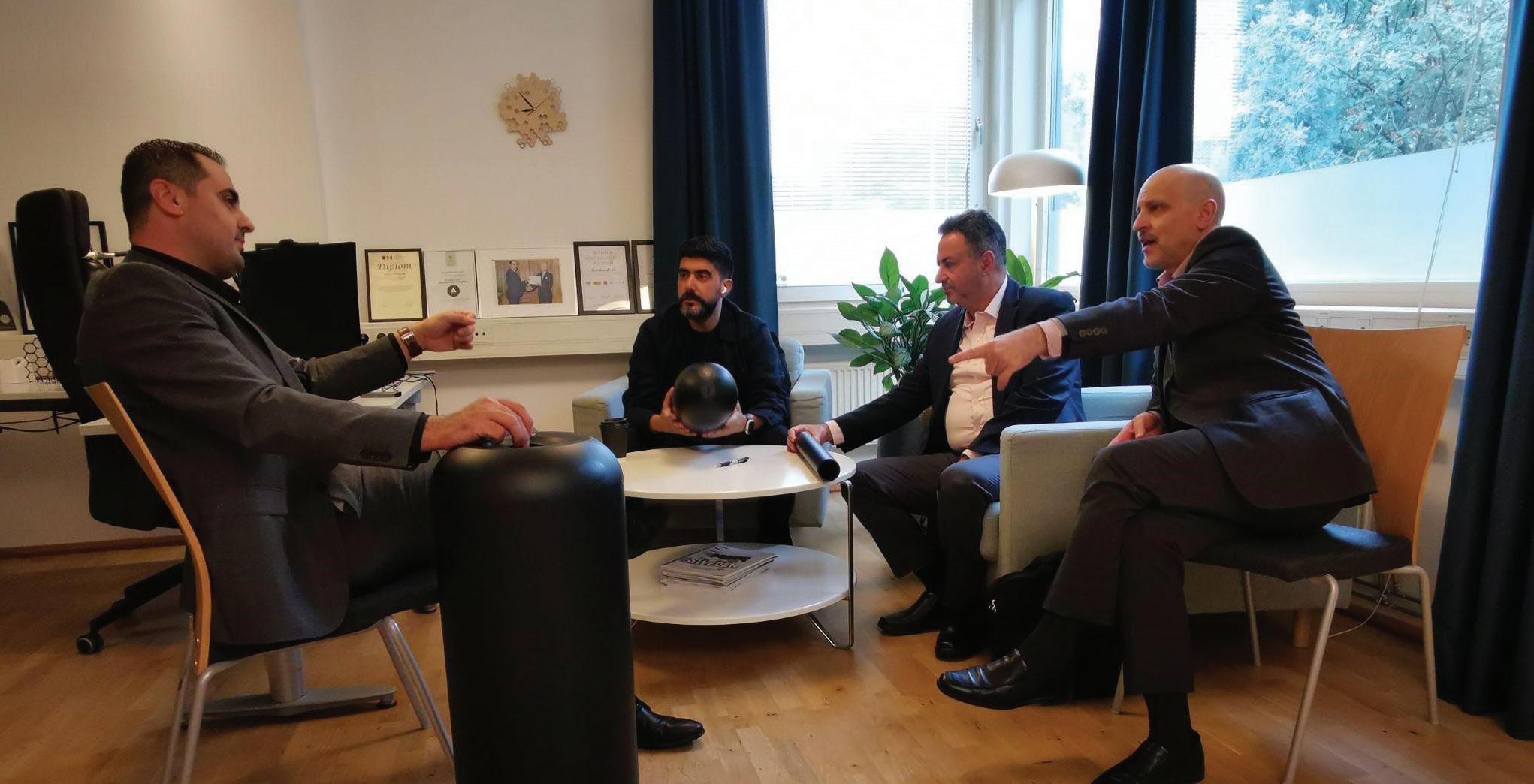
The MoU aligns with and supports the UAE leadership’s vision towards achieving net-zero targets and diversifying the economy, while facilitating Graphmatech to offer its technology, products, and services to industries in the UAE, particularly in the energy and high-precision domains.
A spin-off from Sweden’s Uppsala University, Graphmatech’s unique technology platform to engineer materials with graphene offers a unique and strong value proposition across multiple industrial sectors. Graphmatech develops novel graphene-based nanocomposite materials and products, and focuses on three main business areas – metal-graphene composites and coated powders, polymergraphene composites and additives for energy storage.
RIC2D AND CMAT PARTNER WITH FRANCE’S GRAPHEAL FOR NEW POINT-OFCARE DIAGNOSTIC BIOSENSOR PROTOTYPE


The first step of a strategic partnership to industrialize and commercialize graphene-based biosensors in the UAE officially presented the first Minimal Viable Product (MVP), a diagnostic biosensor prototype resulting from a cooperation between Khalifa University’s Research and Innovation Center for Graphene and 2D Materials (RIC2D), the Center for Membranes and Advanced Water Technologies (CMAT), and French company Grapheal that brings to market graphene-based consumer electronics.
This partnership, based on a successful technology developed within Khalifa University’s CMAT labs, and its integration in Grapheal’s proprietary technologies, sets the foundation for joining forces and combining intellectual property to build a clinically validated invitro syndromic diagnostics at the point-of-care and in consumer environments.
RIC2D has played an instrumental role in identifying and nurturing the opportunity between Khalifa University’s CMAT and Grapheal, facilitating the necessary groundwork and investments to accelerate the building of synergies and commercialization of graphene-based biosensors to proliferate the adaptation of the superior performance of graphene-enhanced products and materials.
During the COP28 UAE summit, Grapheal exhibited wireless connected sensors solutions for air, water and healthcare monitoring as well as transparent electrodes suitable for solar panels at Booth 16 Startup village.
50 KU TIMES
Mamoun Taher, Founder and CEO, Graphmatech, Prof. Hassan Arafat, Fahad Al Absi and Dr. Ammar Jarrar from RIC2D, at Sweden’s Uppsala University.
Khalifa University’s RIC2D team at Graphmatech offices in Sweden.
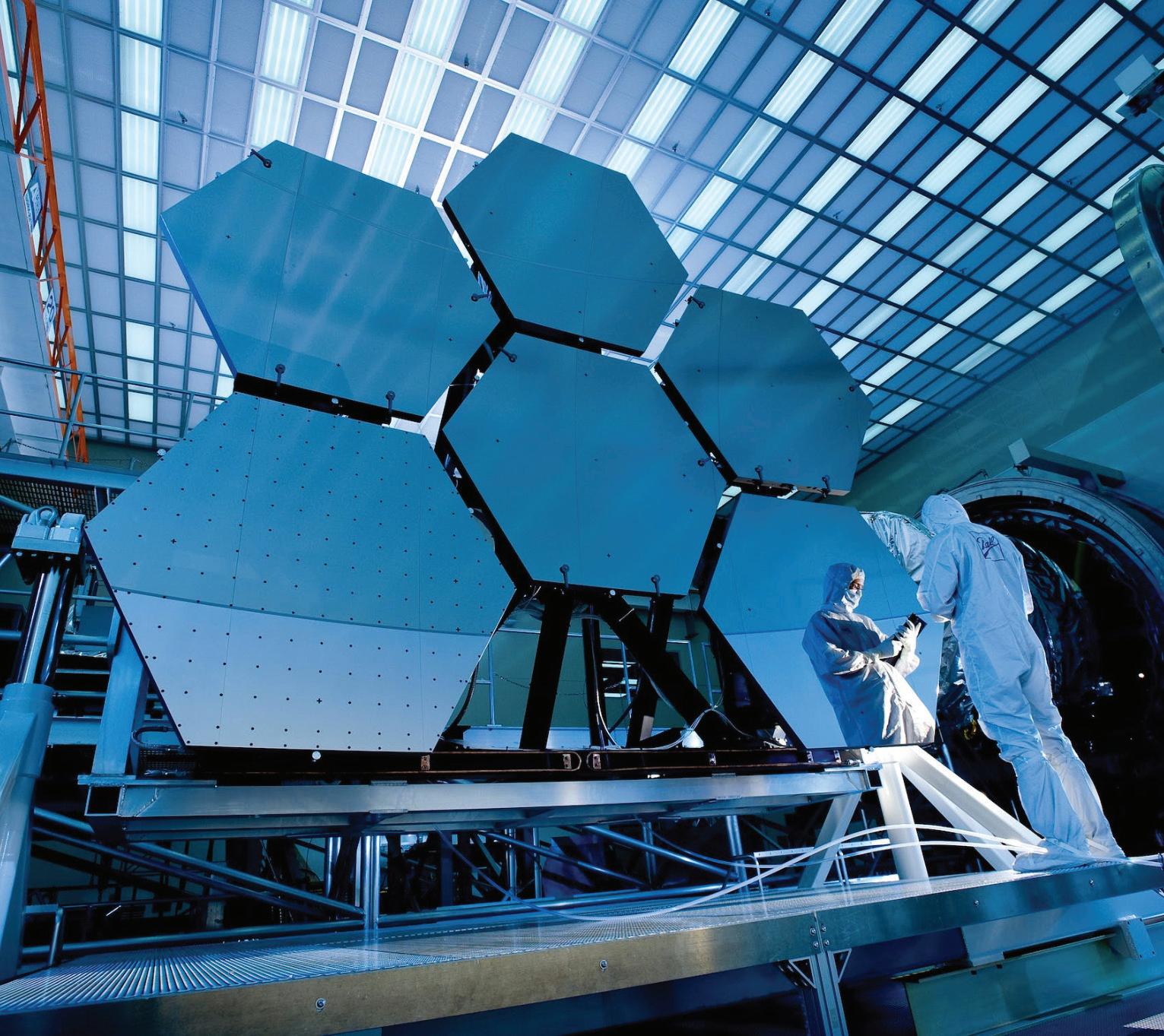
DEVELOPING SUSTAINABLE BUILDING TECHNOLOGIES FOR GCC
CLIMATE
A unique concept in addressing the priority areas of sustainable construction and environmental sustainability became the focus of Khalifa University’s RIC2D as it signed a collaboration with UAE-based Orpheus Research and Experimental Development on Natural Science.
The agreement signed by Dr. Hassan Arafat, Senior Director, RIC2D, and Walid Amara, Director-Strategy, Orpheus, identified opportunities to enhance the properties of building technologies used in the construction sector to withstand the region’s harsh climate.
The collaboration paves the way for RIC2D and Orpheus to further develop and test the enhanced chemicals, coatings and ready-made building materials that are both sustainable and durable using Orpheus’ graphene-based additives.
MY CAMPUS, MY COMMUNITY
MY CAMPUS, MY COMMUNITY
Student & faculty achievements, and campus activities
FACULTY NAMED AMONG 16 STANFORD UNIVERSITY FACULTY INNOVATION FELLOWS GLOBALLY
Melanie Bowman, Lecturer, Management Science and Engineering, Khalifa University, has been named a Faculty Innovation Fellow by Stanford University, after completing two years of work in a community of practice with other faculty and administrators from around the world. She has become one of only 16 educators from 11 global higher education institutions to be named under the Faculty Innovation Fellow program, an offering of the University Innovation Fellows, housed at Stanford University’s Hasso Plattner Institute of Design (d.school).
In the Faculty Innovation Fellows program, educators design unique projects that help students gain vital real-world skills and mindsets in an innovation ecosystem. The Fellows collaborate with one another to learn new change strategies, develop projects, gather feedback on ideas, and share resources.
The goal of Bowman’s project was to enhance the lives of students through cycling. To support this, Bowman and her colleagues organized weekly rides in collaboration with the Abu Dhabi Cycling Club’s #sherides initiative. KU Student Life provided transportation for female participants, enabling them to cycle on a closed track exclusively for women. The outdoor rides attracted more than 50 KU ladies on some weeks.
The highlight of Bowman’s innovation efforts was the KU male / female indoor cycling challenge. This unique challenge took place at KU and utilized the MyWhoosh cycling program,

allowing students to compete with each other in a live online environment. Female participants cycled in the gym, while male participants cycled in the atrium, represented by virtual avatars. This event marked the first time that a UAE university facilitated a culturally appropriate environment for males and female students to compete with each other.
With a 20-year track record in Australia and the UAE at the undergraduate and postgraduate levels, Bowman is additionally experienced in delivering training within the vocational education and corporate sectors. She has been involved in key training projects and initiatives within commercial and educational environments, and her experience extends into executive coaching and business consulting. Bowman also has a passion for cycling.
MY CAMPUS, MY COMMUNITY 52 KU TIMES
The goal of Melanie Bowman’s project is to enhance the lives of students through cycling.

SPARKING HOPE FOR CLEAN ENERGY AT GRAPHENE WEEK 2023
The potential of graphene-based catalysts in fuel-related technologies paving the way for sustainable energy production was highlighted by Dr. Kyriaki Polychronopoulou, Professor, and Director, Center for Catalysis and Separation (CeCaS) at Khalifa University, at Graphene Week 2023.
The 18th edition of Europe’s leading conference in Graphene and 2D Materials, which was held recently in Gothenburg, Sweden, is an annual conference that brings together researchers, professionals and enthusiasts to exchange knowledge in the field of graphene. One of the highlights of the conference was Dr. Polychronopoulou’s presentation, titled, “Designing Multifunctional Catalysts for Added-Value Products’’ that focused on the research conducted at Khalifa University to develop high performance catalysts for Energy/Fuel and decarbonization applications using graphene and ‘MXenes’, another category of materials. The research team specifically examined catalysts based on graphene for reducing carbon emissions and producing aviation fuels, as well as MXenes for generating hydrogen, which is considered a clean alternative to fossil fuels.
Dr. Polychronopoulou and her colleagues, Dr. Yarjan Abdul Samad, Assistant Professor, Aerospace Engineering, Dr. Nirpendra Singh, Assistant Professor, Physics, Dr. Aseel Hussien, postdoctoral researcher,
Mechanical Engineering, conducted a multifaceted study to address a sustainability challenge: CO2 utilization and H2 production. Two Mechanical Engineering MSc students were also involved in different aspects of this project; Mira Omar Mohamed and Louai Maghrabi.
The research team led by Dr. Polychronopoulou created graphenebased catalysts that efficiently converted CO2 into natural gas and biofuels, and discovered that graphene-based catalysts performed exceptionally well, demonstrating stability and selectivity. In their investigation, they compared catalysts with different qualities of graphene to understand their properties and performance. In the case of MXenes, they found that the structure and termination of MXenes influenced hydrogen production significantly.
During the presentation, Dr. Polychronopoulou showcased the fabrication, testing, and the analysis of the catalysts for specific reactions, highlighting how the methods, properties of the catalysts, and their performance are all interconnected. The presentation also emphasized the application of these catalysts in energy production and storage, particularly by enhancing the geometric and electronic interactions of graphene and the creation of active catalytical sites.
This makes the new research all the more relevant as the utilization of CO2 through graphene-based catalysts has the potential to address the critical need for sustainable and renewable energy sources, aligning with the UAE Energy Vision 2050, and offering a solution to a global problem.
Dr. Kyriaki Polychronopoulou highlights the potential of graphene-based catalysts in fuel-related technologies at Graphene Week in Sweden.
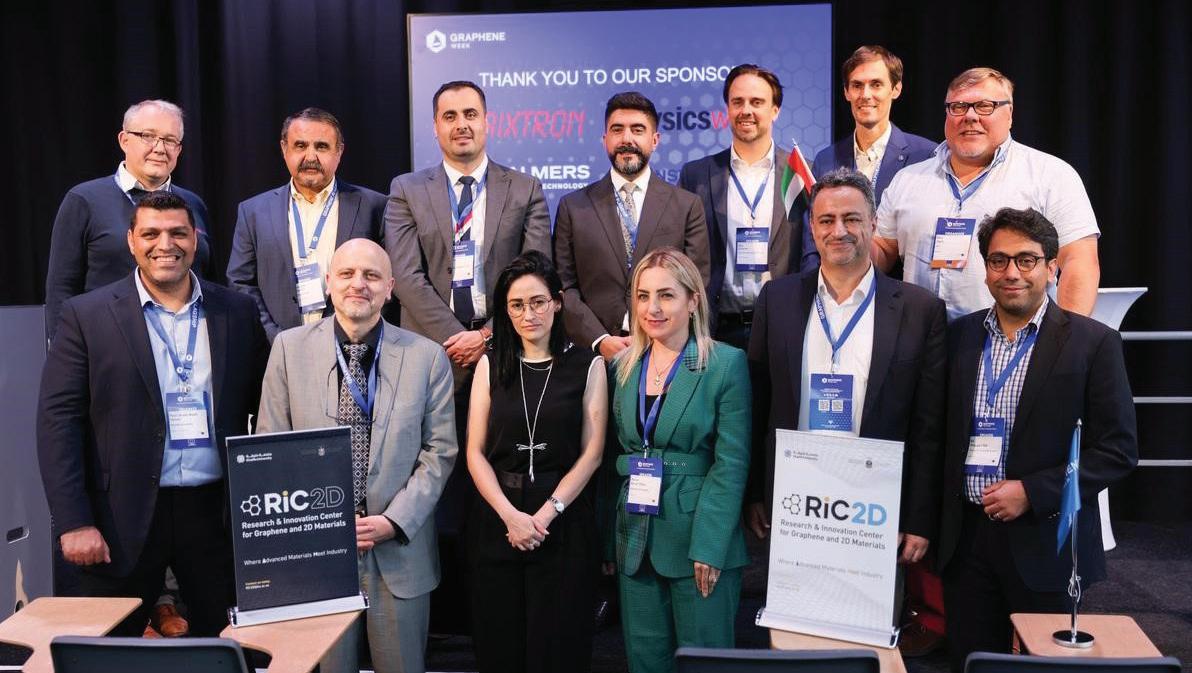
RIC2D HIGHLIGHTS RESEARCH COMMERCIALIZATION AT GRAPHENE WEEK 2023 IN SWEDEN
Khalifa University’s Research and Innovation Center for Graphene and 2D Materials (RIC2D), a leading center for graphene research and development, highlighted the commercialization of research and how challenges from the region are addressed with innovations in construction, health care, aerospace, energy, and water purification, at the 2nd EU-UAE International Workshop at Graphene Week 2023 in Gothenburg, Sweden.
The workshop was part of the Graphene Week 2023 program, where attendees had an opportunity to learn about ongoing research activities and real-world technology transfer applications in the UAE, including spin-offs from the Graphene Flagship. Dr. Hassan Arafat, Senior Director, RIC2D, discussed
the future of graphene during a talk hosted at the event.
Prof. Arafat and Dr. Kari Hjelt, Head of Innovation, Graphene Flagship, co-chaired the workshop in which eight presentations were given by representatives of Graphene Flagship industry partners and business developers, as well as UAE partners, each presenting relevant research and innovation actions involving graphene and 2D materials, addressing important technological and societal challenges.
RIC2D’s local partners, including the Technology Innovation Institute (TII) Abu Dhabi, and STRATA Manufacturing offered presentations, in addition to international partners Graphmatech AB, Levidian and Grapheal. Apart from these presentations, this workshop provided opportunities to discuss topics of common interest, explore possible new collaborations, and an interactive panel discussion that clarified queries raised by participants.
Prof. Arafat presented on ‘The Research and Innovation Center for Graphene and 2D Materials (RIC2D) at Khalifa University’ explaining the emergence of RIC2D as a result of the UAE’s early recognition of the significant potential of graphene and other 2D materials.
MY CAMPUS, MY COMMUNITY 54 KU TIMES
Khalifa University’s Research and Innovation Center for Graphene and 2D Materials (RIC2D) at Graphene Week in Sweden.
From its inception, the center has established a valuable association with the Graphene Engineering Innovation Centre (GEIC) at the University of Manchester.
The talk also emphasized RIC2D’s focus on creating an advanced materials innovation ecosystem in Abu Dhabi through research, technology development and commercialization, providing funding and support for collaborative international research endeavors.
Prof. Arafat also shared that within the realm of 2D technologies, RIC2D prioritizes areas such as water, energy (including hydrogen), and lightweight materials, while exploring opportunities in healthcare, photonics, and communications. The presentation also explored how RIC2D extends an open invitation to all stakeholders for joint research and development proposals.
At Graphene Week, RIC2D played a pivotal role in catalyzing scientific development and fostering the commercialization of technologies derived from graphene and other enhanced 2D materials in the UAE. RIC2D’s presence at Graphene Week 2023 underscored its dedication to fostering collaboration, innovation, and the realization of this transformative potential.
Dr. Kyriaki Polychronopoulou, Professor, and Director, Khalifa University’s Center for Catalysis and Separation (CeCaS), was also an Invited Speaker at Graphene Week 2023, and presented a research paper that demonstrated how certain catalysts can address sustainable needs in the energy and fuel sector.
RESEARCHER RECEIVES URSI GASS 2023 YOUNG SCIENTIST AWARD
Khalifa University’s Postdoctoral Fellow, Dr. Steffy Sara Varghese, has been awarded the URSI GASS 2023 Young Scientist Award for her research paper titled ‘Significance of Kappa Distributed Electrons on Electrostatic Solitary Waves in Saturn’s Magnetosphere’, at a scientific symposium held in Japan.
Affiliated with the Mathematics Department at Khalifa University and as a researcher at the Khalifa University Space and Planetary Science Center (Magnetospheric Modeling), Dr. Varghese published her paper under the guidance of Ioannis Kourakis, Professor of Mathematics and Theme Leader for Magnetospheric Physics.
The announcement of Young Scientist Awards was made by the International Union of Radio Science (Union Radio-Scientifique Internationale or URSI) during the 35th General Assembly and Scientific Symposium (GASS) of URSI and the URSI Atlantic Radio Science Conference (ATRASC) recently held in Sapporo, Hokkaido, Japan. These awards recognize young individuals - less than 35 years of age - who have made innovative contributions and discoveries in multidisciplinary research related to radio science.
URSI General Assemblies and AT-RASC conferences are held every three years to review current research trends, present new discoveries, and plan for future research and projects in radio science.
Dr. Varghese’s award-winning paper focuses on the significance of kappa distributed electrons on electrostatic solitary waves (ESW) in the magnetosphere of Saturn; an ideal environment for studying the behavior of particles and waves
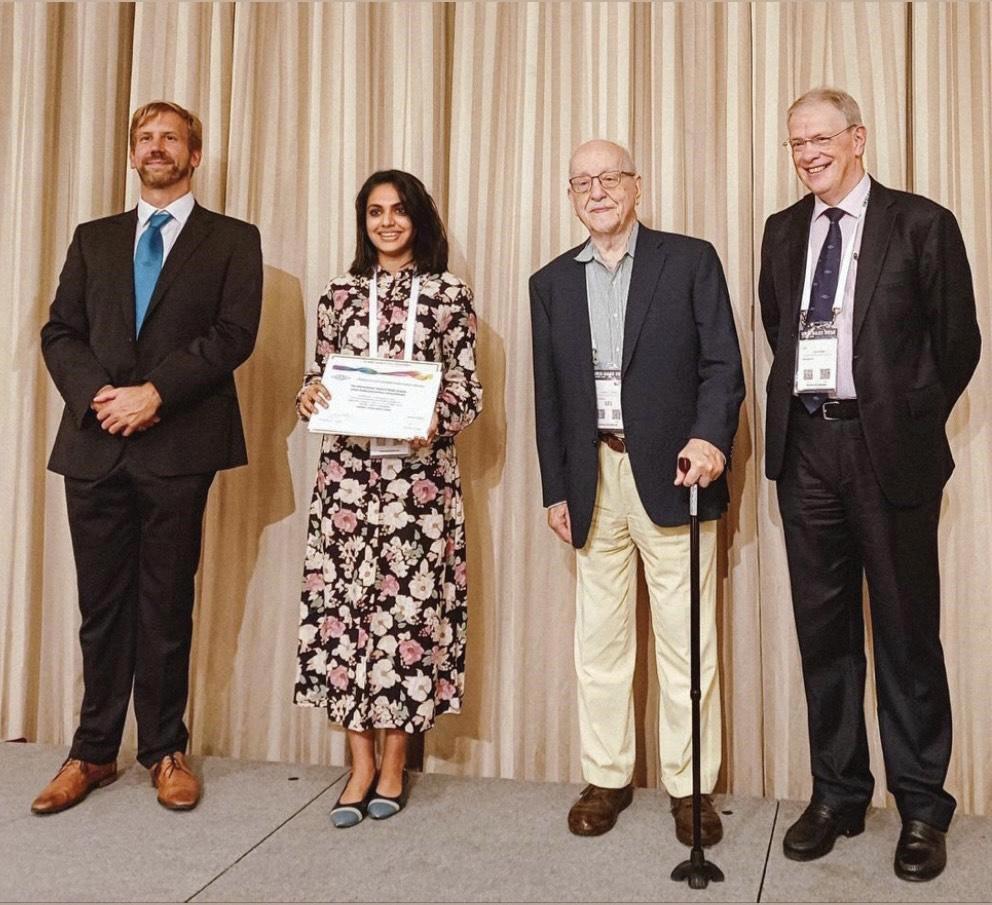
owing to the planet’s rich plasma system in its magnetosphere.

Kappa distributions have been studied extensively in different space environments as well – such as the solar wind, planetary magnetospheres (including Saturn’s), and other regions. Scientists have also used data from the radio and plasma wave science instrument onboard the Cassini mission to Saturn which detected ESWs in Saturn’s magnetosphere.
Following a similar path of using observations from the Cassini spacecraft mission, Dr. Varghese investigated the behavior of electrons following kappa distributions in Saturn’s magnetosphere and explored their impact on the formation of plasma waves, particularly ESWs. Her theoretical model explored the significance of the electron parameters (density and temperature) in the evolution and the characteristics of ESWs occurring in Saturn’s magnetosphere. In order to validate the accuracy of the theoretical model Dr. Varghese compared its predictions with real observations of ESWs in Saturn’s magnetosphere, providing an efficient tool to understand the microphysics of Saturn’s magnetosphere and enhancing our understanding of ESWs.
This year’s Young Scientist Awards were presented during the Young Scientists Party, a networking event where scientists interacted with senior members of URSI, including URSI Board members, Commission Chairs, Vice-Chairs, and early career researchers.

KU TIMES 55
MY CAMPUS, MY COMMUNITY KU TIMES 55
Dr. Steffy Sara Varghese, receives the URSI GASS 2023 Young Scientist Award at the scientific symposium in Japan.
PRESTIGIOUS ‘NATURE’ RESEARCH JOURNAL SHOWCASES ACHIEVEMENTS OF UAE RESEARCH PROGRAM FOR RAIN ENHANCEMENT SCIENCE

Experts including Dr. Steve Griffiths highlight the pioneering research and technology achievements of the National Center of Meteorology (NCM) through the UAE Research Program for Rain Enhancement Science (UAEREP) which are featured in a peer-reviewed article published by the Nature Research journal npj Climate and Atmospheric Science.
Titled “Rethinking water security in a warming climate: rainfall enhancement as an innovative augmentation technique”, the article proposes that rainfall enhancement has historically been overlooked as a key component of sustainability and climate change adaptation strategies, and showcases current progress and future directions for rainfall enhancement applications based on NCM’s operational cloud seeding program and its grant-based international research and development ecosystem under UAEREP.
The UAE’s efforts in rainfall enhancement, as documented in the Nature paper, presents a significant opportunity to advance the field of rainfall enhancement as a viable contributor to address the growing impacts of climate change on water and food security, regionally and globally. This opportunity is aligned with the UAE’s commitment to sustainability as
evidenced by the country’s hosting of COP28.
This comprehensive article draws on valuable input from a range of distinguished contributors including His Excellency Dr. Abdulla Al Mandous, Director General of NCM and President of the World Meteorological Organization (WMO), Omar Al Yazeedi, Deputy Director General of NCM, and Alya Al Mazrouei, UAEREP Director. Dr. Steve Griffiths, Senior Vice-President, Research and Development and Professor of Practice,, Khalifa University, is the paper’s corresponding author and Dr. Youssef Wehbe, UAEREP Program Officer, the paper’s lead author.
The article references average seasonal precipitation increases of 5-25% from different international cloud seeding efforts based on the WMO Peer Review Report on Global Precipitation Enhancement Activities. Using this benchmark range, corroborated by local radar-based studies over the UAE, the UAE’s cloud seeding efforts are estimated to yield an additional 168-838 million cubic meters of rainfall annually.
Adjusted for evaporation and soil retention, the harvestable volume of water from seeded rainfall ranges from 84-419 million cubic
meters. This represents a significant fraction of the approximately 6.7 billion cubic meters of rainfall that the UAE receives annually.
The article also revealed that cloud seeding missions managed by NCM can cost up to US$8,000 per flight hour. In 2020, a total of 390 flights were conducted, each averaging an hour in duration. Considering the range of harvestable rainfall volumes achievable through seeding, the unit cost of harvestable seeded rainfall can be estimated to be between US$0.01 and US$0.04 per cubic meter, compared to the reported estimated desalinated water production cost of US$0.31 per cubic meter in the UAE, presenting a compelling cost advantage over desalination.
To advance the pivotal role of rainfall enhancement in achieving national and regional water security strategies, the article proposes three key areas for further research. They include enhancing the targeted cloud quantity and precision (timing and location) of seeding missions; identifying optimal applications for rainfall enhancement and the requisite conditions; and deploying rainfall harvesting, water storage and transmission systems.
The article demonstrates that these key areas can be addressed progressively through interdisciplinary research and development. As such, the UAEREP projects leverage the latest advancements in material science and nanotechnology, autonomous unmanned aerial systems, smart sensors, reverse-engineered thermal systems, and AI/machine learning tools.
In its efforts to foster global scientific collaboration, UAEREP actively shares its research findings through top ranked peer-reviewed journals, conference proceedings and other public platforms. To date, the program has published 93 articles and over 110 conference proceedings, with more than 1,456 citations in renowned scientific publications.
MY CAMPUS, MY COMMUNITY 56 KU TIMES
MY CAMPUS, MY COMMUNITY 56 KU TIMES
ROADMAP TO DECARBONIZING INDUSTRIAL SECTOR HIGHLIGHTED BY ACADEMIC EXPERTS
Carbon-intensive industrial sectors such as steel, cement, and chemicals contribute to over 30% of greenhouse gas emissions and it is imperative that the global industrial sector moves towards rapid decarbonization according to an article published in The Conversation, an online network of not-forprofit media outlets publishing news stories and research reports.
Authored by Dr. Steven Griffiths, Khalifa University's Senior Vice-President, Research and Development, and Professor of Practice along with authors Morgan Bazilian, Professor, Public Policy and Director, Payne Institute, Colorado School of Mines and Benjamin K. Sovacool, Professor, Energy Policy, University of Sussex have published the article titled ‘The path to net-zero emissions runs through industry’.
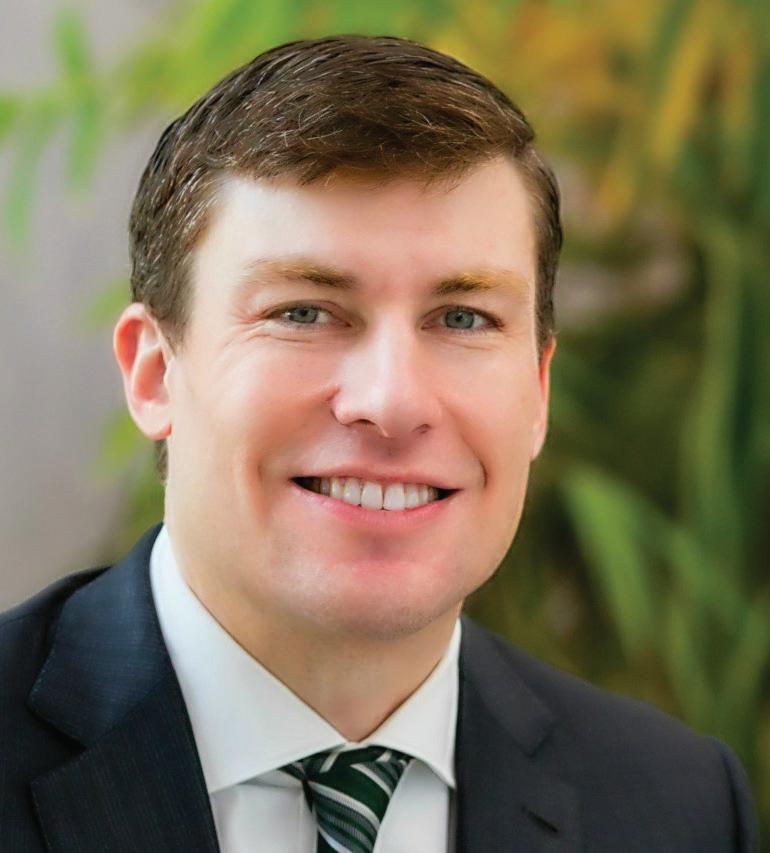
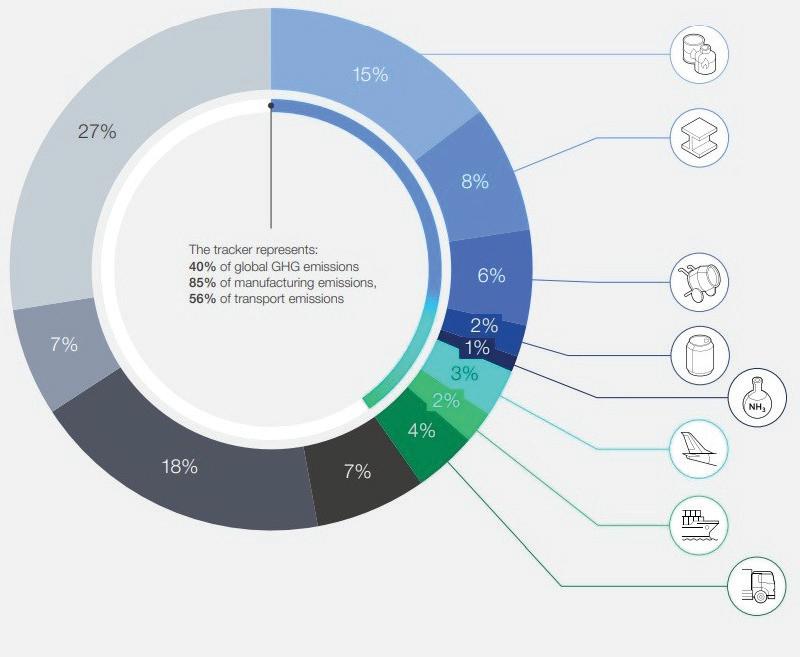

target embraced by major economies worldwide. This requires an annual decline of 3%, which necessitates substantial financial investments, technology advancements, and political commitment. The publication of this article comes at a critical time, as government leaders and climate negotiators gather in Dubai for COP28 UAE, which aims to address the pressing issue of decarbonizing the global industrial sector.
Promising technologies and innovations, according to the authors, can drive decarbonization in the industry. These include green hydrogen fuel made from clean electricity and water, energy efficiency measures across supply chains, and carbon capture, use and storage.
field. It explores the challenges and solutions for cutting industrial emissions in fast-growing countries and emphasizes the need for urgent action.
In their journal paper, the authors, along with Dr. Jinsoo Kim, Department of Earth Resources and Environmental Engineering, Hanyang University, Republic of Korea, propose six bold steps for accelerating progress towards net-zero industrial carbon emissions. These steps include ‘scaling up finance’, ‘more technology transfer,’ ‘improved job training’ ‘ensuring a just transition’ and ‘establishing a global treaty’.
The authors propose that global industrial emissions must decrease by 25% by 2030 to be on track for net-zero emissions by 2050, a
The article also gives an overview of their journal paper titled ‘Six bold steps towards net-zero industry’ published in the Energy Research & Social Science, a top 1% journal in the energy
They emphasize that these actions should be pursued simultaneously and in an integrated manner, with consideration for the unique context of fast-growing countries, particularly those in Africa, Asia, and Latin America.
MY CAMPUS, MY COMMUNITY KU TIMES 57
Dr. Steven Griffiths, Khalifa University’s Senior Vice-President, Research and Development, and Professor of Practice, Chemical and Petroleum Engineering.

AEROSPACE ENGINEERING FACULTY’S BOOK OFFERS DEEP INSIGHTS INTO SUSTAINABLE AVIATION TECHNOLOGY
A book titled ‘Sustainable Aviation Technology and Operations: Research and Innovation Perspectives’ edited and co-authored by Khalifa University’s Dr. Roberto Sabatini, Professor and Dr. Alessandro Gardi, Assistant Professor, was released by multinational publishing company John Wiley & Sons. The 544-page hardcover and e-book offers a comprehensive and timely collection of recent research advances in aeronautics and air transport, with a focus on long-term sustainable development goals and current achievements.
This new and timely editorial initiative was presented during the COP28 UAE summit and covers a broad spectrum of topics including aircraft technologies, air traffic management,

systems engineering, propulsion, aerodynamics, avionics, structures, materials, airspace management, biofuels, and sustainable lifecycle management.
Dr. Sabatini leads the Intelligent Aerospace Systems Group/Flight Systems Research and Training Initiative – FALCON Center Project, Department of Aerospace Engineering, and is affiliated with the Center for Cyber-Physical Systems (C2PS), Space Technology and Innovation Center (KUSTIC), and the Robotics and Intelligent Systems Institute (RISI). Dr. Gardi is affiliated to the same research entities and specializes in multi-objective trajectory optimization, optimal control methods, and AI/ metaheuristics for air and space platforms.
The FALCON Center has seven ongoing projects and five more planned for 2024, which include the developments of a Multi-Domain Airspace Management Decision Support System; Hybrid-Electric VTOL Unmanned Aircraft Design and Flight Optimization; eVTOL Drone Wake Turbulence and Separation Modeling; and Urban Air Mobility Avionics and Flight Guidance Systems. Of these, two ongoing projects – the Design of a Hybrid Electric Drone for Sustainable Urban and Regional Air Mobility Design and Testing of a CubeSat for Climate
Change Impact Assessment – were also presented at COP28 UAE.
Organized into four sections — Aviation Sustainability Fundamentals, Systems for Sustainable Aviation, Aerostructures and Propulsive Technologies, and Research Case Studies – the book also provides an in-depth understanding of the physical processes associated with various aircraft emissions, such as air pollutants, noise, and contrails, which are crucial for developing computational models for aircraft design, flight path optimization, and environmental impact assessment.
In addition, the book highlights relevant advances in systems engineering and lifecycle management processes, bridging existing gaps between academic research and industry best practices, and offering insights into the practical implementation of sustainable aviation solutions.
With three decades of experience in avionics, defense and robotics/autonomous systems research and education, Dr. Sabatini has secured more than US$20 million in research funding. Currently, his research projects aim to develop intelligent and sustainable aerospace systems, including innovative hybrid propulsion architectures for drones and urban air mobility vehicles, advanced navigation and guidance systems, and decision support tools for air and space traffic management.
Dr. Sabatini and Dr. Gardi have included a collection of 10 case studies from field experts that explore various contemporary topics, including the overall contribution of wingtip devices to improving aircraft performance, the integration of naturally occurring materials in lightweight aerostructures, development of a tailored design methodology for distributed and hybrid propulsion systems, hydrogen as an alternative aviation fuel, and integration of hybrid-electric propulsion systems in small unmanned aircraft, among others.
MY CAMPUS, MY COMMUNITY 58 KU TIMES
MY CAMPUS, MY COMMUNITY 58 KU TIMES

PHD STUDENT RECEIVES MRS OUTSTANDING GRADUATE STUDENT AWARD 2023
Fahmi Anwar, a PhD student, has been bestowed with the Materials Research Society (MRS) Outstanding Graduate Student Award 2023 for her contributions to the field of Aggregation-Based Crystallization Research. This award specifically acknowledges her achievements in materials science in the area of building advanced materials through aggregation or self-assembly.
Anwar presented her paper titled ‘Surface Assembly of Ionic Liquid Functionalities on Mesoporous Silica to Enhance Paraffin Affinity and Induce Reverse Selectivity for Ethane/Ethylene Separation,’ that focused on developing ethane-selective adsorbents for energy-efficient ethane/ ethylene separation, in Symposium SF05 at the 2023 MRS Spring Meeting and Exhibit that was organized earlier this year in San Francisco.
The chemical industry places substantial importance on the availability of high-quality Ethylene, as it serves as a building block for the production of diverse polymers. However, the conventional approach
to obtain Ethylene involves a process called ‘naphtha cracking,’ which entails breaking down hydrocarbon feedstocks, such as naphtha, at high temperatures – a process that generates trace amounts of ethane alongside ethylene.
Moreover, the conventional method of separating these gasses through ‘cryogenic distillations,’ is energy-intensive and requires several steps involving intricate chemistry. Anwar and her colleagues explored alternative techniques like membrane, absorptions, and adsorptions systems that may make it possible to get high quality ethylene.
Along with the research team at Khalifa University, Anwar developed highly paraffin selective silica-based adsorbents by adding ionic liquid (IL) functionalities that modified the silica surface. The surface modification switched the selectivity of the material from ethyleneselective to ethane-selective as a result of van der Waals interactions between the functional agents and ethane molecules.
Alongside Anwar, other presenters include Dr. K Suresh Kumar Reddy, Research Scientist, Dr. Anish Varghese, Dr. Maryam Khaleel, Dr. Kean Wang, and her faculty advisor Dr. Georgios Karanikolos, Associate Professor, Chemical and Petroleum Engineering.
MY CAMPUS, MY COMMUNITY KU TIMES 59
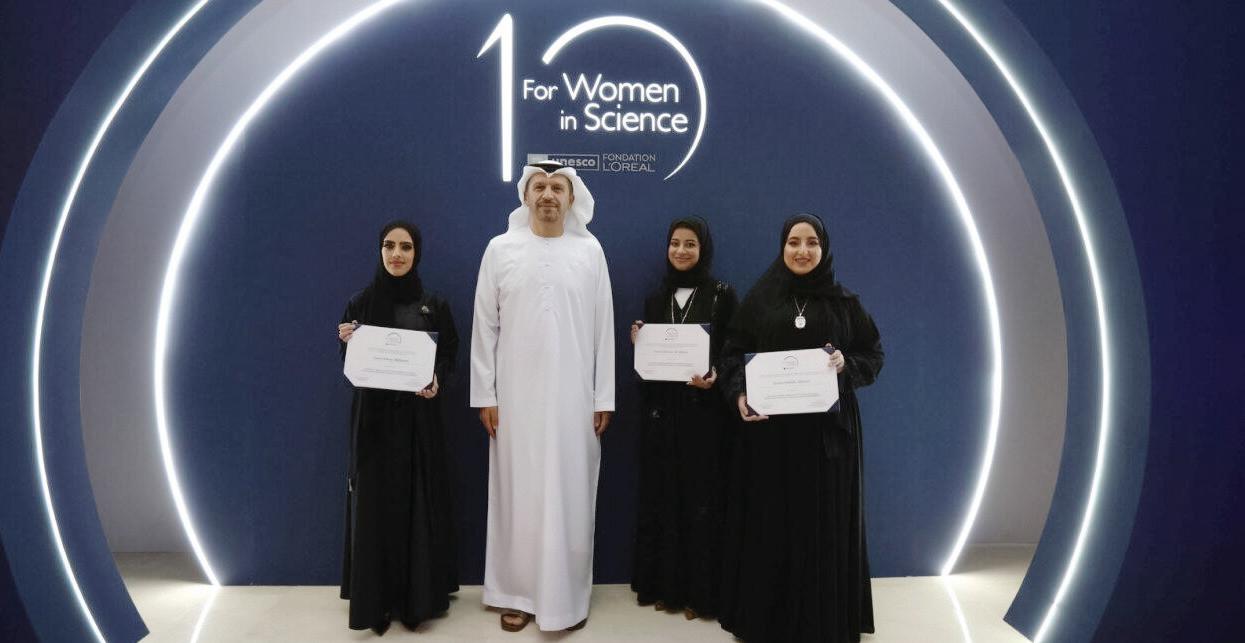
SCIENTISTS HONORED BY L’ORÉAL-UNESCO FOR WOMEN IN SCIENCE MIDDLE EAST REGIONAL YOUNG TALENTS PROGRAM
In a celebration of scientific excellence, Emirati women scientists from Khalifa University were recognized for their exceptional research achievements. Among the honorees was PhD researcher Sara Ishaq Alkhoori who received the Rising Talents Award by the L’Oréal-UNESCO For Women in Science Middle East Regional Young Talents Program 2023. Alkhoori won the award for her research on examining eco-friendly biofuel production to reduce carbon emissions and tackle climate change, yielding universal benefits.
Alkhoori’s exceptional contributions were complemented by the inclusion of Emirati PhD scientist Hessa Ebrahim Ali Alfalahi, who was among the 2022 winners. Alfalahi received the 2022 award for her research on early detection and diagnosis of depression and Parkinson’s disease using smartphone data collected in the wild through novel AI algorithms. Another winner was PhD researcher, Materials Science and Engineering, Dr. Aisha Abdullah Al Khoori for her research on converting carbon dioxide into clean fuel to alleviate global warming and provide a solution for the energy depletion crisis. Both researchers received EUR8,000 each in their category as part of their award.
Joining the 2022 winners, PhD Emirati scientist Halima Alnaqbi, who specializes in Biomedical Engineering, was recognized for her study that focuses on advancing knowledge of genetics, particularly in Arab populations, in order to develop innovative strategies for treating and preventing diseases.
L’Oréal-UNESCO for Women in Science Middle East Regional Young Talents Program has supported the research endeavors of 51 female Arab scientists from the GCC region by awarding endowments worth about AED3.4 million, enabling scientists like that of Khalifa University’s, who play a pivotal role in addressing critical global issues, paving the way forward for more young women to enter STEM fields.
MY CAMPUS, MY COMMUNITY 60 KU TIMES
Dr. Arif Sultan Al Hammadi, Executive Vice-President, Khalifa University with the winners of the Rising Talents Award.
FUTURE PLANS

Dr. Ayesha Alkhoori, Halima AlNaqbi, Hessa Alfalahi and Dr. Sara Alkhoori talk us through their award-winning research projects and next pursuits.
IN CONVERSATION WITH DR. AYESHA ALKHOORI
Can you elaborate on the process and techniques you employed to convert carbon dioxide into clean fuel in your research?
In my research, the process of converting carbon dioxide into clean fuel involves the utilization of specially designed catalysts that facilitate the chemical conversion. These catalysts are developed in the lab using environmentally friendly materials with high performance-to-cost ratios, ensuring both efficiency and sustainability. The key technique employed is the integration of these catalysts into a controlled chemical process that efficiently transforms carbon dioxide (CO2) into methane (CH4) gas, an alternative clean fuel source.
The process begins with the introduction of carbon dioxide into the system, where the catalysts facilitate the conversion through a series of chemical reactions, reducing the activation energy needed to initiate each reaction. This conversion process is designed to be energy-efficient, with optimized temperature and pressure conditions, ensuring the minimal energy input required for the overall transformation. The catalysts play a crucial role not only in accelerating the reaction rate by enabling the conversion of CO2 into CH4 but also selectively producing it, while remaining intact and reusable throughout hours and hours of operation.
Through this innovative approach, we can effectively contribute to reducing the CO2 emissions in the atmosphere, mitigating the impact of global warming. Our current research at Prof. Kyriaki Polychronopoulou’s lab has demonstrated the potential to save approximately 73,000 tonnes of CO2 per year, while simultaneously producing approximately 26,280 tonnes of methane fuel. This clean fuel can serve various industrial purposes, including powering engines and turbines in factories, as well as serving as a precursor for the manufacturing of organic chemicals.
What research or study are you currently involved in?
Currently, I am dedicated to the development of advanced materials and catalysts, drawing upon various classes of substances, including abundant natural clays and perovskites. These materials have been specifically chosen for their notable properties, including abundance in nature and their potential for enhanced performance in catalytic processes, respectively. By utilizing the unique properties of these materials, we aim to push the boundaries of sustainable and efficient CO2 conversion, addressing critical environmental and energy challenges.
The basicity provided by these catalysts facilitates the capture and activation of CO2 by weakening its bonds and expediting its conversion
to CH4. The integration of natural clays in catalyst development shows great promise in promoting sustainability and costeffectiveness. These clays offer abundant raw materials that are easily accessible, contributing to the practicality and scalability of the proposed solutions. Additionally, their intrinsic properties can be customized and refined to enhance catalytic performance, thereby enabling a more efficient conversion of CO2.
On the other hand, perovskites are known for their exceptional catalytic activity and stability, making them ideal candidates for driving efficient CO2 conversion processes. With its unique characteristics, we strive to develop catalysts that exhibit enhanced performance, durability, and sustainability.
Through our focus on these diverse material classes, we aim to pioneer novel approaches that not only address the pressing challenges of global warming and energy scarcity but also pave the way for a more sustainable and environmentally conscious future. By integrating the latest advancements in materials science and engineering, we are dedicated to making significant contributions to the field, with a strong emphasis on innovation, sustainability, and global impact.
IN CONVERSATION
WITH DR. SARA ALKHOORI
What are the key findings of your research involving producing and using biofuels from a renewable source and its impact on tackling climate change?
Biomass-derived bio-oils are relatively unsuitable to directly replace fossil fuel due to the high presence of water and oxygen contents in its compounds. One of the pathways to upgrade bio-oil to biofuels is through hydrodeoxygenation, in which oxygen is removed from the bio-oil compounds in the presence of a catalyst to form high energy density biofuels. My research involves design optimization of catalysts (in particular transition metals supported on zeolite carriers (aluminosilicates)) for the hydrodeoxygenation (HDO) reaction to produce biofuels from palm oil, and aspires thus to tackle the bottleneck of the process, namely deactivation through carbon formation.
Conventional and feasible synthetic approaches like incipient wetness impregnation and hydrothermal synthesis are used in the design of different structural morphologies/dimensionalities of the functional metal oxides and zeolite catalysts. It is worth mentioning that synchrotron-based techniques were utilized in this study, which allowed for precise insights into the catalyst’s structure and composition, enabling a more comprehensive understanding of its catalytic activity.
My developed catalysts have demonstrated great performance, achieving a remarkable 45% conversion of palm oil with significantly higher selectivity towards sustainable aviation fuels (SAFs) and biogasoline. These alternative fuels, derived from renewable sources such as palm oil, contribute to reducing greenhouse gas emissions and mitigating the environmental impact of traditional fossil fuels, as they generally have lower carbon contents.
The aviation industry, in particular, is actively seeking greener alternatives, and the increased selectivity towards sustainable aviation fuels is a crucial step forward in meeting these demands. Bio-gasoline also holds immense promise as a cleaner substitute in the transportation sector, aligning with global efforts to transition towards more sustainable energy sources. The success of my catalysts underscores the potential for innovative solutions to drive the development of cleaner and more eco-friendly fuel options for a greener future.

Dr. Sara AlKhoori is a guest researcher in Prof. Dr. Jeroen Anton van Bokhoven’s research group at ETH Zürich.
What research or study are you currently involved in?
I am currently engaged in groundbreaking research focused on the development of zeolite catalysts for acetone steam reforming to produce hydrogen (H2). This innovative approach aims to harness the potential of acetone, a readily available and renewable feedstock, to generate hydrogen efficiently and sustainably.
Hydrogen holds a pivotal role as a clean and versatile fuel, offering a pathway to decarbonize various sectors, including transportation and industry. Its combustion produces water vapor as the only byproduct, making it a key player in the global transition towards cleaner energy sources.
At present, I am a guest researcher in Prof. Dr. Jeroen Anton van Bokhoven’s research group at ETH Zürich, to gain hands-on experience and training in Nuclear Magnetic Resonance (NMR) spectroscopy. Prof. Bokhoven is a renowned figure in the field of catalysis and biofuel production, and this internship represents a significant advancement for my research. Training on NMR spectroscopy under Prof. Bokhoven’s guidance allows me to acquire cutting-edge analytical skills crucial for unraveling the intricacies of catalytic processes. Access to state-of-the-art facilities and collaboration with top scholars fosters a rich learning environment, propelling my research to new heights. The affiliation with Prof. Bokhoven and ETH Zürich elevates the visibility and significance of my work, ensuring its recognition and impact in the scientific community at large.
MY CAMPUS, MY COMMUNITY
MY CAMPUS, MY COMMUNITY 62 KU TIMES
IN CONVERSATION WITH HALIMA ABDALLA KHAMIS AHMED ALNAQBI

How does your study help in the treating and preventing of genetic diseases, particularly in Arab populations?
The inclusion of Middle Eastern populations in genomic studies has been inadequate, constraining our knowledge of the population's unique genetic variations associated with increased risk. The application of precision oncology, relying on established markers, has been found less effective in this context due to the unique genetic makeup of the population. This is due to the population’s unique genetic makeup, which is influenced by common cultural practices within the community including consanguinity. By studying the genetics of the Arab population, we are not only enriching the currently available global genome databases but also hold great promise for establishing the framework for a more personalized and precise medical care in the region.
What research or study are you currently involved in?
I am now involved in many research projects, particularly focused on multi-omics studies. Multi-omics refers to the comprehensive examination and integration of several forms of data, such as genomes, proteomics, and metabolomics. This multidisciplinary approach provides a comprehensive viewpoint on illnesses and their fundamental processes. The utilization of multi-omics has the potential to bring about a paradigm shift in our comprehension of complex diseases. Our present study focuses on integrating genomes data with proteomics and metabolomics information to reveal complex molecular fingerprints. These characteristics provide crucial insights into the pathways of illnesses, particularly offering new opportunities for comprehending and addressing diseases such as cancer and diabetes.
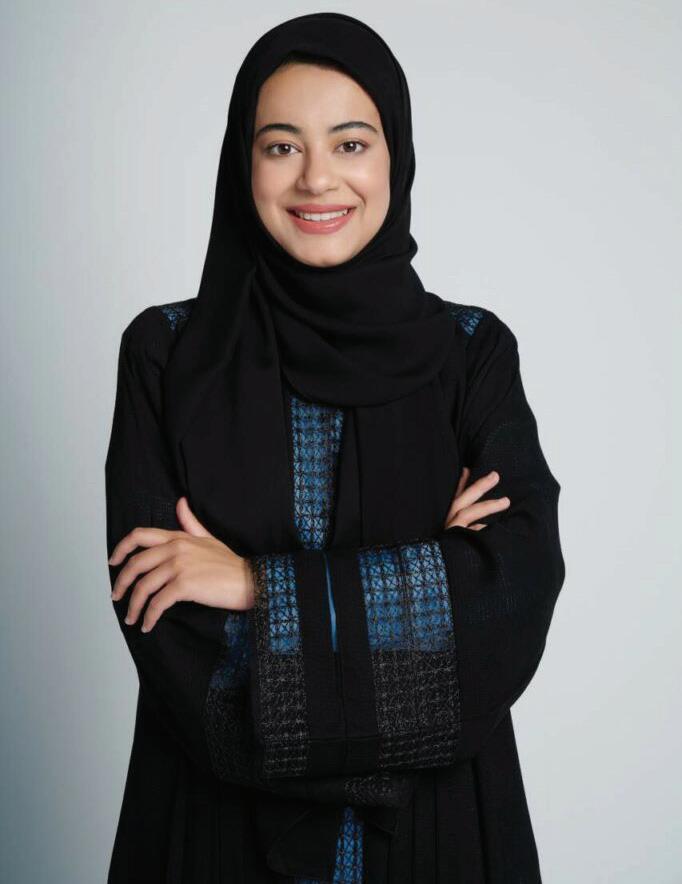

IN CONVERSATION WITH HESSA EBRAHIM ALI MEJLAD ALFALAHI
What does your research on the detection and diagnosis of depression and Parkinson’s disease involve?
My research uses data collected through novel Artificial Intelligence algorithms. It looks at leveraging AI algorithms for the early detection of depression using smartphone data. By looking at finger kinematics during typing captured as a series of timestamps of key presses and key releases, I aim to be able to detect early psychomotor impairment which, in turn, can lead to the passive and early diagnosis of depression. Early diagnosis of these disorders is crucial for proper symptom management and sustained quality of life.

CHEMICAL ENGINEERING SENIORS TRIUMPH IN UAE'S 'UNIVERSITY CHALLENGE' WITH SUSTAINABLE DEVELOPMENT PROJECT
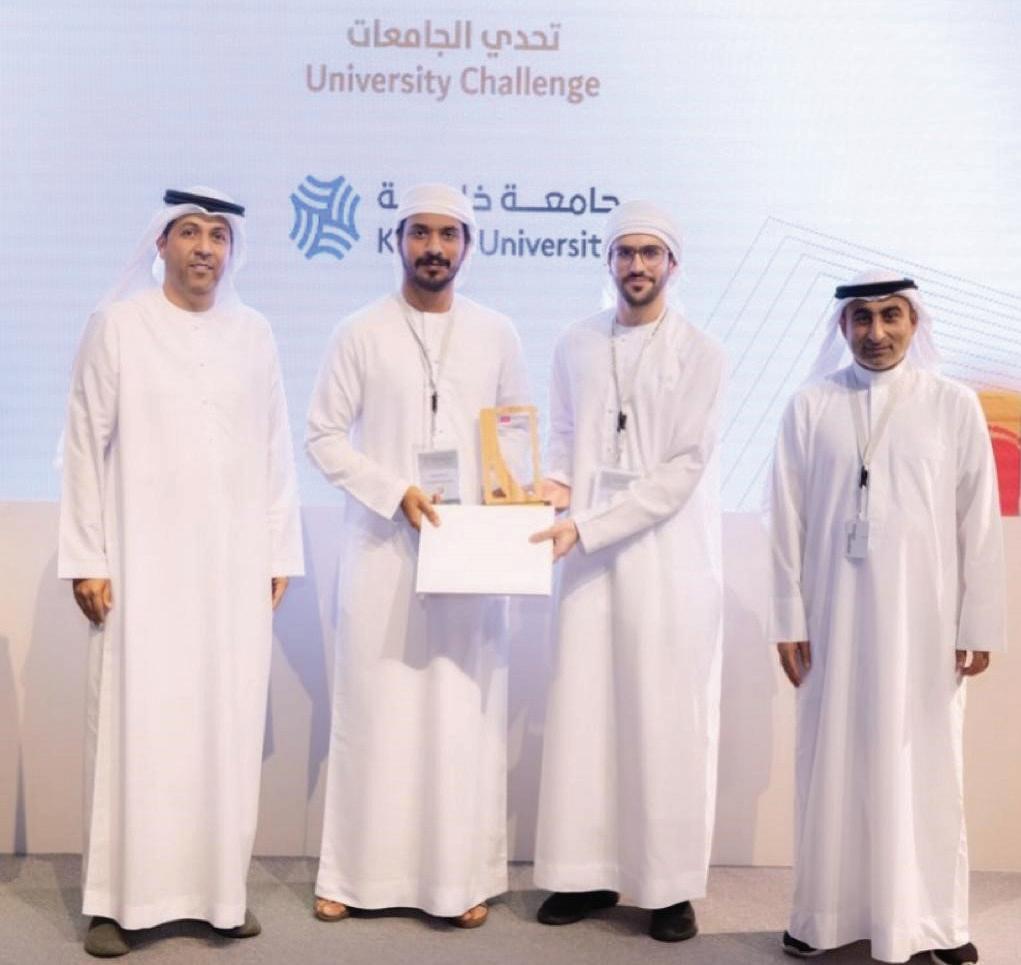
Chemical Engineering seniors, Jassem Al Hamadi, Fahad Alrashed, and Mohammad Hassan, from Khalifa University were selected among the top five winning teams in the recently held 2nd edition of the University Challenge, organized by the United Arab Emirates University (UAEU) in collaboration with the Sharjah Government Communication Award, on the sidelines of the International Government Communication Forum 2023. The Award included a certificate of appreciation with the Universities’ Challenge Shield.
A judging panel of experts in government communication declared the winning teams of the Challenge that featured a total of 23 teams from 15 universities from across the region. Apart from 12 universities from the UAE, overseas institutions that participated include Sultan Qaboos University, Cairo University, and the University of Jordan.
Each team presented a project related to promoting the concept of sustainability in government communication, in line with the Year of Sustainability 2023 and COP28 Summit. In response to this theme, the Khalifa University seniors presented their project titled ‘Istidama Smart Platform’, designed to empower
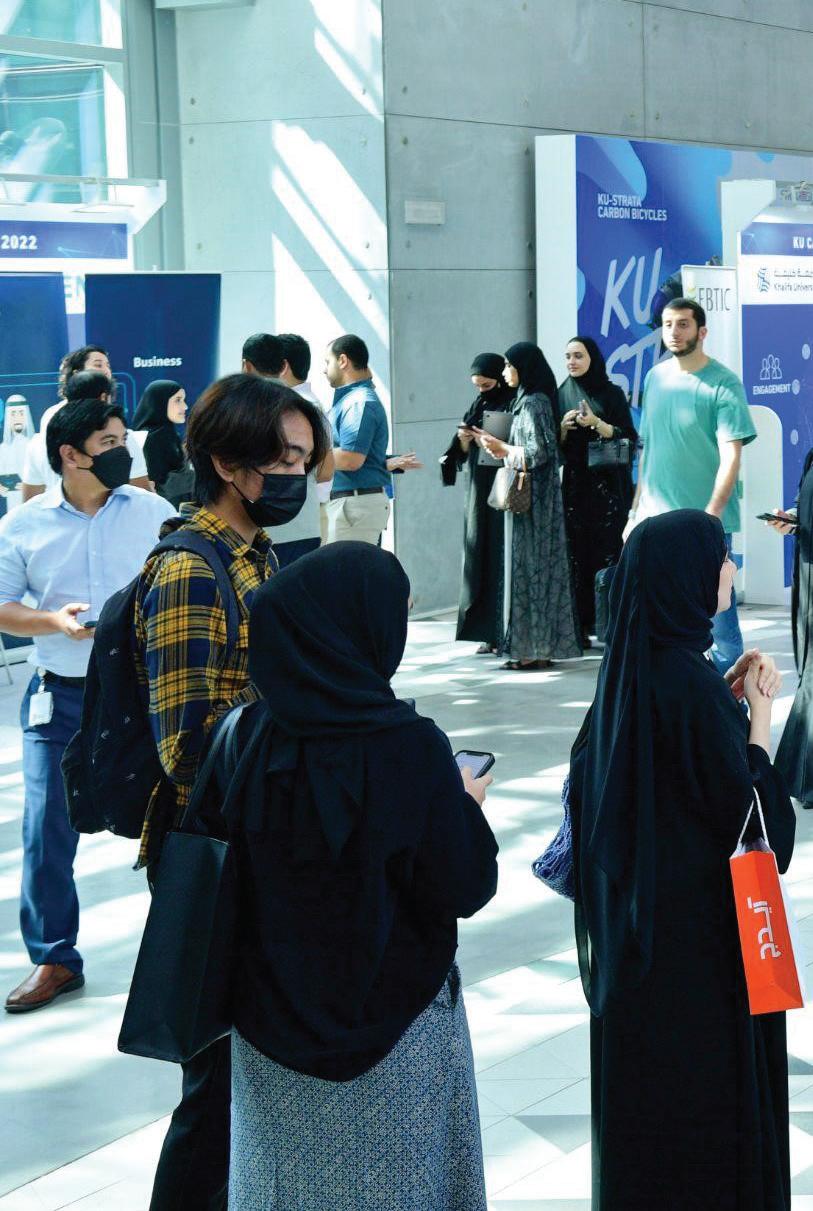
homeowners by providing them with affordable services that enhance energy efficiency, water conservation, and the adoption of renewable energy sources within UAE households.
Aiming to address the pressing environmental challenges in the region and across the globe, Al Hamadi, one of the team members, highlighted the importance of sustainable development and emphasized the positive impact their project could have on the environment and society as a whole. He also expressed his pride in his teammates, Alrashed and Hassan, for their dedication and hard work.
The competition served as a platform for young professionals to showcase their creativity and knowledge in addressing real-world challenges, while also recognizing how such initiatives contribute to the overall growth of the UAE’s academic and research landscape.

MY CAMPUS, MY COMMUNITY 64 KU TIMES
Chemical Engineering seniors, Jassem Al Hamadi, Fahad Alrashed, and Mohammad Hassan, from Khalifa University.
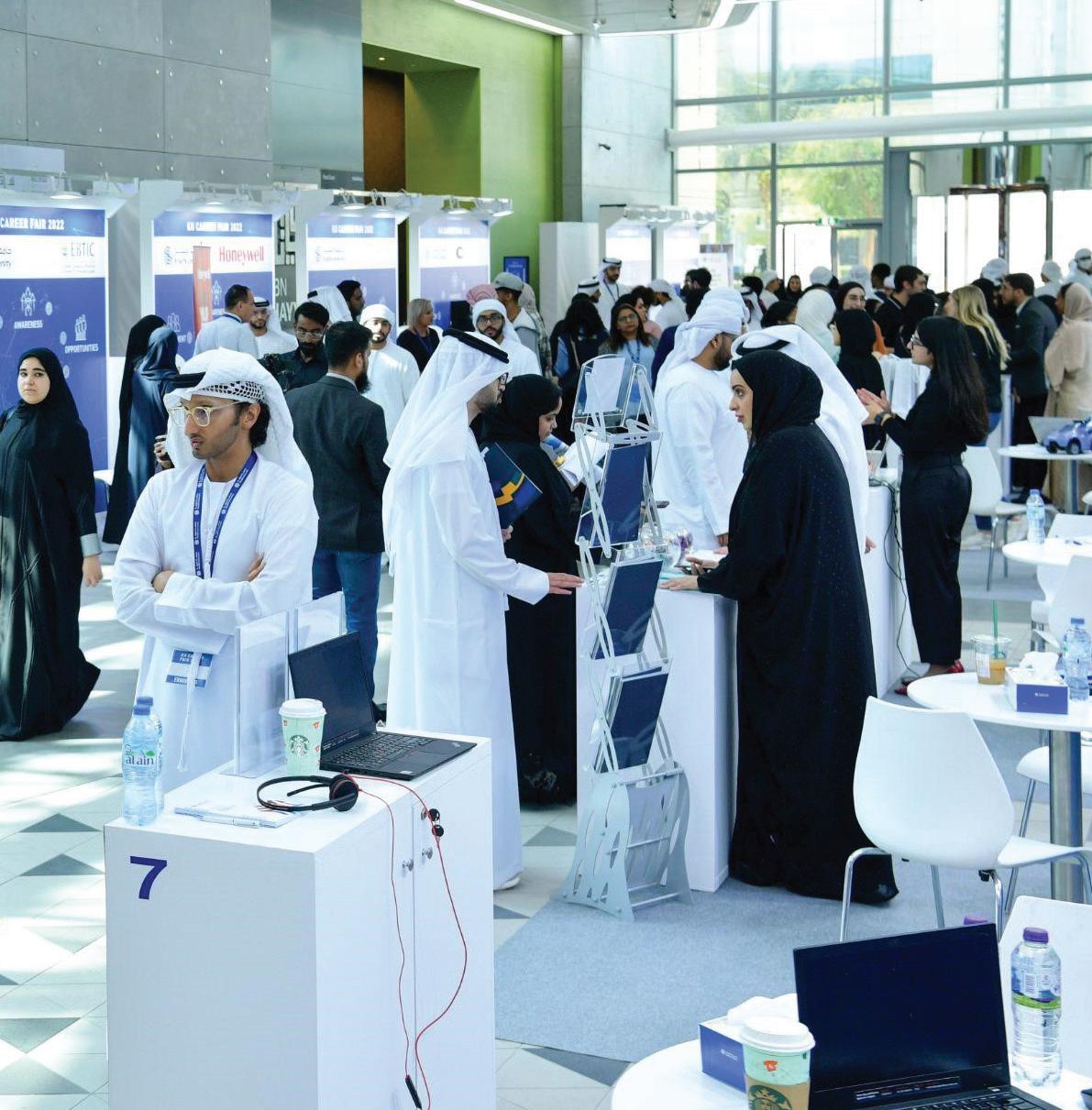

AROUND 50 GOVERNMENT AND PRIVATE SECTOR ENTITIES
TALENT BASE AT ANNUAL CAREER FAIR 2023
Serving as a platform for Khalifa University students to connect with a diverse range of employers from both the government and private sectors, the Annual Career Fair involved around 50 participating companies, including over 15 government entities and 33 private organizations, turning the Career Fair into a bustling hub of opportunities and connections.
The Career Fair is an integral part of the university’s commitment to nurturing talent and facilitating successful career paths. It offers attendees a unique chance to explore various career options, learn about job openings, and gain valuable insights from industry professionals. The event provides a conducive environment for networking, workshops, and even on-site interviews, enabling job seekers to make connections and secure employment.
The event began with a welcome speech by Dr. Yousof Al Hammadi, Assistant VicePresident, Graduate Studies, Associate Professor, Electrical Engineering and Computer Science who set the tone for the Career Fair, highlighting the importance of bridging the gap between talent and employers and emphasizing the valuable opportunities that lie ahead for attendees.
MY CAMPUS, MY COMMUNITY KU TIMES 65
KHALIFA UNIVERSITY’S
EXPLORE
The Career Fair is an integral part of the university’s commitment to nurturing talent and facilitating successful career paths.
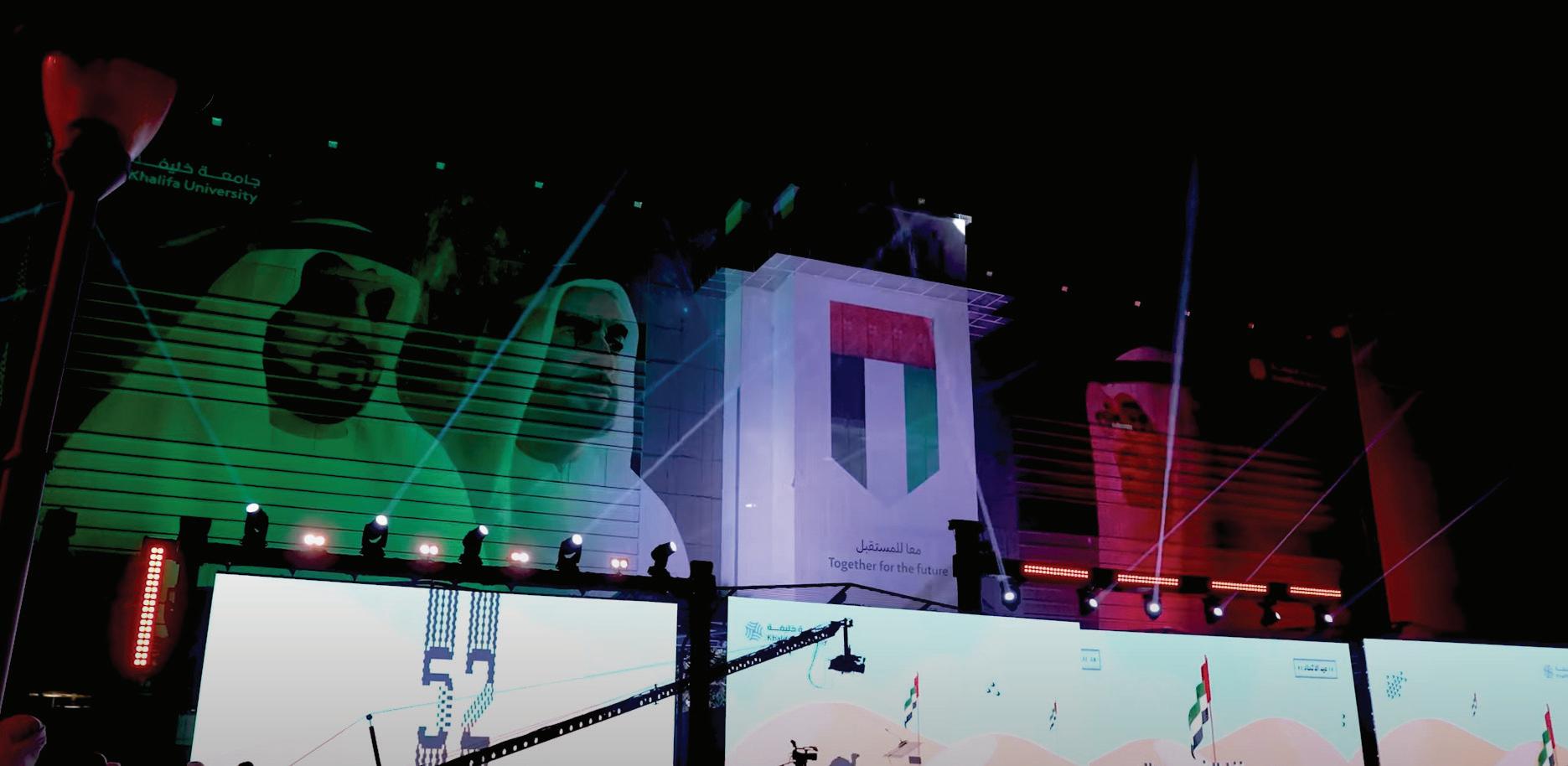
SPECTACULAR 52ND UAE UNION DAY CELEBRATIONS AT KHALIFA UNIVERSITY
In a grand celebration of the 52nd UAE Union Day, the Main Campus was adorned with festivity and patriotism. The event began with a heartfelt tribute to the UAE, as attendees joined in the singing of the UAE National Anthem, performed by the KU Music Club.
The theme of unity and sustainability took center stage for the 52nd UAE Union Day celebrations across the country, highlighting the UAE’s efforts to build a sustainable future, raise awareness about the importance of preserving natural resources, promoting renewable energy, and fostering eco-friendly practices among its citizens.
Professor Sir John O’Reilly delivered the opening remarks, emphasizing the importance of unity and collaboration in achieving a sustainable future. Shahad Edyen Ali Sultan Alkaabi, the President of the Khalifa University Student Council, took the stage to share her vision and aspirations on behalf of the talented student body.
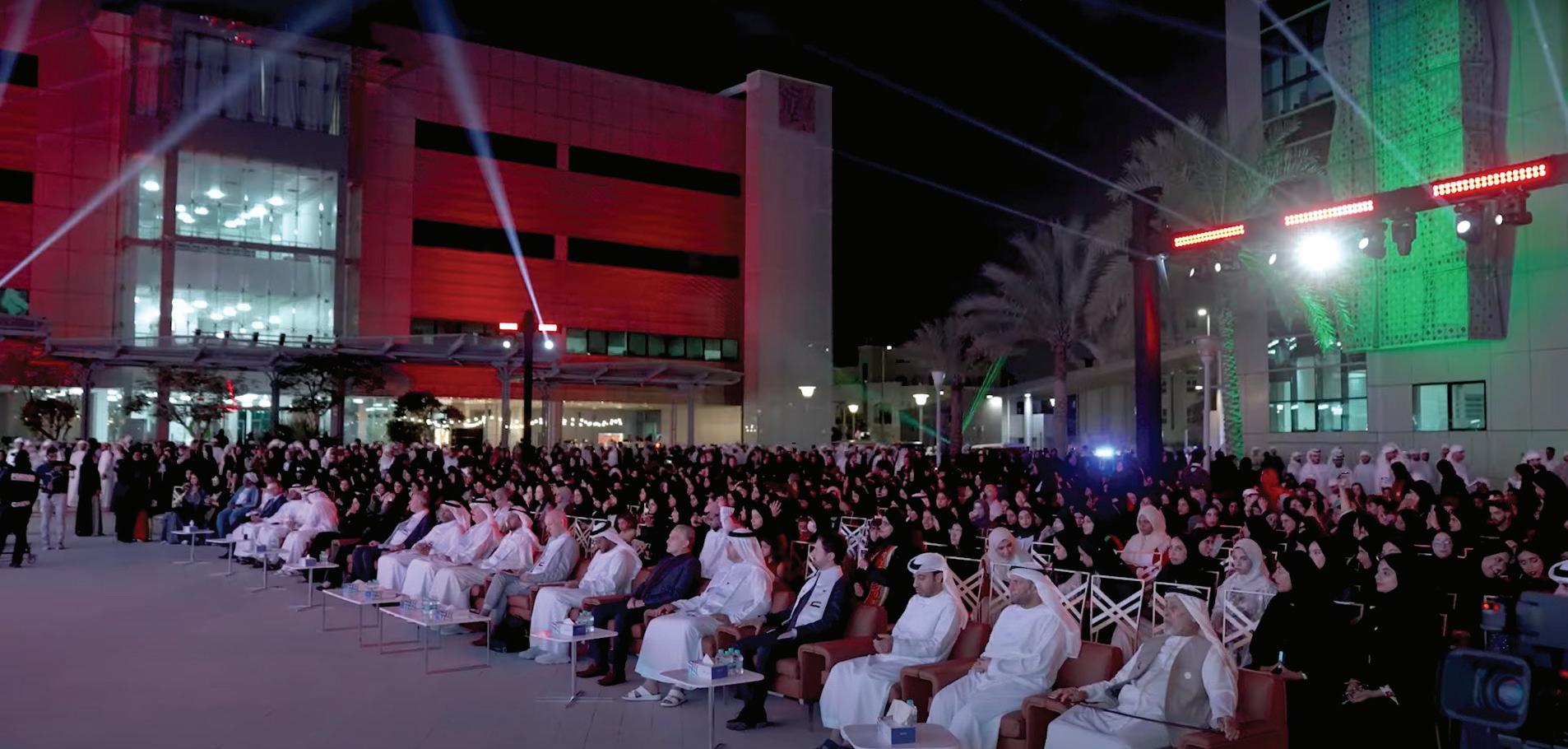

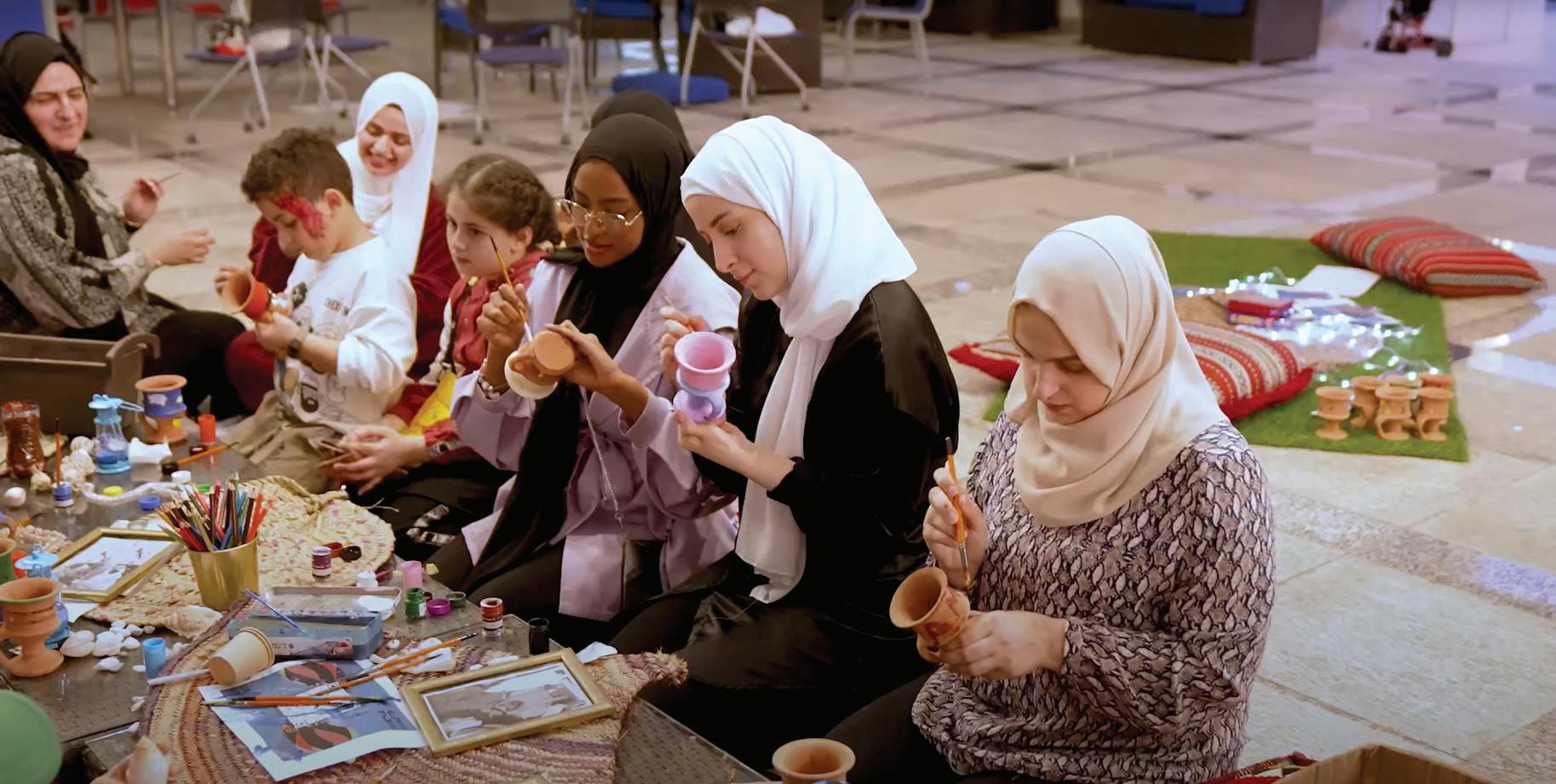
As the centerpiece of the evening’s festivities, the main show offered a splendid display of colors that showcased the diverse and vibrant tapestry of the UAE. Attendees were also treated to musical performances that celebrated the country’s heritage and cultural richness.
MY CAMPUS, MY COMMUNITY 66 KU TIMES
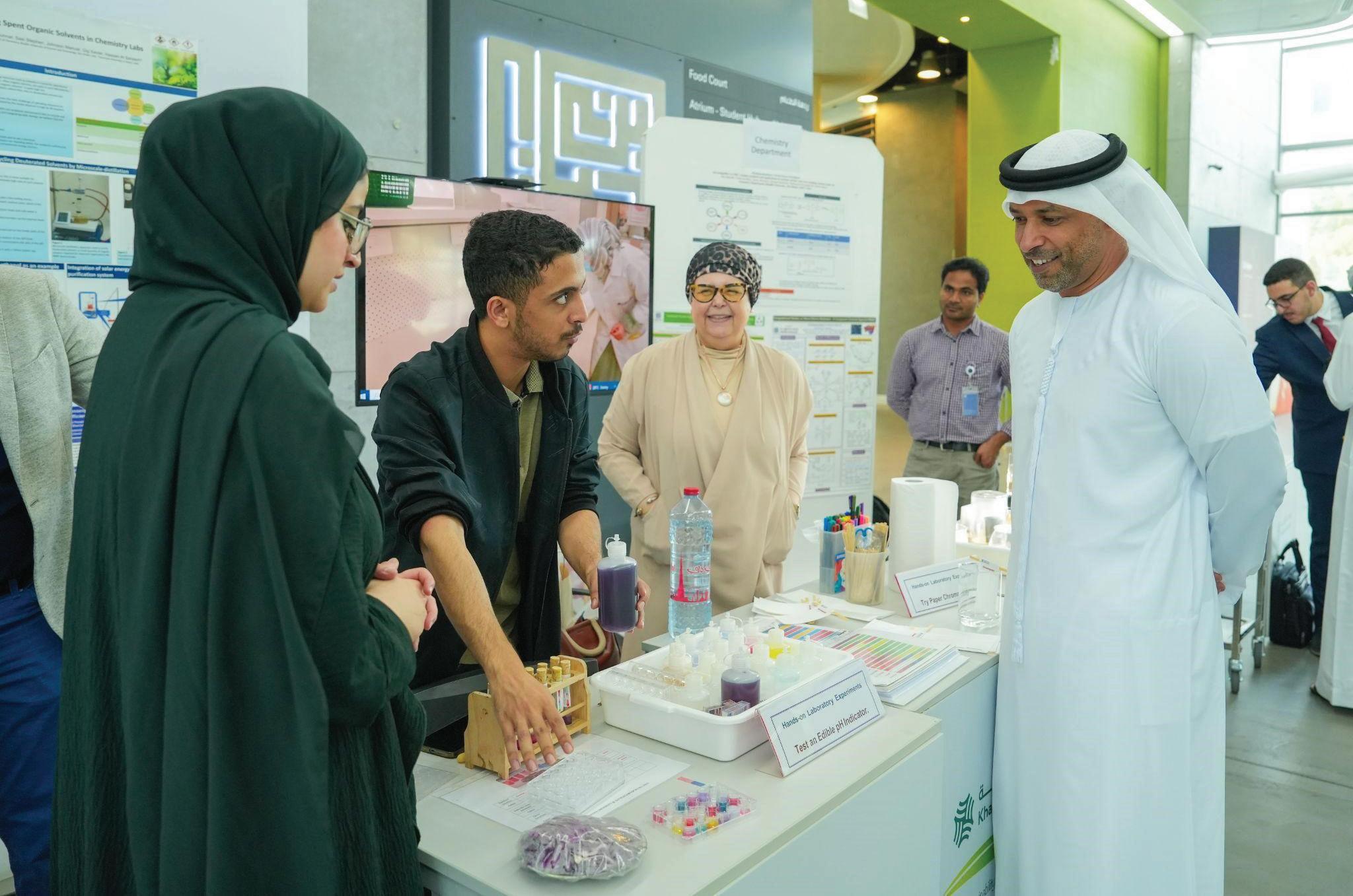

Khalifa University, known for its commitment to innovation and sustainability, held an exhibition that showcased 40 sustainability projects at the Main Campus, aimed to inspire and educate visitors about the importance of sustainable practices and their potential to address pressing environmental challenges.
Some of the projects on display focused on curbing plastic pollution, biodegradables like the natural, stretchable and conductive hydrogel for wearable technology as well as the development of pH-Responsive Adsorptive ultra filtration membrane for the treatment of heavy metals from aqueous solutions. Other projects talked about medical waste and included a sustainable source for regenerative medicine through upcycled stem cells.
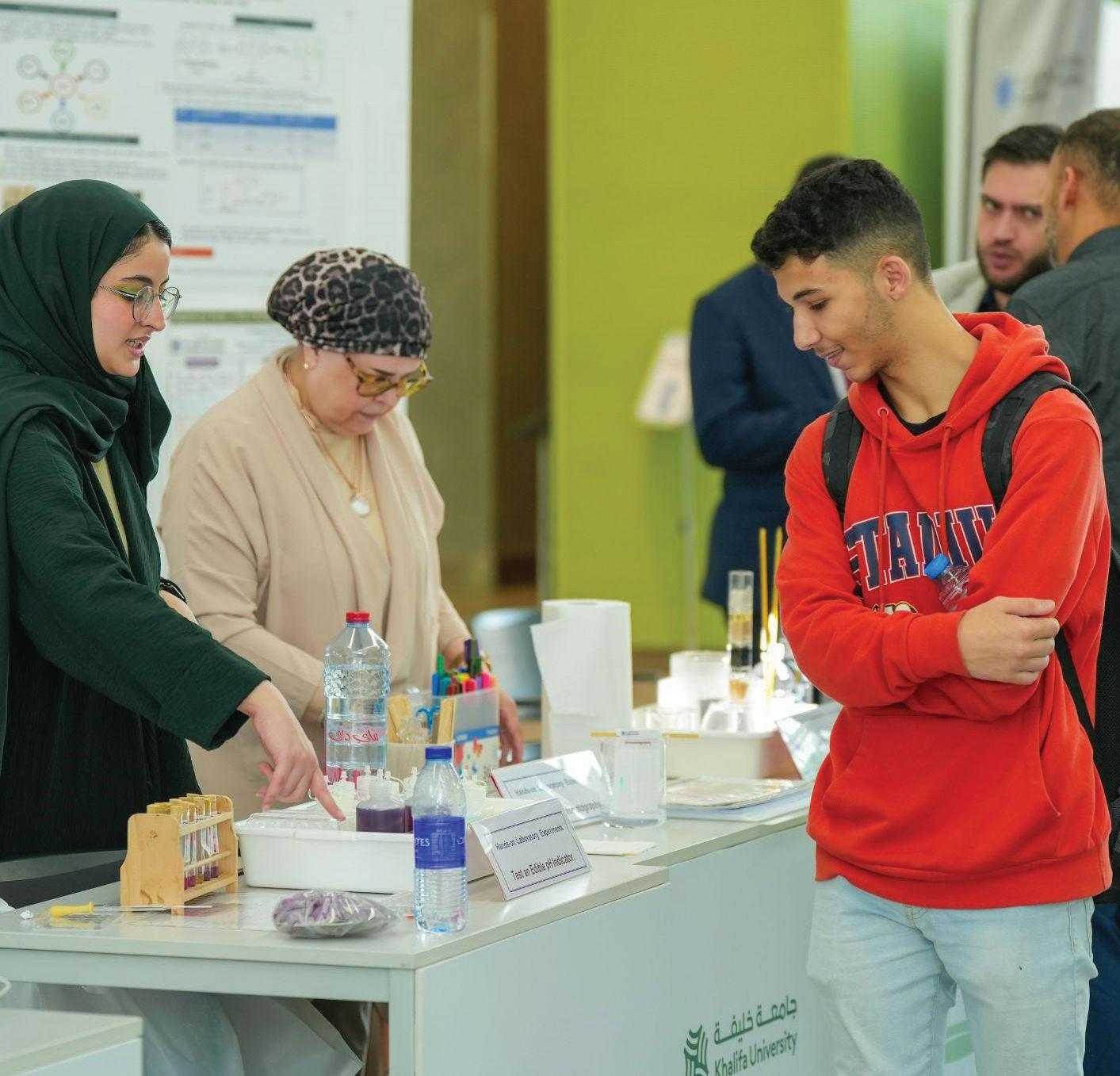
A LOOK AT THE 40 SUSTAINABILITY PROJECTS
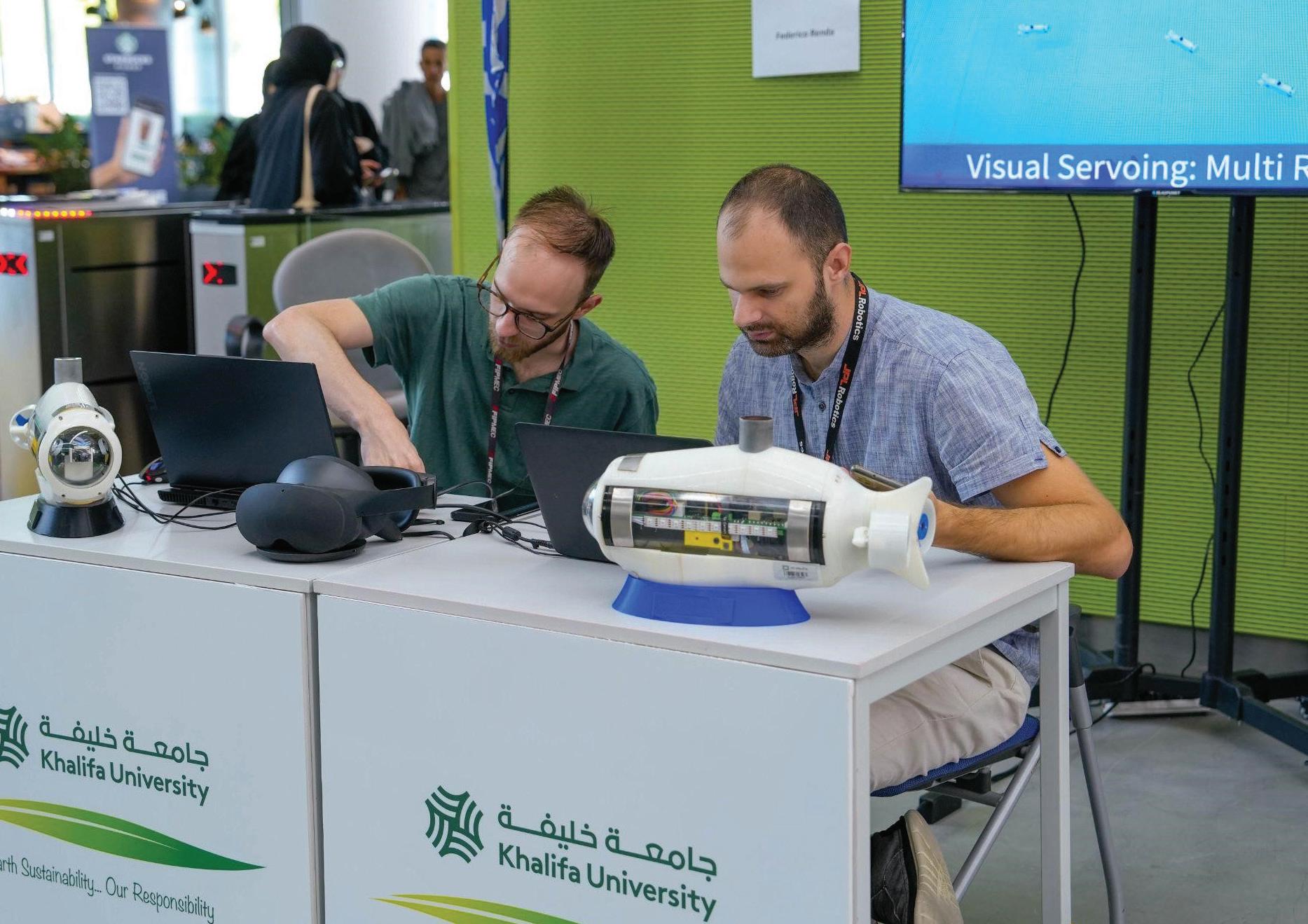
Showcasing a diverse range of projects, from edible pH indicators to wireless charging for electric vehicles, the event encouraged visitors to explore the potential of sustainable practices across various domains. By inspiring and educating the community, this exhibition played a vital role in promoting a greener and more sustainable future.
Dr. Ebrahim Al-Hajri, Senior Vice-President, Support Services, Khalifa University at the Sustainable Project Exhibition at the Main Campus
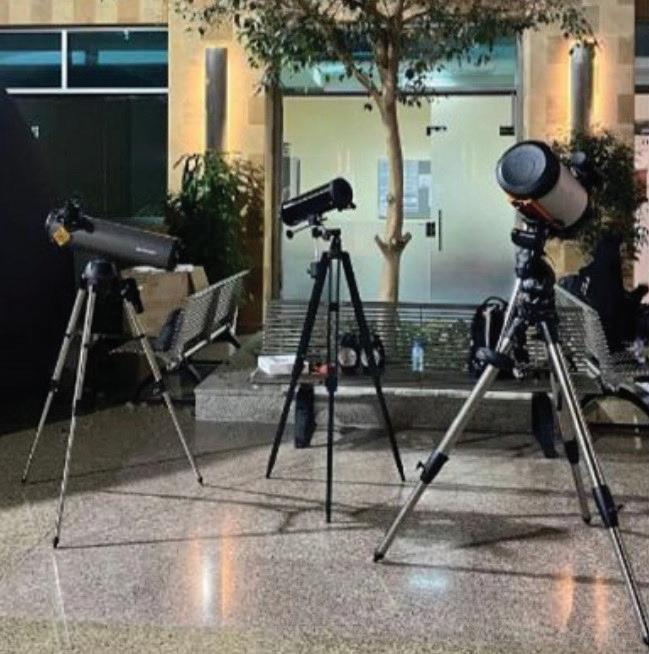
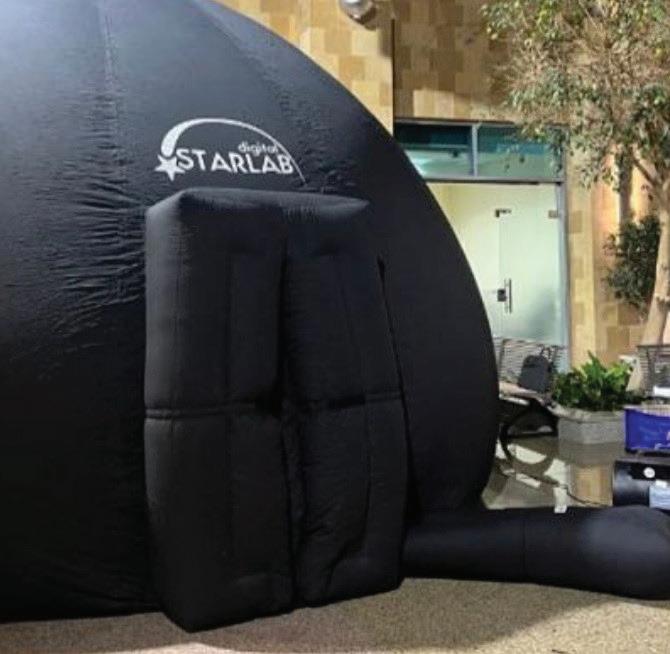
ASTRONOMY DAY PROMOTES PHYSICS AND ASTROPHYSICS IN THE UAE

Khalifa University hosted an ‘Astronomy Day’ exhibition and series of activities to promote the fields of Physics and Astronomy in the UAE, showcasing the wonders of the universe and inspiring the public’s interest in these scientific disciplines.
Astronomy enthusiasts and the general public attended this extraordinary opportunity to engage in live telescope observations of celestial objects, at the event held at Habshan Building, in Khalifa University’s Sas Al Nakhl (SAN) Campus.
Dr. Arjen René Van Vliet, Assistant Professor, Physics, who was involved in organizing the ‘Astronomy Day’ discussed and interacted with experts and astronomy enthusiasts.
Visitors tried Khalifa University VR headsets and explored an inflated black dome. An interactive seminar presented about space and the universe was also held.
MY CAMPUS, MY COMMUNITY 68 KU TIMES
Astronomy Day exhibition involved live telescope observations of space and other activities inside the ‘black dome.’
ALUMNI SPOTLIGHT
ALUMNI SPOTLIGHT
Stories about shared connections
KHALIFA UNIVERSITY ALUMNI REUNION 2023 CELEBRATES ACHIEVEMENTS AND CONNECTIONS
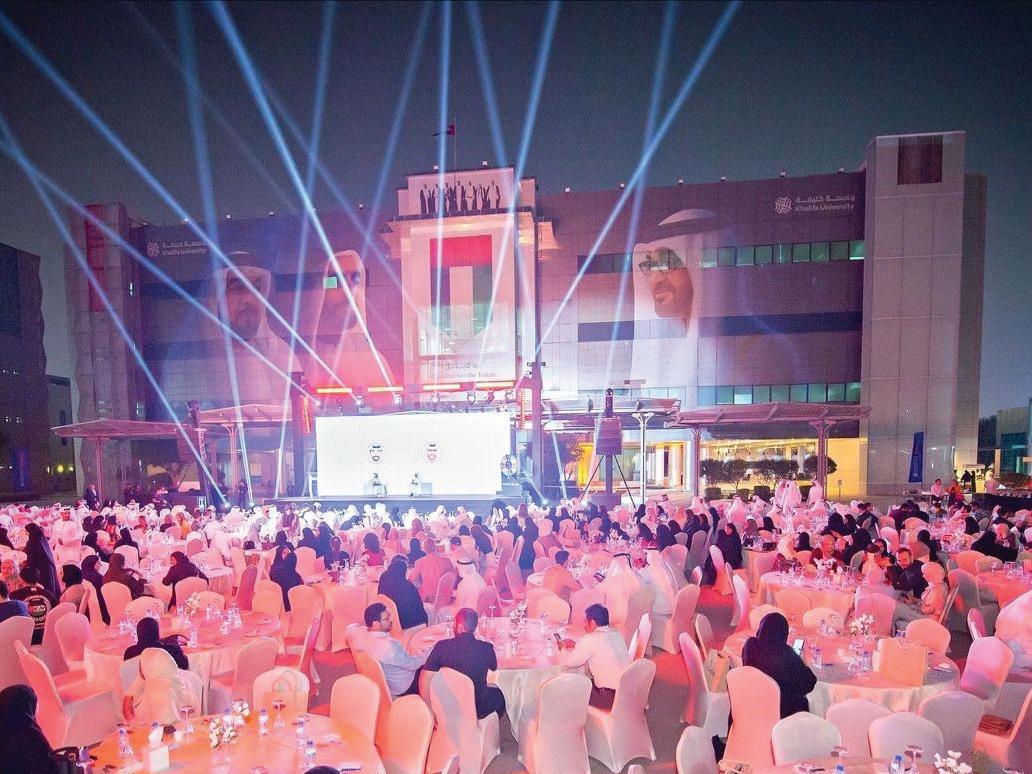

On a momentous evening at the Main Campus, the second KU Alumni Reunion brought together a vibrant community of individuals from several graduate courses. Building upon the success of the previous year, where around 500 alumni attended, this year’s reunion aimed to celebrate the accomplishments of its graduates and foster a strong network of KU alumni.
Dr. Ebrahim Al-Hajri, Senior Vice President, Support Services, Khalifa University, who delivered the welcome address, emphasized the notable achievements of the institution and the alumni.
The evening continued with a unique activity, where attendees were encouraged to express their gratitude and appreciation to staff, faculty members, and fellow alumni by writing short messages. A special highlight of the event was a captivating video showcasing the remarkable journeys and accomplishments of outstanding Khalifa University alumni, celebrating the collective success of their peers.
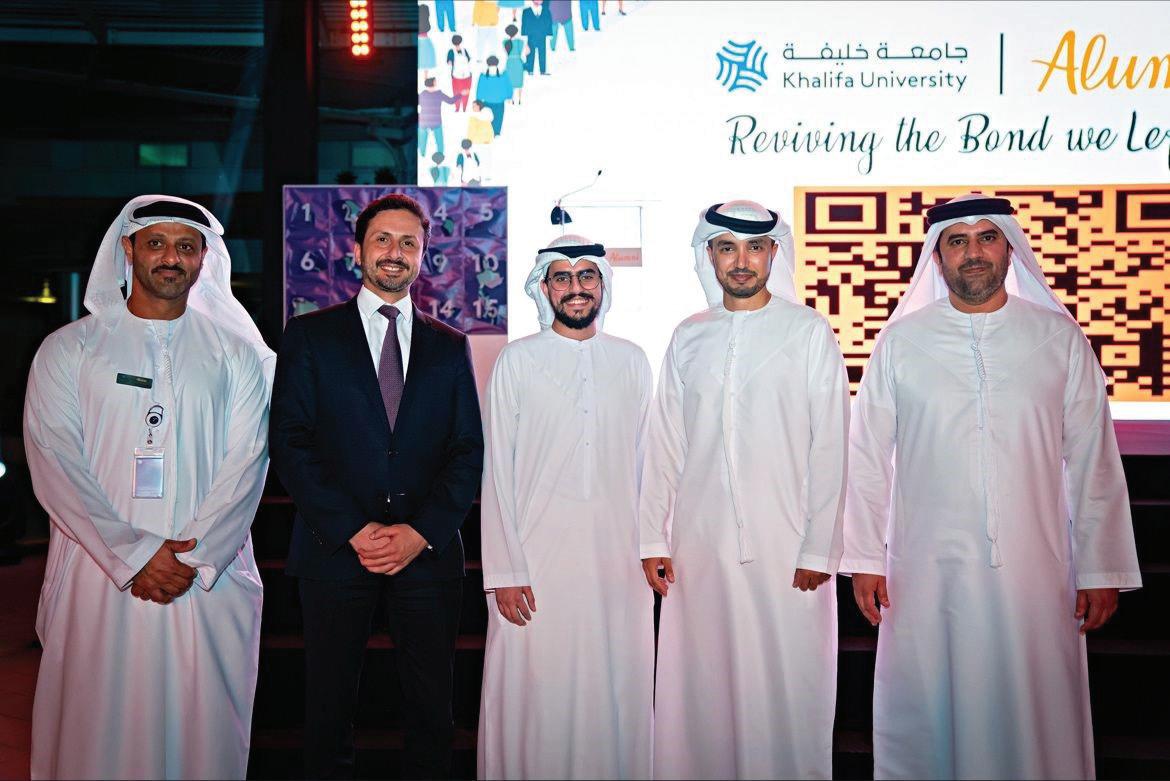
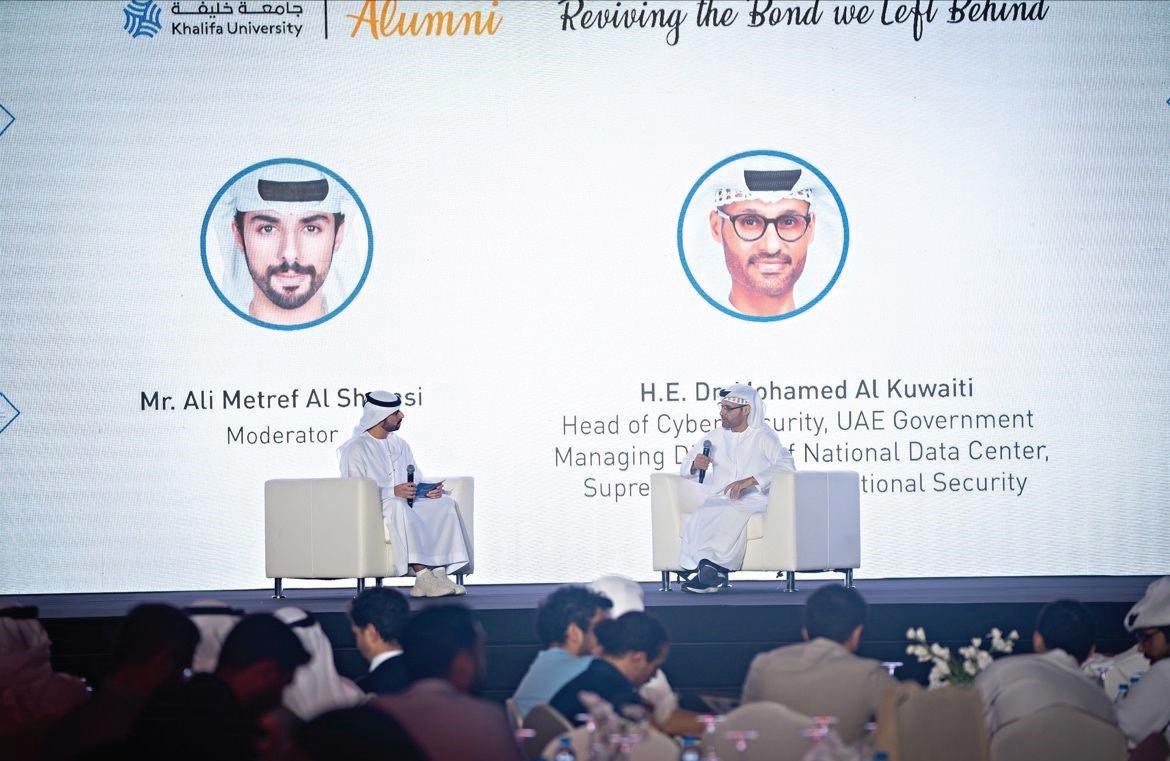
Several members of the Khalifa University management team took turns reading out the heartfelt messages written by alumni, further highlighting the deep appreciation and connections within the alumni community.
ALUMNI SPOTLIGHT KU TIMES 69 MY CAMPUS, MY COMMUNITY KU TIMES 69 ALUMNI SPOTLIGHT KU TIMES
The rest of the evening continued with an engaging interaction between student moderator Ali Metref Alshamsi and the guest speaker, His Excellency Dr. Mohammed Al Kuwaiti. Their conversation provided valuable insights and perspectives on current affairs and the importance of continued engagement with the university.
Excitement filled the air as a raffle draw commenced, with Mohamed
The KU Alumni Reunion 2023 brought together a vibrant community of individuals from several graduate courses.
Al Ozaibi, President Office Manager, revealing the winners.
Dr. Ebrahim Al Alkeem, President, Khalifa University’s Alumni Association Council (KUAAC), took the stage to deliver a speech that evoked memories of the past.
A session with His Excellency Dr. Mohammed Al Kuwaiti.
KHALIFA UNIVERSITY ALUMNI SHINE WITH REMARKABLE ACHIEVEMENTS
Khalifa University takes immense pride in the accomplishments of its alumni, who continue to make significant contributions in diverse fields. These outstanding individuals exemplify the institution’s commitment to excellence and innovation, showcasing the impact of their education and experiences at Khalifa University.
H.E Dr. Mohammad Hamad Al-Kuwaiti, a distinguished alumni, has achieved remarkable success in the field of cybersecurity. As the Head of Cyber Security, UAE Government, Chairman, UAE Cyber Security Council, and Managing Director, National Data Centre under the Supreme Council for National Security, Dr. Al-Kuwaiti is at the forefront of safeguarding the nation’s digital landscape. His exceptional work is recognized internationally, as he received the Global Leadership Award as part of the 2023 Cybersecurity Excellence Awards during the GISEC Global 2023 event. Additionally, he was honored with the 2023 International Telecommunication Union’s Ethical Dimensions of the Information Society award.
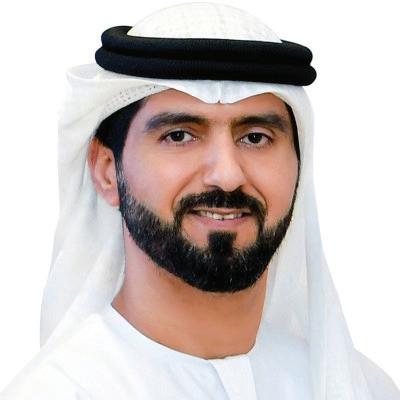
Khaled Al Shehhi, an accomplished alumni, makes a significant impact in the field of marketing and communication. Serving as the Executive Director, Marketing and Communication, UAE Government Media Office, Al Shehhi has received numerous accolades for his leadership and innovation.
His notable achievements include the Loeries Marketing Leadership and Innovation Award 2023, the Advertising Person of the Year at the Dubai Lynx 2023, and the World Media Award (WMA) for Content Leadership & Innovation for 2022. He was also honored with the Honorary Award of the 2022 Effie MENA
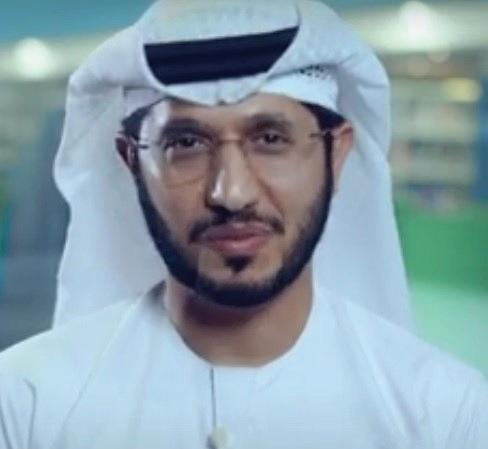
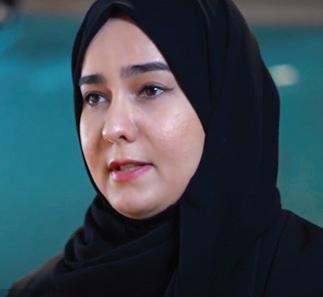
Haleema Al Hosani achieved great success in the banking sector. As the Assistant Vice-President, Emirates National Bank of Dubai, Al Hosani showcases exemplary dedication and accomplishments in her field. Her achievements reflect the high caliber of education and training received at Khalifa University. Al Hosani holds a Master’s degree in National and International Security, further highlighting the university’s commitment to producing professionals who excel in their respective industries.

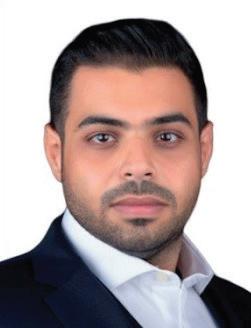
Dr. Saeed Mubarak Kharbash, a Khalifa University graduate from the class of 2004, makes remarkable contributions to the artistic and cultural landscape of the nation.
As the CEO of Arts and Literature, Dubai Culture and Arts Authority, Dr. Kharbash exhibits exceptional leadership in promoting artistic endeavors. His efforts enrich the cultural fabric of the UAE, further solidifying Khalifa University’s commitment to fostering well-rounded individuals.
Tarek Fouad and Mahmoud Adi, two alumni, have made significant contributions in the world of venture capital, particularly in the gaming industry. Fouad serves as a Partner at Shorooq Partners, while Adi is a Founding Partner of the same organization. Their success highlights the entrepreneurial spirit instilled by Khalifa University and the impact its graduates have on the business landscape.
Dr. Ebrahim Al Alkeem, an esteemed alumnus and the President of the Khalifa University Alumni Association, has been recognized as a ‘Strategic’ Chief Information Security Officer (CISO) for his outstanding contributions to cybersecurity. His expertise in digital transformation, cybersecurity, and AI is highly regarded, further elevating the reputation of Khalifa University in these critical fields.
ALUMNI SPOTLIGHT
KHALED AL SHEHHI, EXECUTIVE DIRECTOR, MARKETING AND COMMUNICATION, UAE GOVERNMENT MEDIA OFFICE.
DR. SAEED MUBARAK KHARBASH, CEO, ARTS AND LITERATURE, DUBAI CULTURE AND ARTS AUTHORITY.
TAREK FOUAD, PARTNER AND MAHMOUD ADI, FOUNDING PARTNER, SHUROOQ.
HALEEMA AL HOSANI, ASSISTANT VICE-PRESIDENT, EMIRATES NATIONAL BANK OF DUBAI.

MARK YOUR CALENDAR MARK YOUR CALENDAR

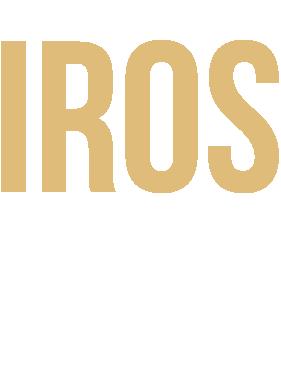
INTELLIGENT ROBOTS SYSTEM (IROS) 2024
Established in 1988, IROS provides a platform for the international robotics community to exchange knowledge and ideas about the latest advances in intelligent robots and smart machines. It is one of the largest and most important robotics research conferences in the world, attracting researchers, academics, and industry professionals from around the globe, representing manufacturing, healthcare,
logistics, agriculture, defense, security, and mining sectors with 60% of attendees having over six years of experience in Robotics.
A major component of the conference experience for all attendees will be the IROS exhibits of the latest robotics technologies and products. A variety of activities will also take place as part of the exhibition, including poster sessions, keynotes, panel discussions, and networking events.
MARK YOUR CALENDAR KU TIMES 71
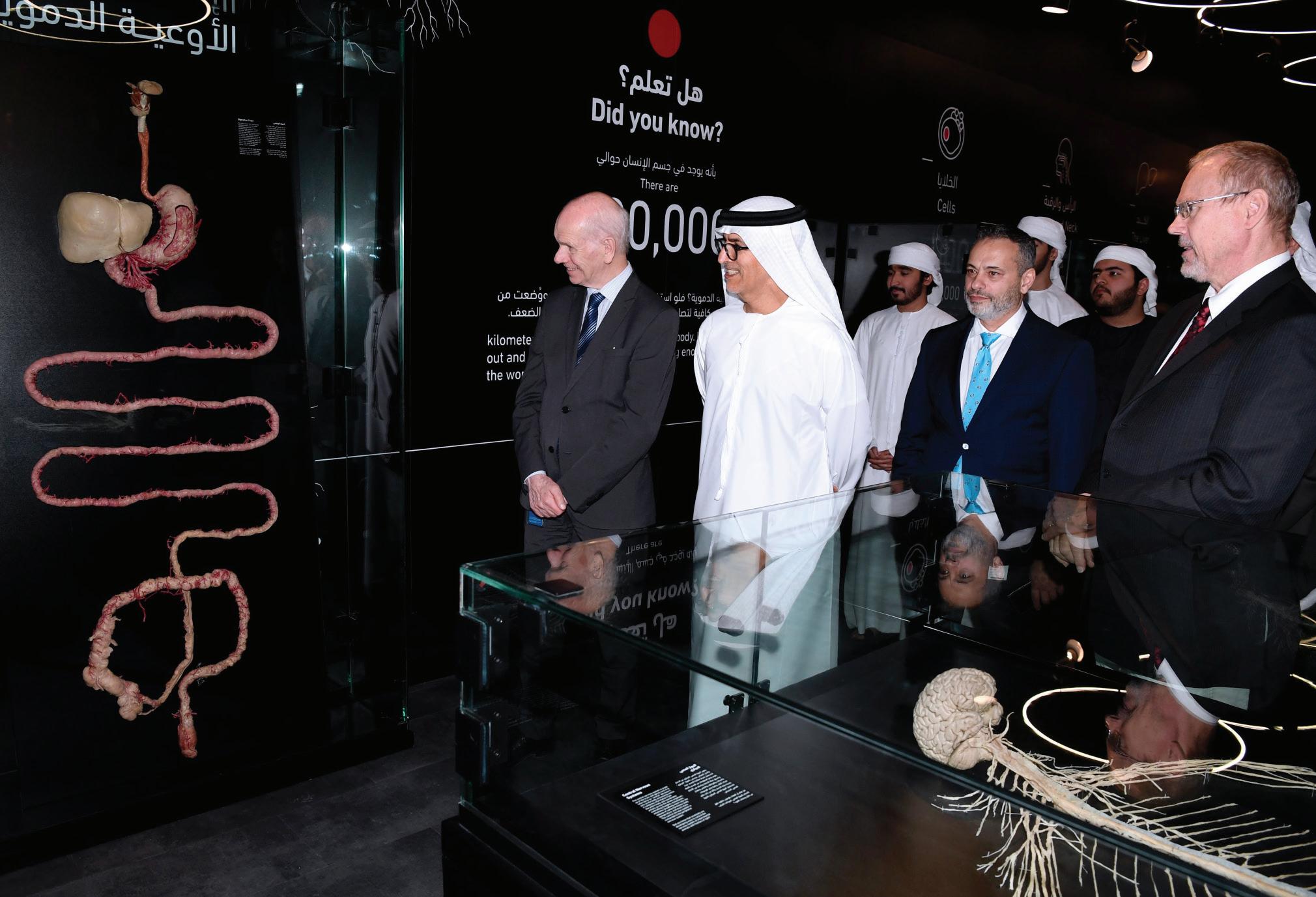

DISCOVER THE WONDERS OF THE HUMAN BODY AT THE BODY MUSEUM BY BODY WORLDS

The Body Museum at Khalifa University, which is the UAE’s first permanent exposition of ‘plastinated’ and dissected human bodies offer a perfect opportunity to learn and appreciate the complex anatomical structures that enable our existence.
Designed to inspire and educate, the Body Museum aims to ignite a passion for medicine, health, and life sciences among students, young professionals, and visitors of all ages, encouraging them to consider these subjects for their university education.
One of the museum’s key highlights is a dedicated section that sheds light on the effects of lifestyle diseases and pathological processes on human organs. This informative display serves as a valuable reminder of the potential dangers associated with neglecting
health-related warnings. Through this the museum aims to motivate both young and old alike to adopt healthier lifestyles and make choices that safeguard their well-being.
By visiting the Body Museum, guests and visitors will leave with a renewed sense of awe and respect for their own bodies. The museum’s displays showcase the incredible complexity and beauty of the human form, serving as a reminder of the importance of self-care and nurturing a healthy lifestyle.
Admission to the Body Museum is free of charge, ensuring that everyone has the opportunity to explore this fascinating exhibition. We invite you to embark on a captivating journey through the wonders of the human body and discover the secrets that lie within


2ND ANNUAL FORUM FOR OPEN RESEARCH IN MENA (2023)
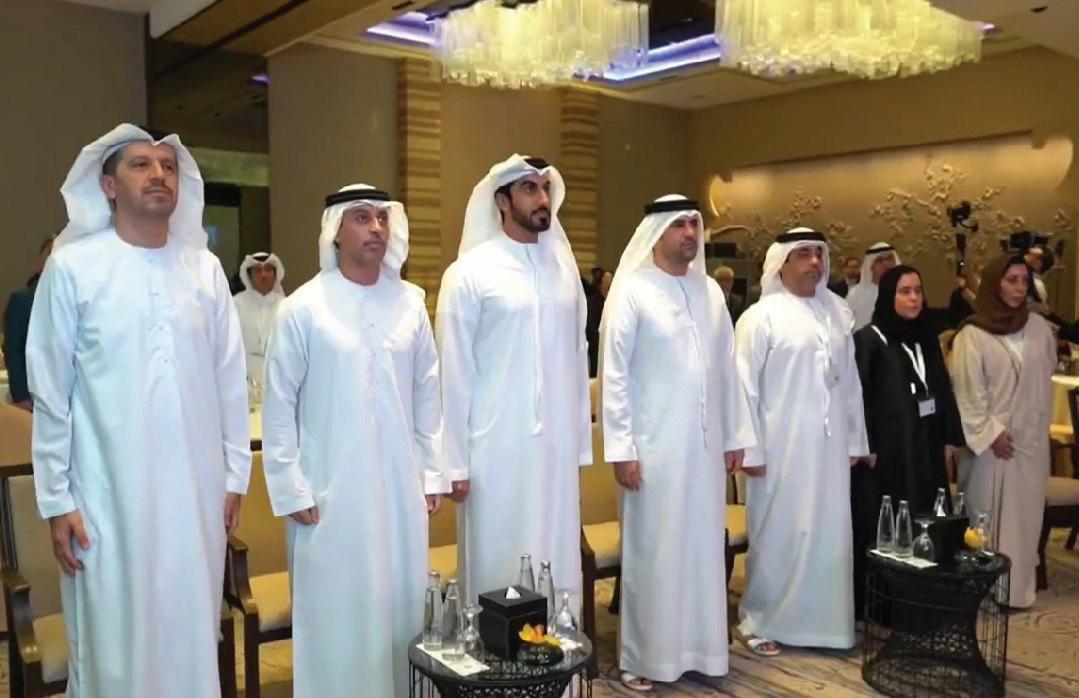
Khalifa University, in partnership with KnowledgeE Foundation, UAE Ministry of Education, UAE Ministry of Culture and Youth, and UNESCO, organized the 2nd Annual Forum for Open Research in MENA (2023) in Abu Dhabi. The Annual Forum of carefully tailored presentations and panels addressed key themes and topics related to the advancement of Open Science policies and practices in research institutions and research communities throughout the Arab world.
Khalifa University was the host partner for the event which gathered researchers, policy makers, higher-education institutions, publishers, and solutions-providers under the conference theme of ‘Democratizing Knowledge: The evolution of open science ecosystems and communities in the Arab World.’ His Excellency Mubarak Al Nakhi, Undersecretary, UAE Ministry of Culture and Youth and Vice-Chairperson, UAE National Commission for Education, Culture, and Science took part in the 2nd Annual Forum.
MARK YOUR CALENDAR KU TIMES 73
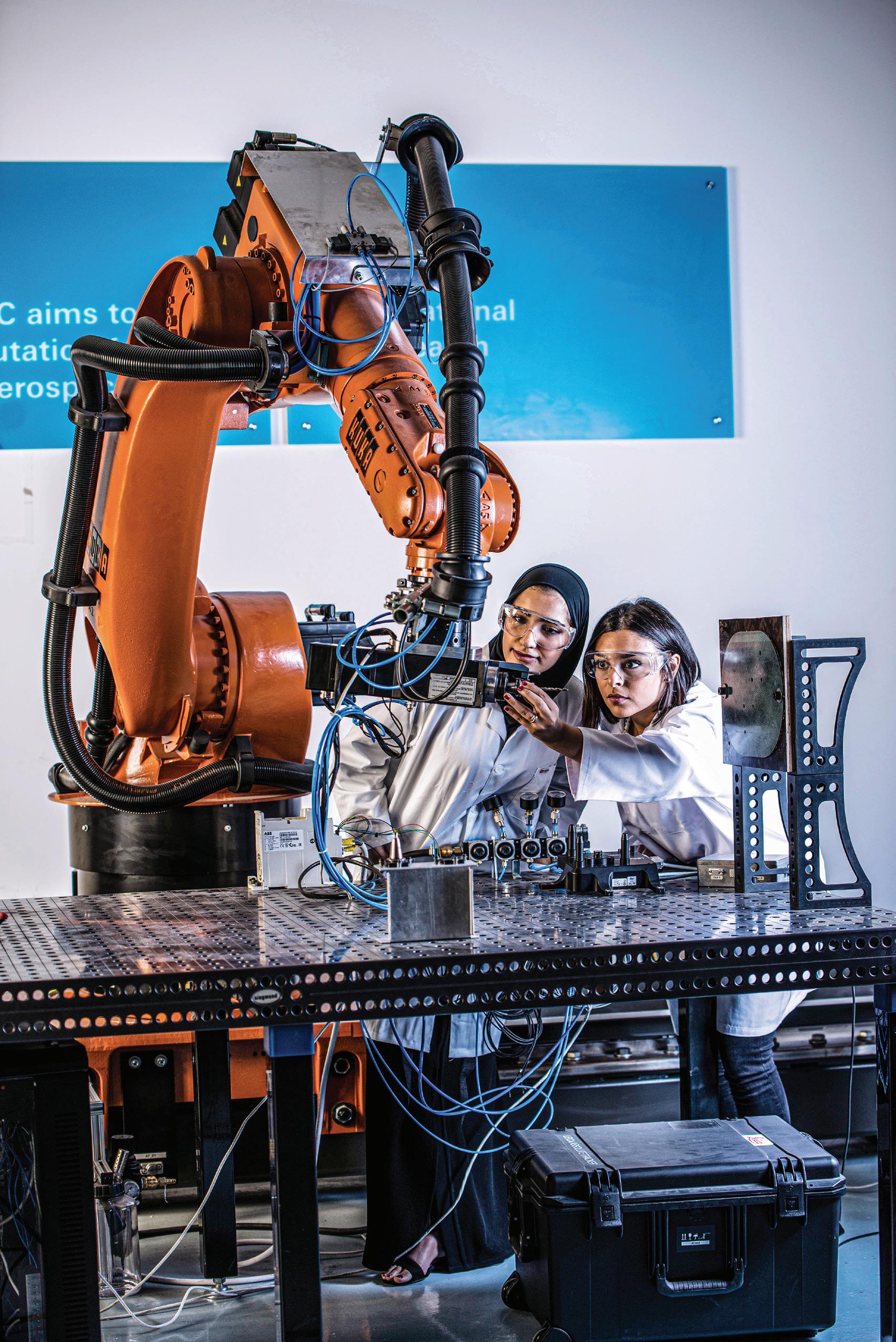


COLLEGE OF ENGINEERING AND PHYSICAL SCIENCES
COLLEGE OF ENGINEERING AND PHYSICAL SCIENCES
LEADER IN RESEARCH
LEADER IN RESEARCH

COLLEGE OF COMPUTING AND MATHEMATICAL SCIENCES
COLLEGE OF COMPUTING AND MATHEMATICAL SCIENCES
COLLEGE OF MEDICINE & HEALTH SCIENCE
COLLEGE OF MEDICINE & HEALTH SCIENCE
The highly-ranked Khalifa University o ers fully accredited degrees to all nationalities through its 3 academic colleges, 15 Bachelor’s, 23 Master’s and 6 PhD programs, o ering plenty of opportunities for students to explore their interests and learn from award-winning teachers.
The highly-ranked Khalifa University o ers fully accredited degrees to all nationalities through its 3 academic colleges, 15 Bachelor’s, 23 Master’s and 6 PhD programs, o ering plenty of opportunities for students to explore their interests and learn from award-winning teachers.
As Abu Dhabi’s research-intensive university, Khalifa University gives students a chance to study in-depth with expert faculty and researchers on the leading-edge of discovery in science, engineering, and medicine to solve real-world problems. Our students help develop cleaner energy, find new ways to produce water sustainably, create smarter diagnostic tools, and discover better ways to use AI to make data insightful.
As Abu Dhabi’s research-intensive university, Khalifa University gives students a chance to study in-depth with expert faculty and researchers on the leading-edge of discovery in science, engineering, and medicine to solve real-world problems. Our students help develop cleaner energy, find new ways to produce water sustainably, create smarter diagnostic tools, and discover better ways to use AI to make data insightful.
Study beside our award-winning faculty and help deliver real solutions, transform lives, and change the world.
Study beside our award-winning faculty and help deliver real solutions, transform lives, and change the world.
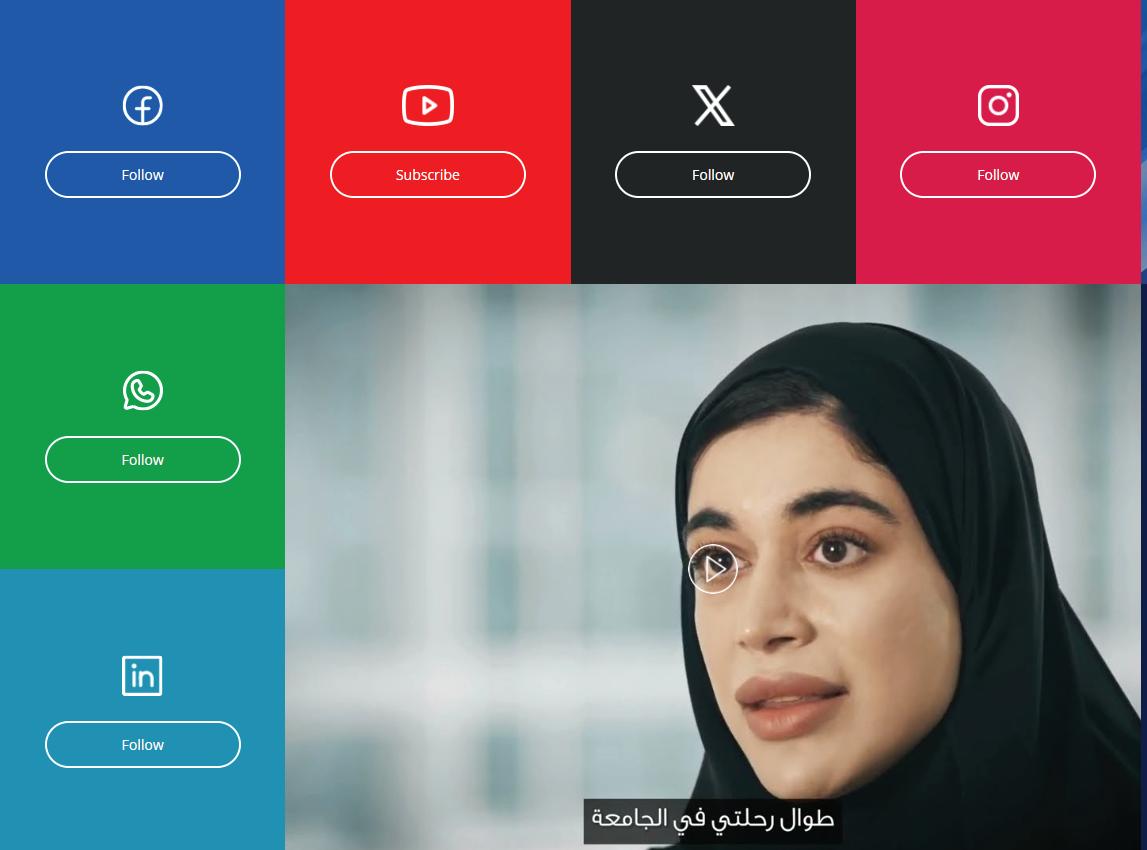

MARK YOUR CALENDAR 74 KU TIMES
Connect with us www.ku.ac.ae/social
Connect with us www.ku.ac.ae/social






















































 The visit by the Expedition 69 team marked a momentous occasion for space enthusiasts and the Khalifa University community.
Emirati Astronaut Dr. Sultan Al Neyadi and his Expedition 69 colleagues toured the campus.
Khalifa University Main Campus celebrates the homecoming of Emirati Astronaut Dr. Sultan Al Neyadi.
The visit by the Expedition 69 team marked a momentous occasion for space enthusiasts and the Khalifa University community.
Emirati Astronaut Dr. Sultan Al Neyadi and his Expedition 69 colleagues toured the campus.
Khalifa University Main Campus celebrates the homecoming of Emirati Astronaut Dr. Sultan Al Neyadi.





















 The unique Ocean One robot in Khalifa University’s Marine Studies and Research Lab’s pool
The robot, controlled by a team on the surface, collects plastic bottles from mock coral reefs placed in a pool.
Ocean One’s robotic arm retrieves plastic from a mock coral reef placed inside the pool.
The unique Ocean One robot in Khalifa University’s Marine Studies and Research Lab’s pool
The robot, controlled by a team on the surface, collects plastic bottles from mock coral reefs placed in a pool.
Ocean One’s robotic arm retrieves plastic from a mock coral reef placed inside the pool.











 His Excellency Mansoor Almansoori, Chairman, Department of Health – Abu Dhabi giving a speech at the conference at Khalifa University.
Inauguration of the Clinical Genomic Medicine and Genetic Counseling program at the Main Campus
Khalifa University faculty share their insights during a panel discussion
His Excellency Mansoor Almansoori, Chairman, Department of Health – Abu Dhabi giving a speech at the conference at Khalifa University.
Inauguration of the Clinical Genomic Medicine and Genetic Counseling program at the Main Campus
Khalifa University faculty share their insights during a panel discussion



















































































